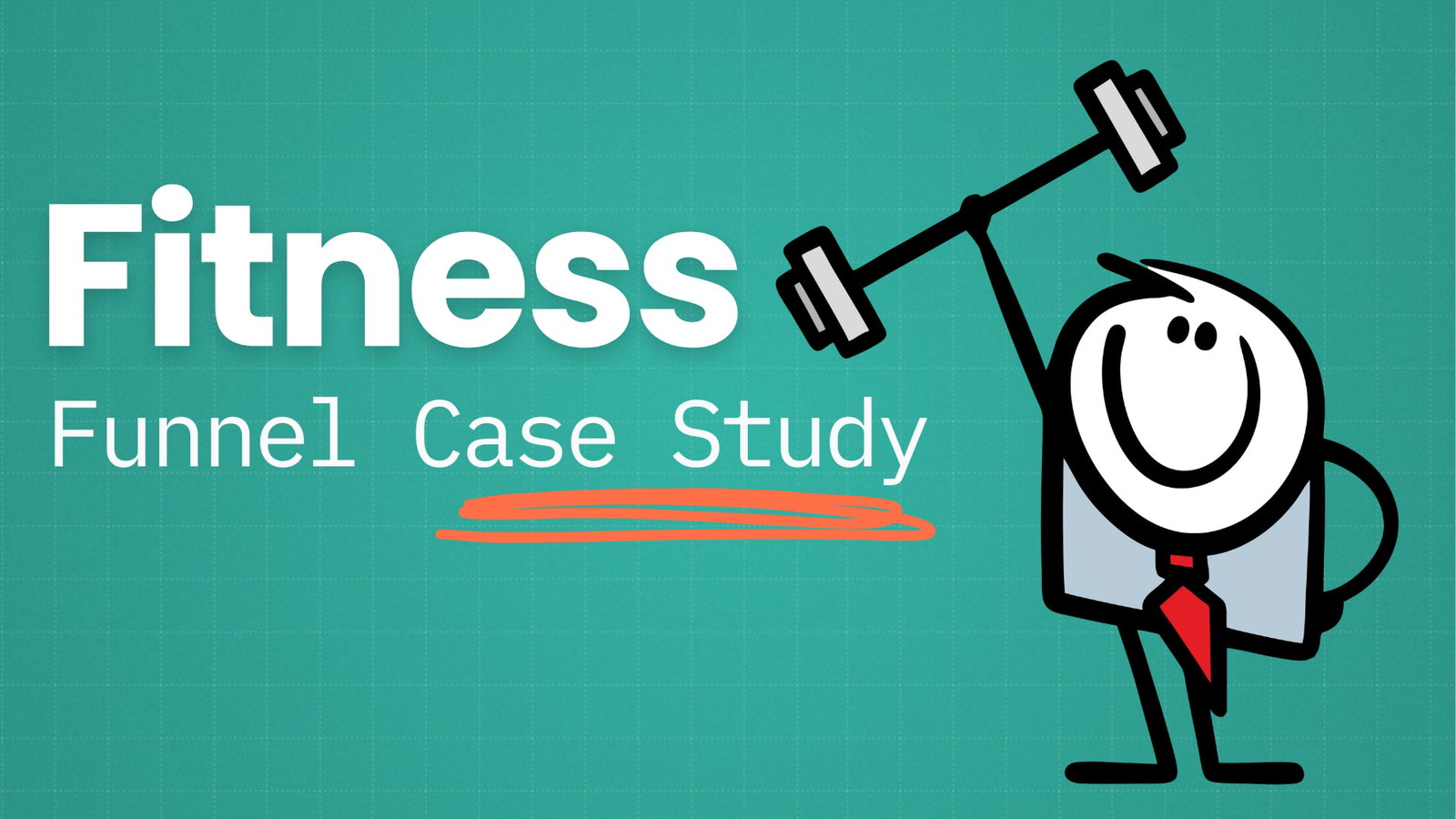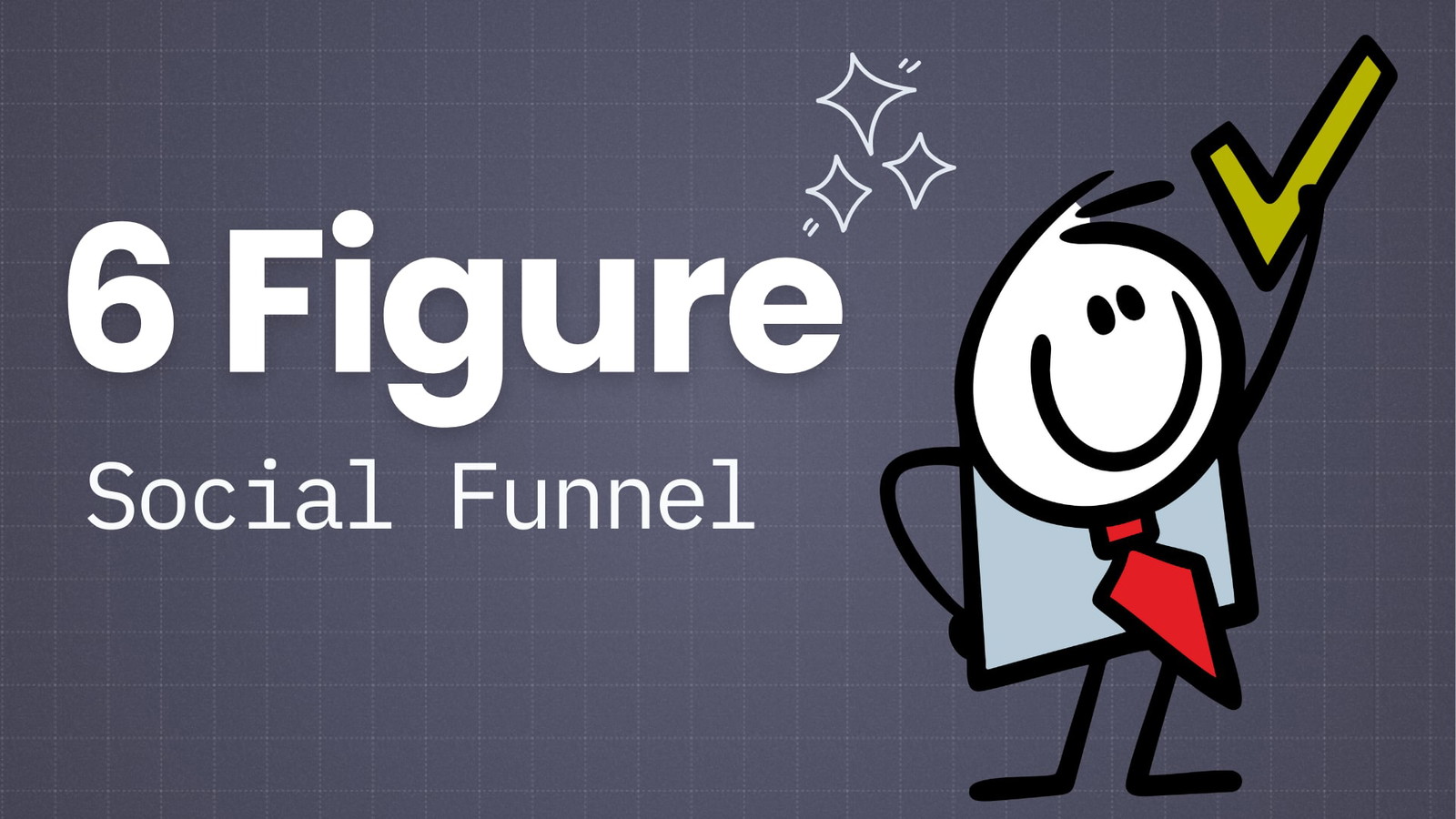Looking for travel blog examples to inspire your own blog strategy and design?
We’ve collected 15 of the most interesting, beautiful, and successful travel blogs to showcase how each is finding success — and how you can emulate their best strategies on your own website.
15 Travel Blog Examples
Let’s take a look at some of the most intriguing and accomplished travel blogs out there.
- Indie Traveller: DIY travel
- The Hawaii Vacation Guide: Hawaii travel blog
- Travel Hacking Mom: Traveling using points
- Anywhere We Roam: Travel adventures
- Bucketlistly: Travel guides and backpacking itineraries
- The Blonde Abroad: Solo female travel
- Salt In Our Hair: Travel photography
- The Planet D: General travel
- Expert Vagabond: Nomadic travel and photography
- The Poor Traveler: Cheap travel tips
- The Broke Backpacker: Budget backpacking
- View From the Wing: Travel industry analysis
- Charlotte Plans a Trip: Personal travel blog
- The Barefoot Nomad: Family travel
- Nomadic Matt: Digital nomading
We list certain metrics for each travel blog example. Here are the tools we used to find these:
- Estimated monthly visits and Domain Rating (DR): Ahrefs
- Content Management System (CMS): Wappalyzer
- WordPress theme: WhatWPThemeIsThat.com
1 Indie Traveller
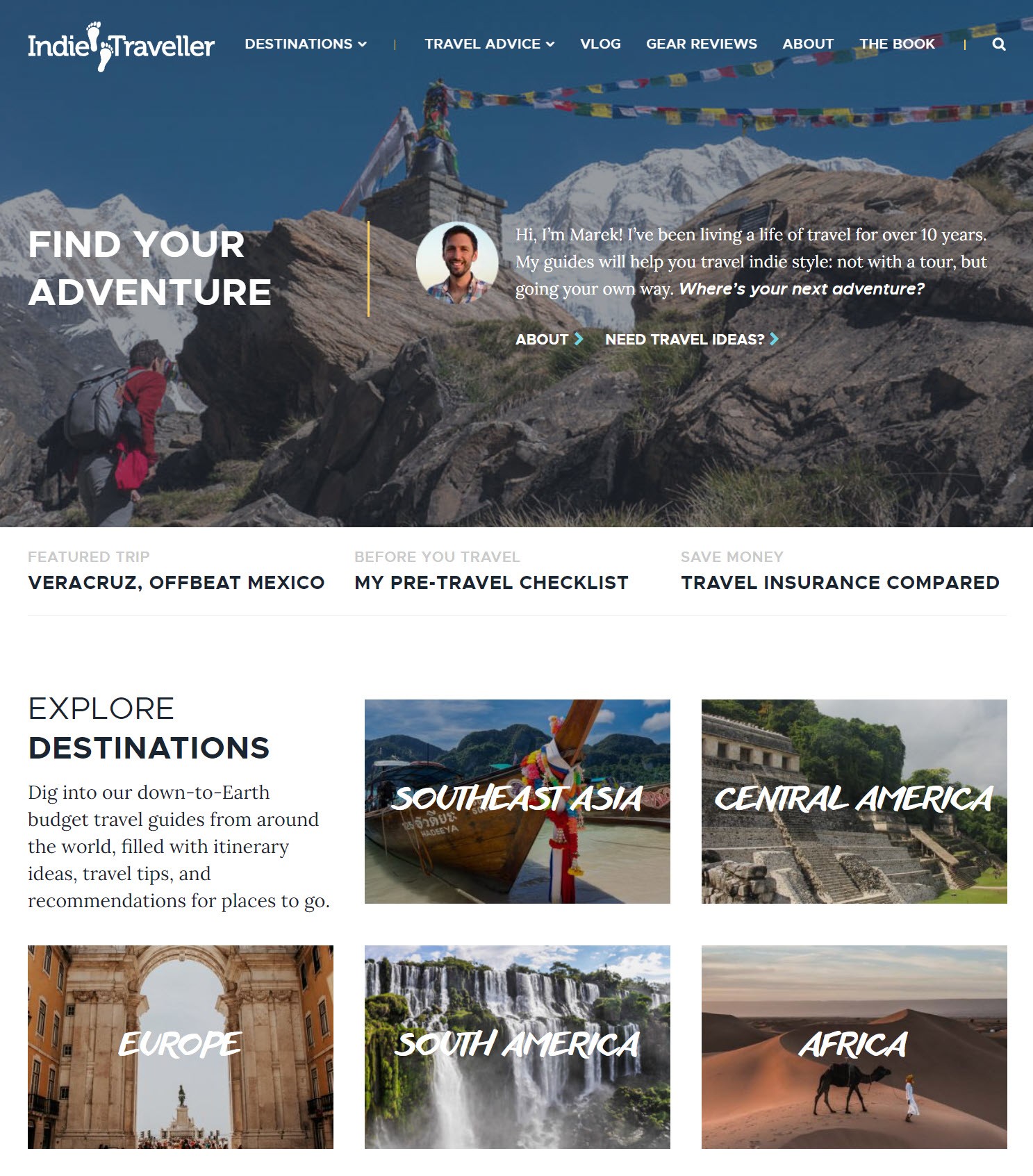
📈 Traffic: 75k monthly visits
💪 DR: 52
⚙️ CMS: WordPress
🎨 Theme: Custom
About
Indie Traveller, launched by Marek Bron in 2012 after leaving his video game development job, is a user-friendly travel blog.
It provides practical destination guides, travel advice, and gear reviews, all inspired by Marek’s own two-year adventure, which started with a life-changing trip to Thailand.
What Indie Traveller Does Well
Marek reviews travel bags exceptionally well (it’s not an easy task ).
Here are two things you can take away from his approach to implement on your site:
He buys the backpacks. Readers and Google know when you don’t have experience with a product. They won’t trust your reviews, and you’ll get lower rankings and earnings.
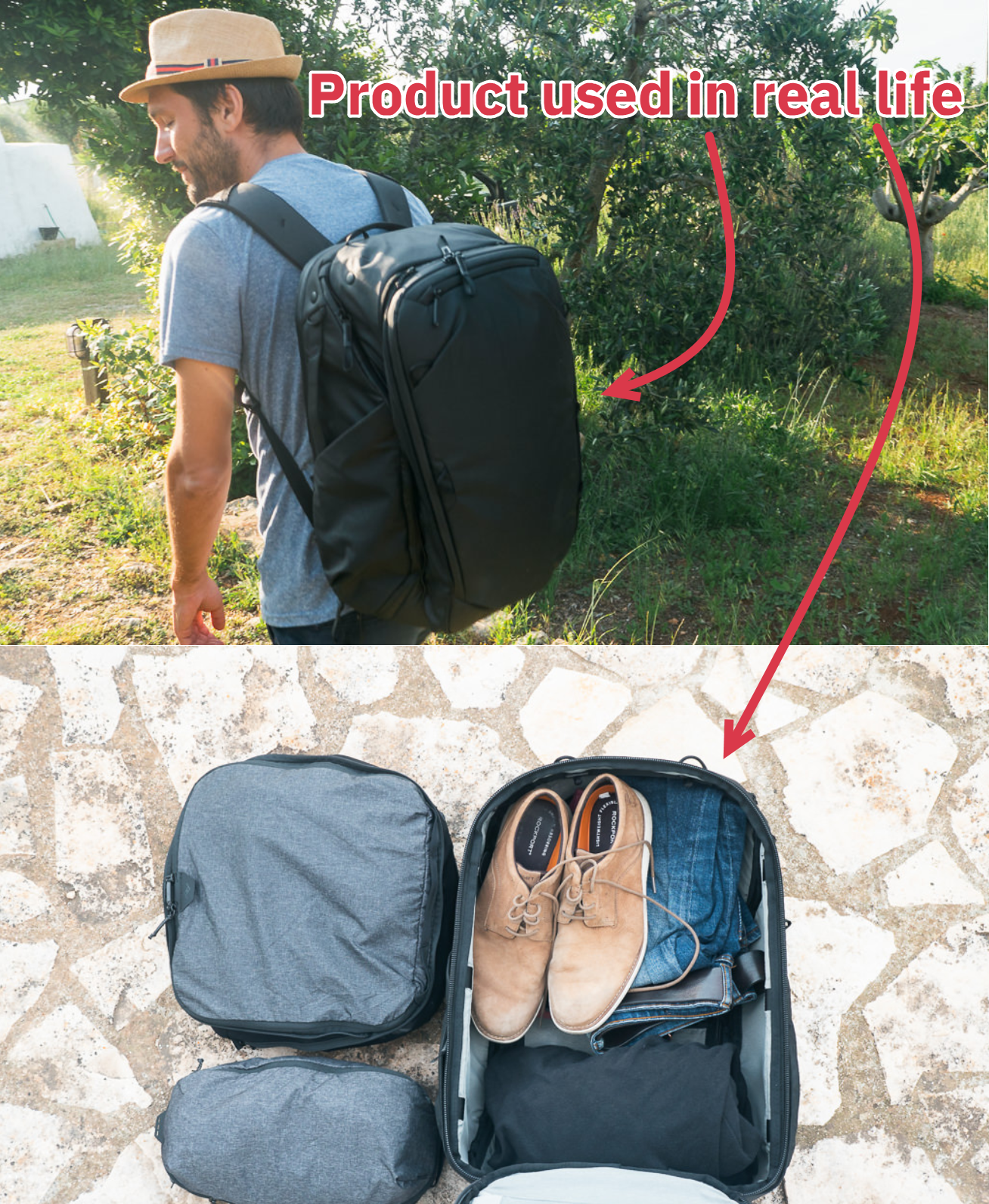
He uses product feature boxes. A product feature box shares pros and cons. It also has a button with an affiliate link users can click to buy the product.
Here’s an example of a product feature box on Indie Traveller:
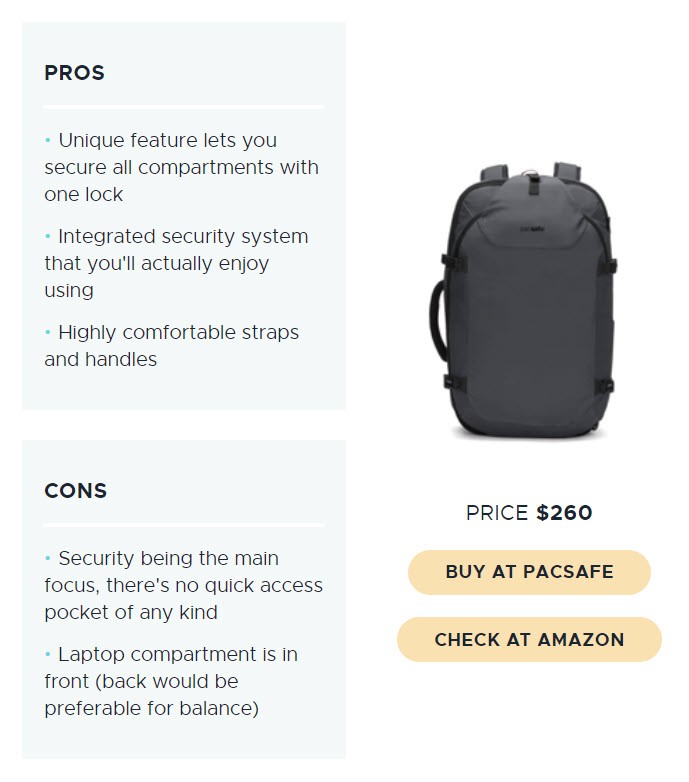
You can create similar boxes with the free GenerateBlocks plugin.
Published book: Travel The World Without Worries
Travel booking affiliate programs: Kiwi, Agoda, 12Go, HostelWorld
Travel insurance affiliate programs: Heymondo, SafetyWing
Beyond the Blog
Marek sends out a monthly newsletter where he shares updates on his adventures, inspirational messages, and travel advice.
2 The Hawaii Vacation Guide
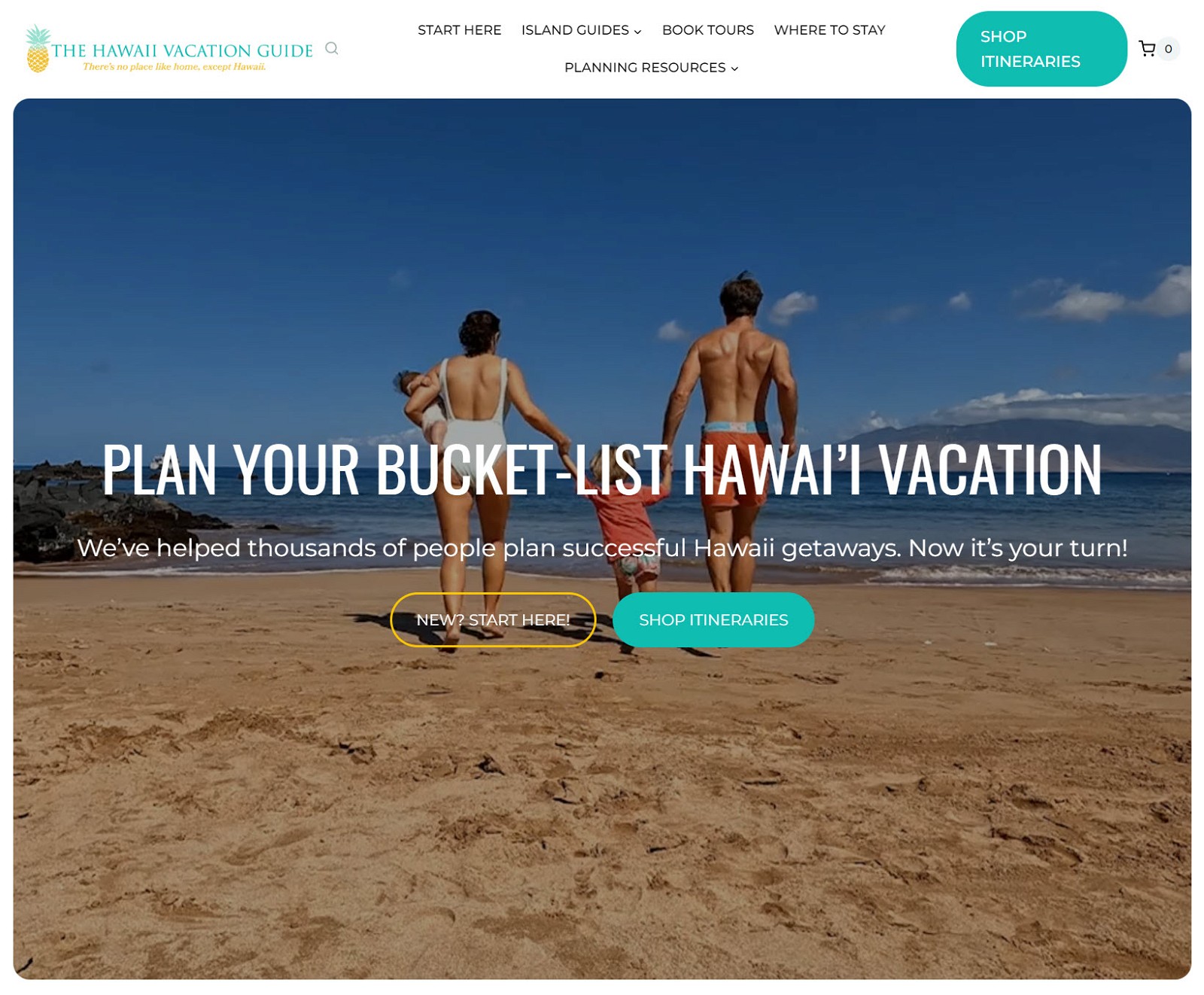
About
The Hawaii Vacation Guide is a travel blog about visiting Hawaii.
Created by Jordan and Erica Fromholz in 2019 after moving to Maui from London, this blog is a unique and authentic guide to exploring Hawaii’s beauty and culture.
What The Hawaii Vacation Guide Does Well
The Hawaii Vacation Guide is a terrific example of a travel blog focusing on a specific destination.
Here are a couple of ways they’ve used this to their advantage:
Created Hawaii-focused itineraries. Travel itineraries are a hot commodity, and they convert best when your entire audience is going to the same location.
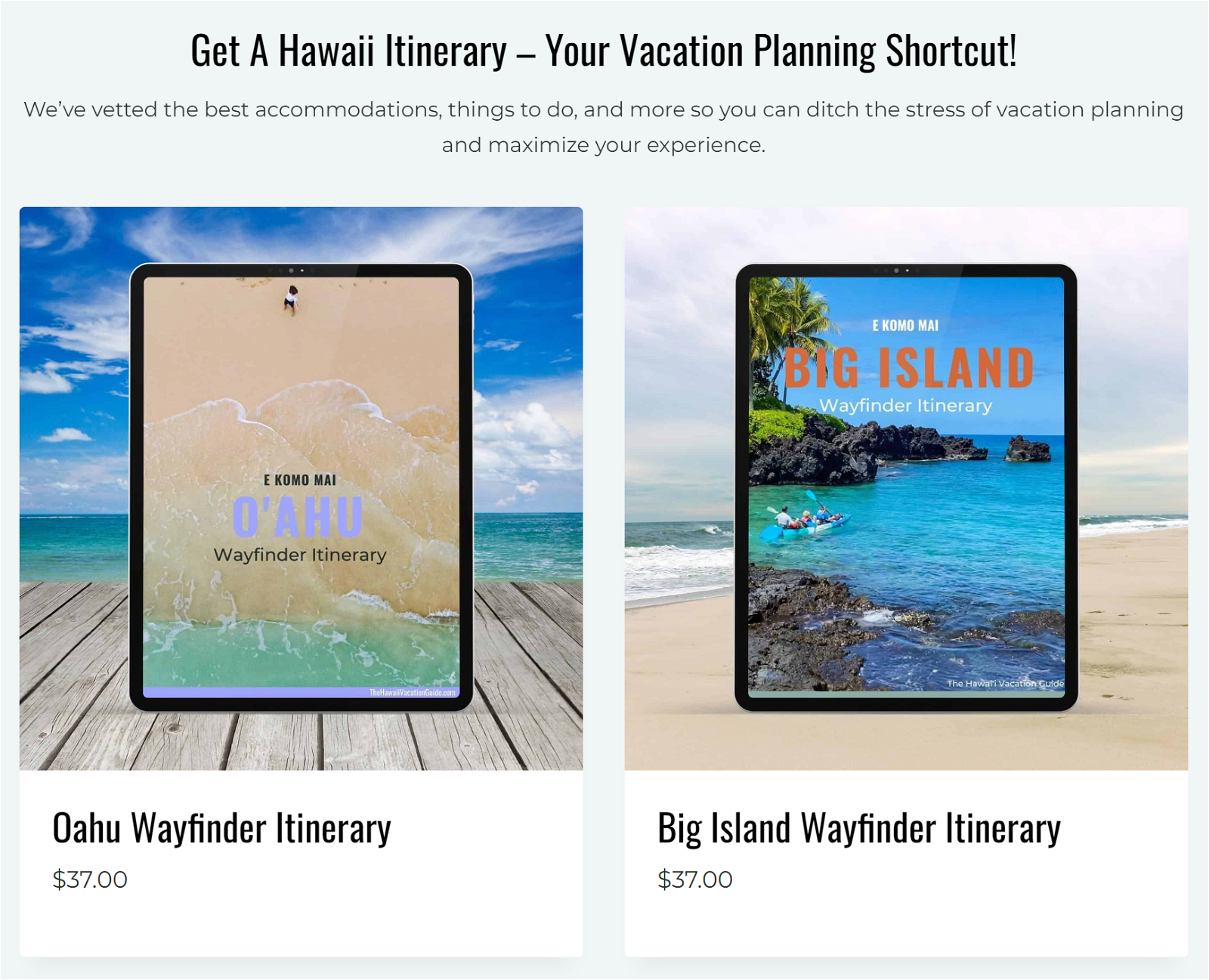
Became the go-to authority on Hawaii. When someone wants to learn about traveling to Hawaii, they visit The Hawaii Vacation Guide. For example, there are over 1.5k monthly searches for their website.
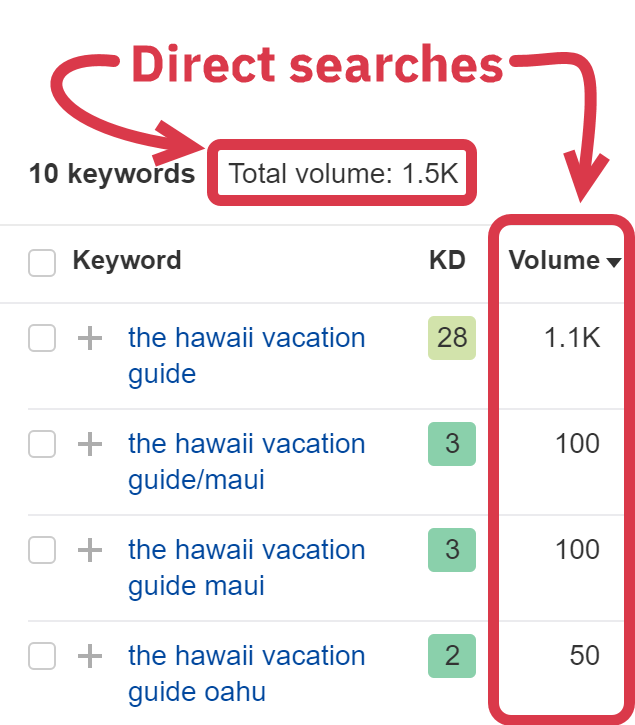
Beyond the Blog
Jordan and Erica have a YouTube channel with over 100,000 subscribers. They post frequent videos on all things Hawaii travel, including trip planning, itineraries, reviews, and much more.
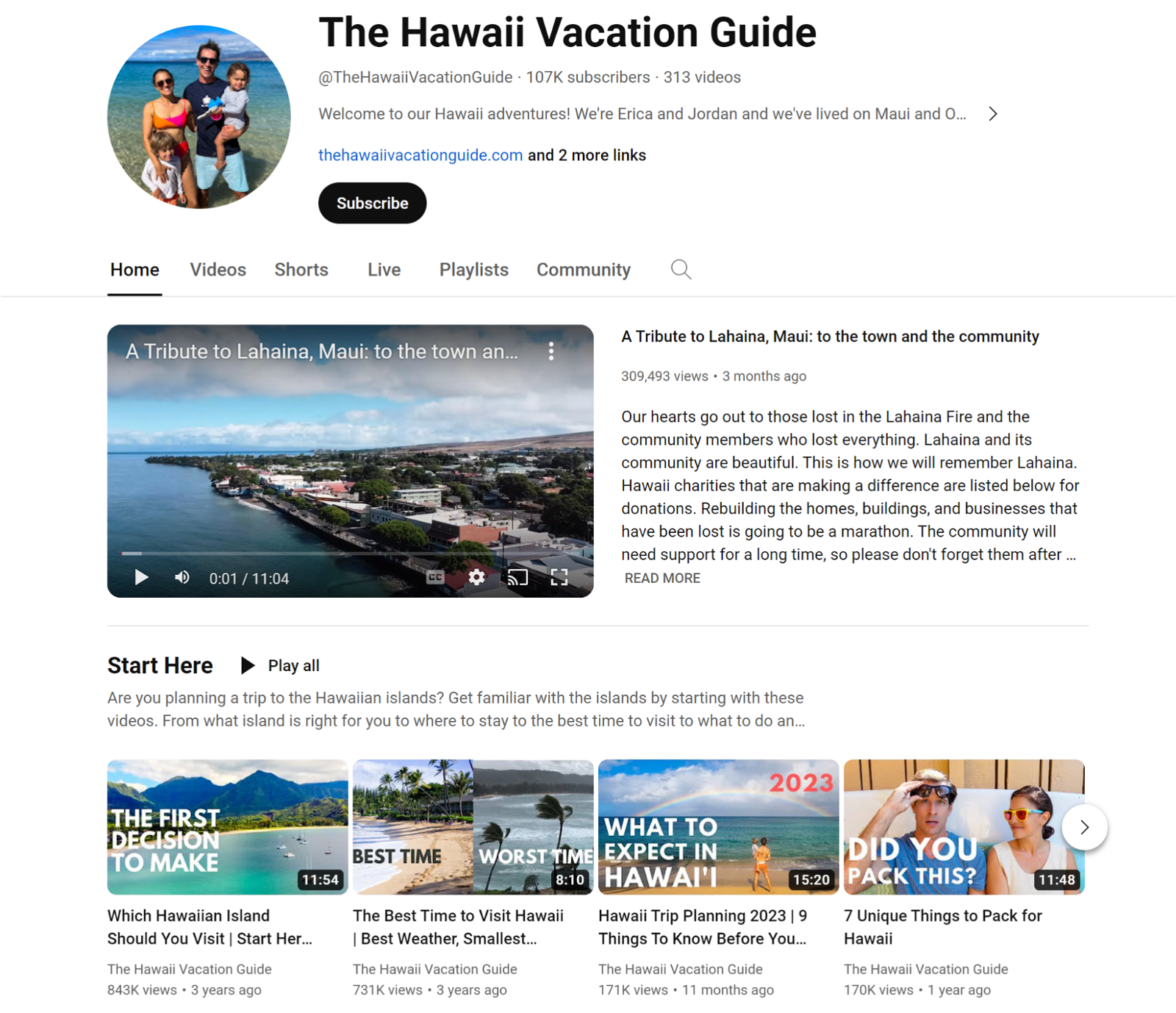
Activity affiliate programs: FareHarbor, GetYourGuide, Viator
Accommodation affiliate programs: Marriot, VRBO
Car rental affiliate programs: Discount Hawaii Car Rental
3 Travel Hacking Mom
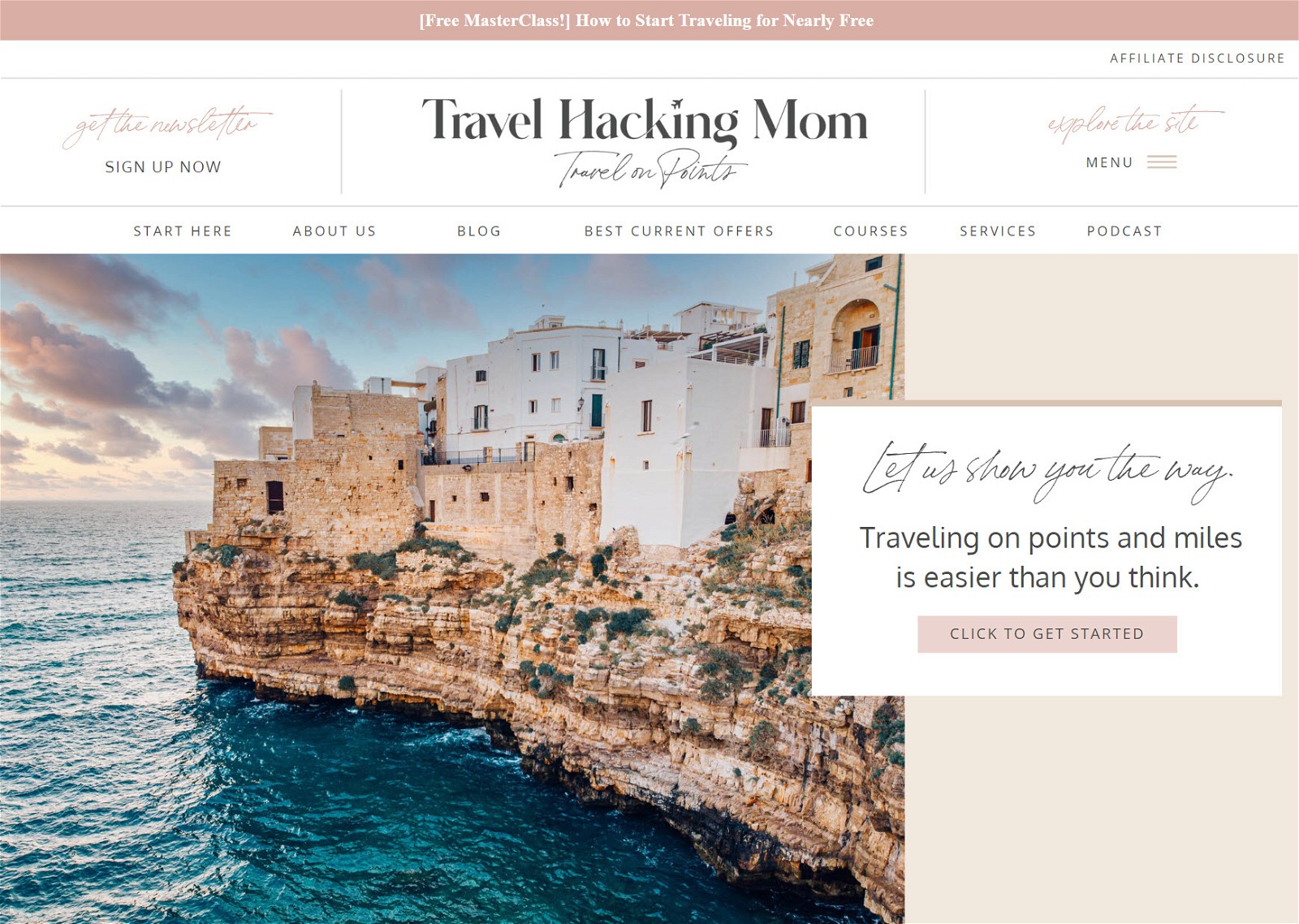
About
Travel Hacking Mom is a small travel blog by Alex, Pam, and Jess — a trio of moms who travel the world cheaply using credit card points and miles.
What Travel Hacking Mom Does Well
Despite only receiving 8,000 monthly visits, Travel Hacking Mom uses smart monetization strategies to maximize their earnings per visitor.
Narrow focus on high-value market. The site only covers using credit card points for travel, allowing them to capitalize on high-paying credit card affiliate products.
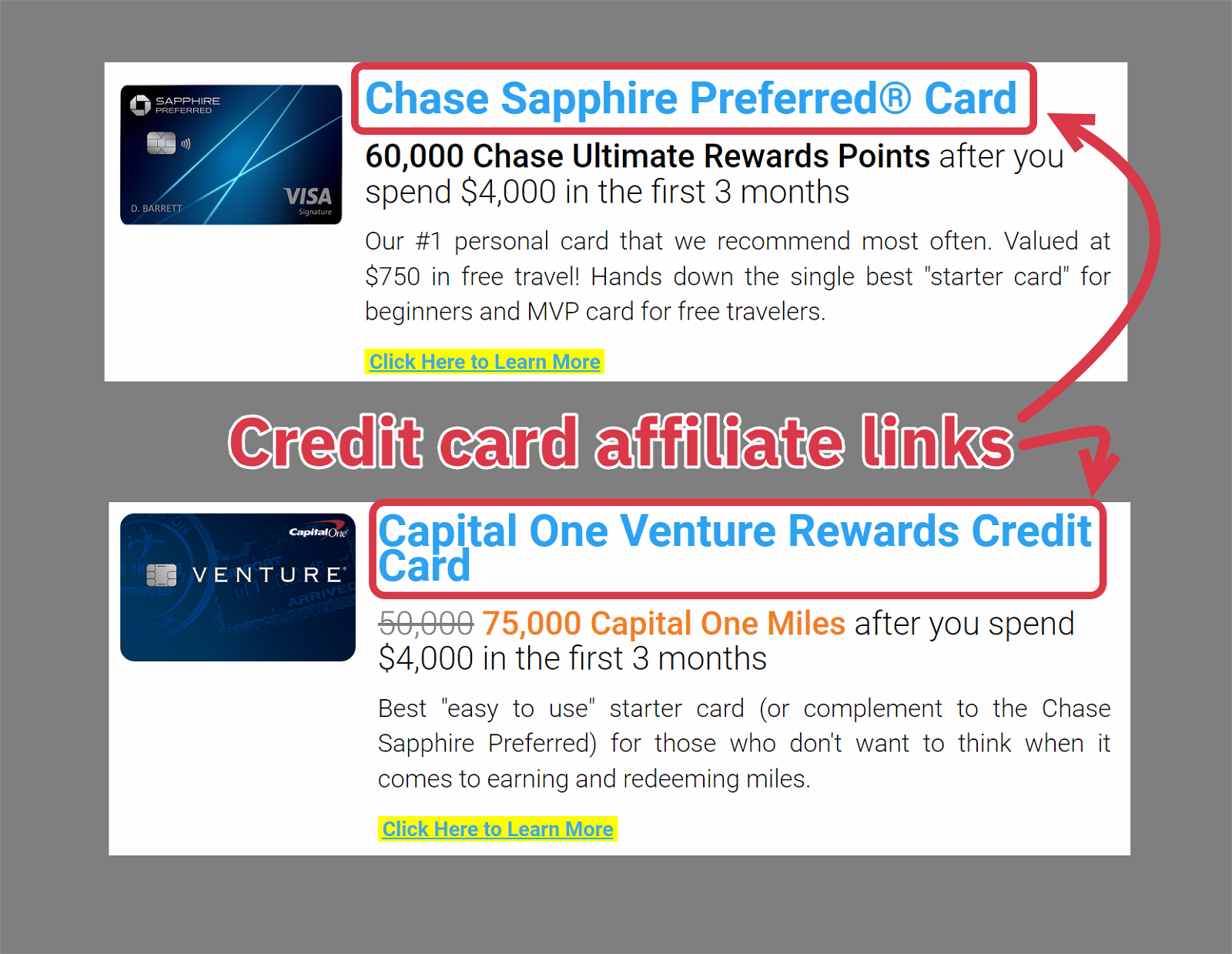
Travel hacking courses. They offer a pair of expensive courses that teach you how to travel hack.
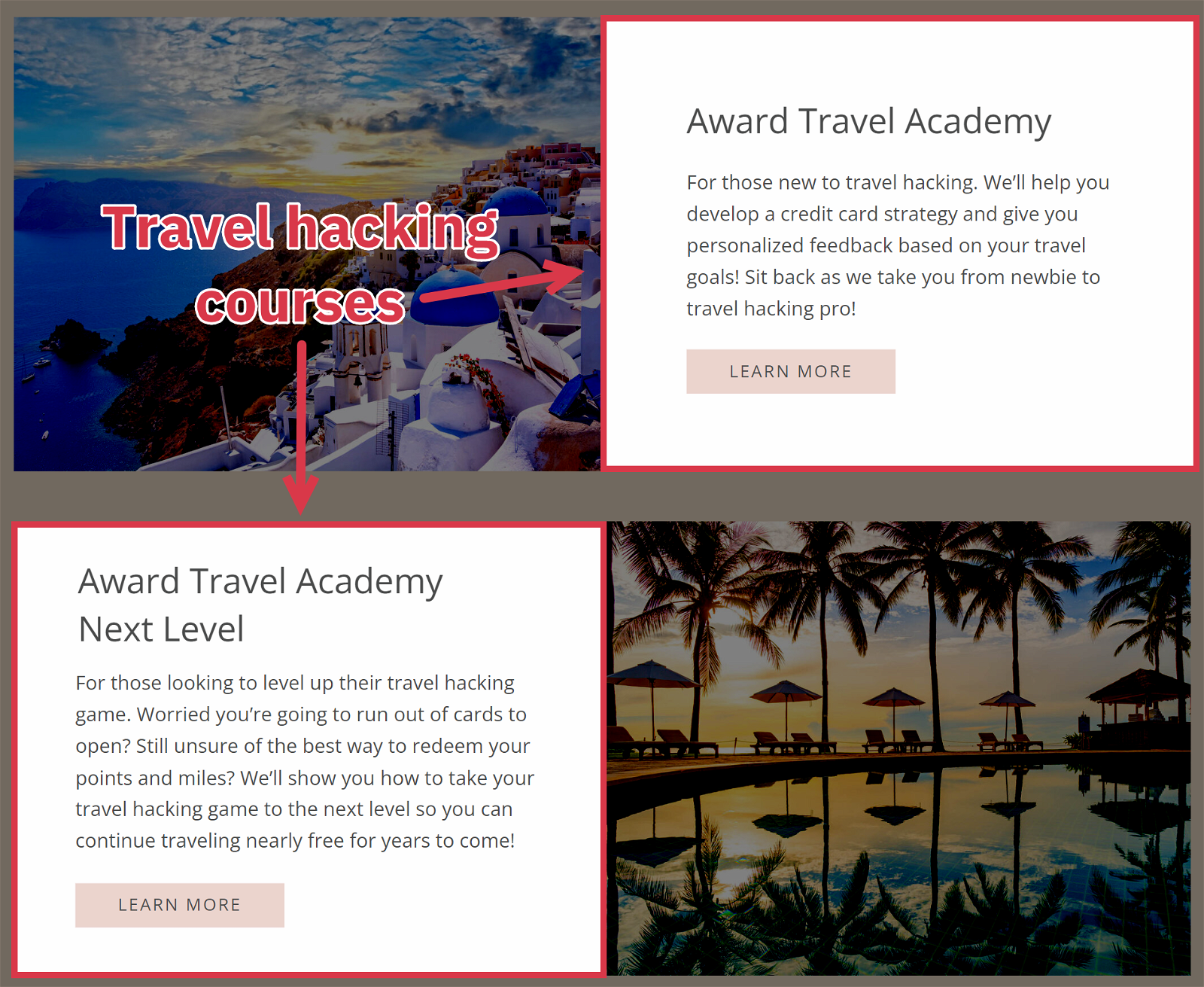
Consultations. They offer two types of consultations – a free one where they will try to sell you on a credit card, and a paid $99 strategy session for more general questions.
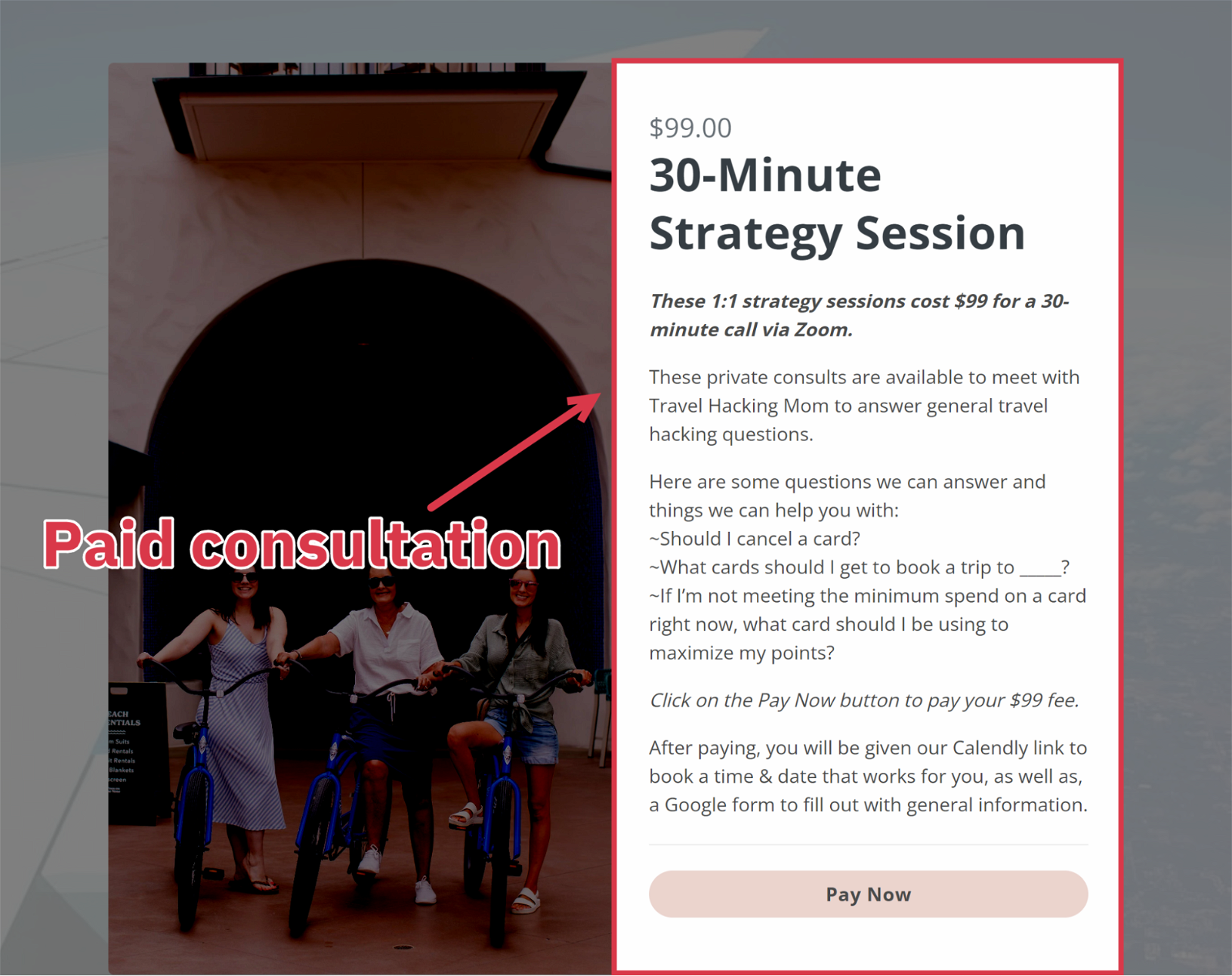
Between credit card affiliate commissions, course sales, and consultations, a single visitor could earn more than $1,000.
Beyond the Blog
Alex, Pam, and Jess host The Travel Hacking Mom Show – a podcast that covers the group’s latest adventures and travel hacking tips. This helps them connect with their audience and boosts sales potential.
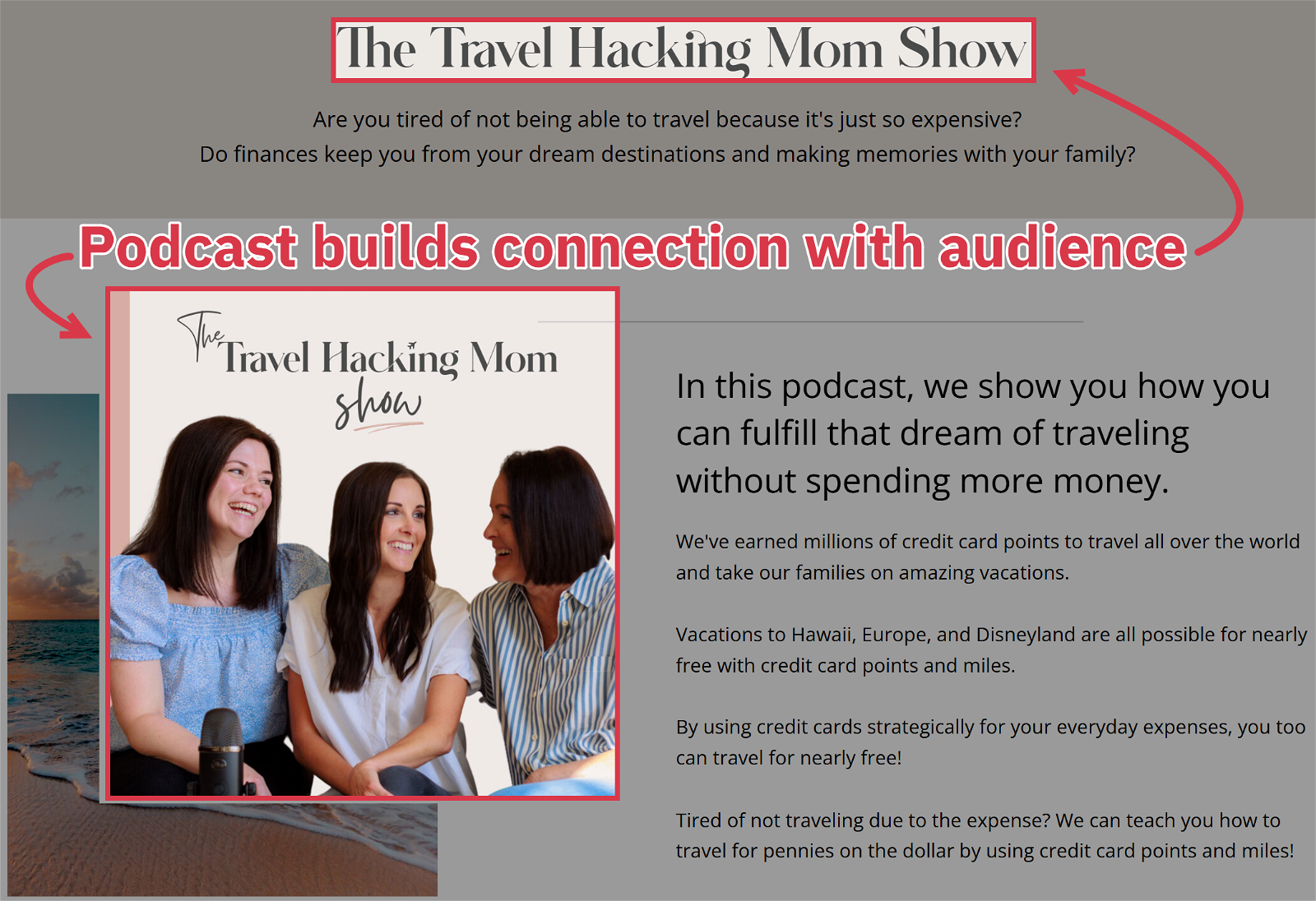
4 Anywhere We Roam
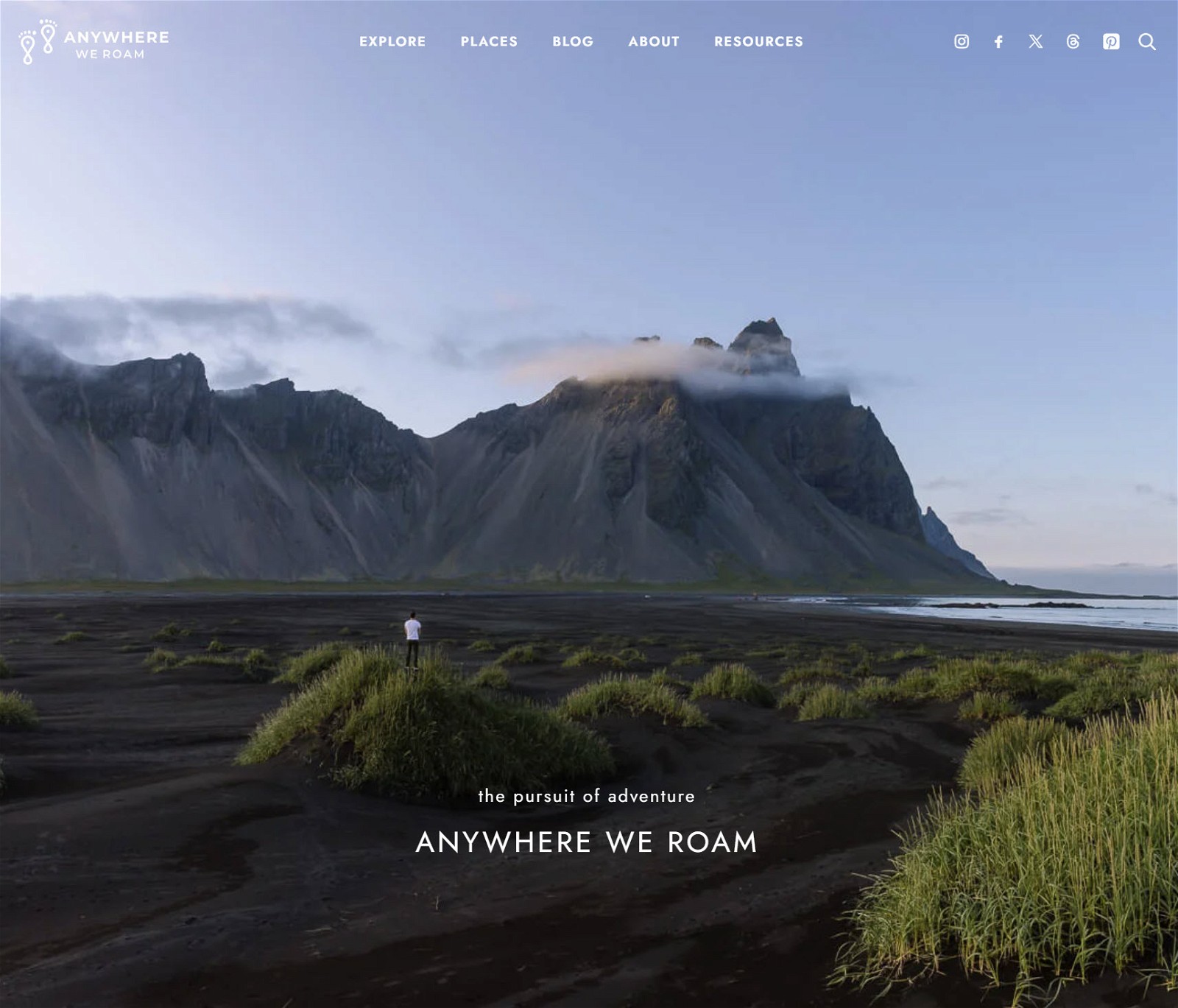
About
Anywhere We Roam is a travel blog that follows the journey of Paul Healy and Mark Barnes, who started this site in 2018 to escape their day jobs, find an outlet for their photography passions, and fund their love of travel.
What Anywhere We Roam Does Well
The minimalist design on Anywhere We Roam is award-winning, snagging the best Web Design / User Experience award at the 2021 Traverse Creator Awards and other coveted awards.
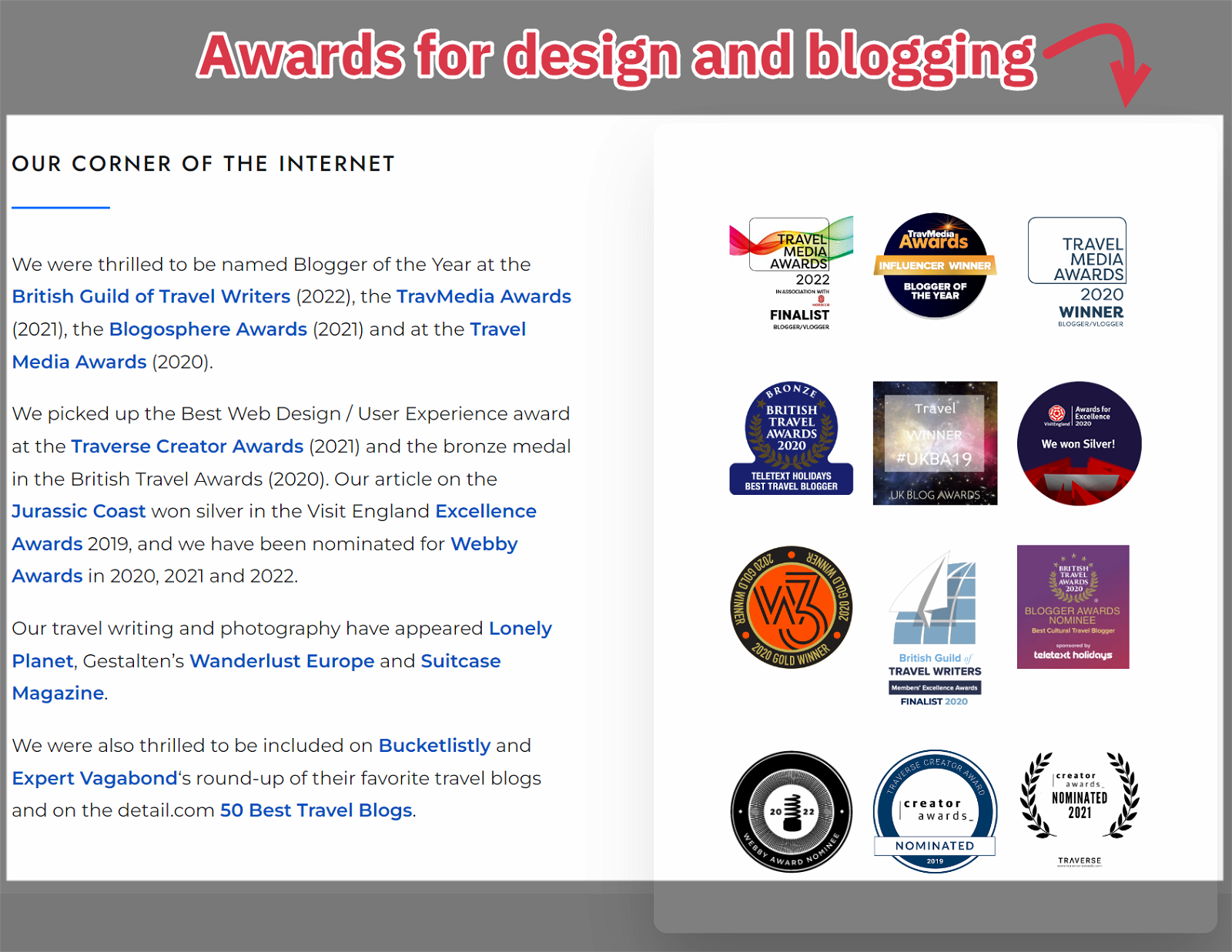
The color scheme and layout are minimal, with black, white, and blue accents coupling nicely with the spaced-out elements and palette-matching imagery.
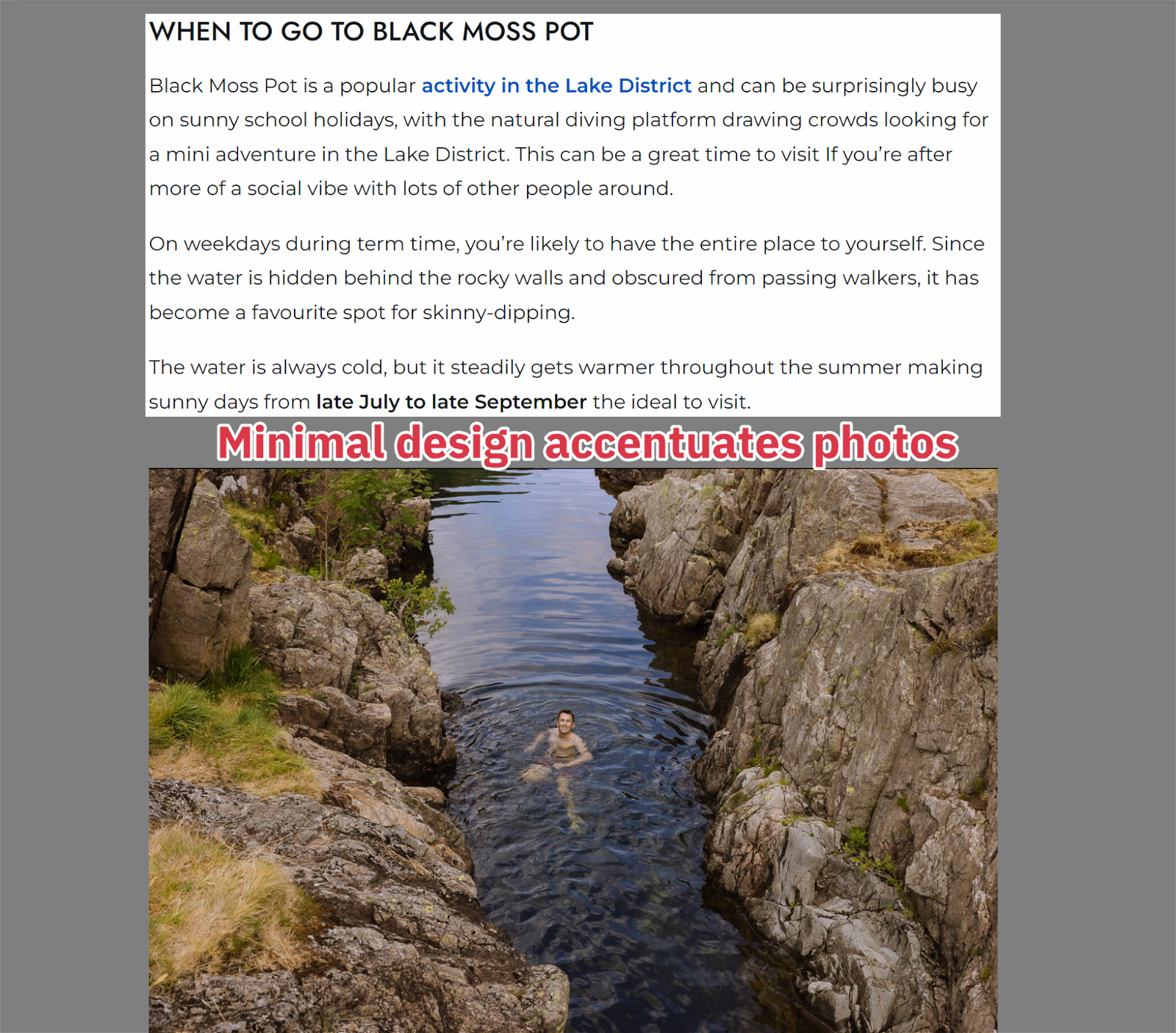
The minimalist approach spotlights Paul and Mark’s incredible photography and keep readers scrolling. Images are spaced just enough so the next comes into view as the previous one fades away.
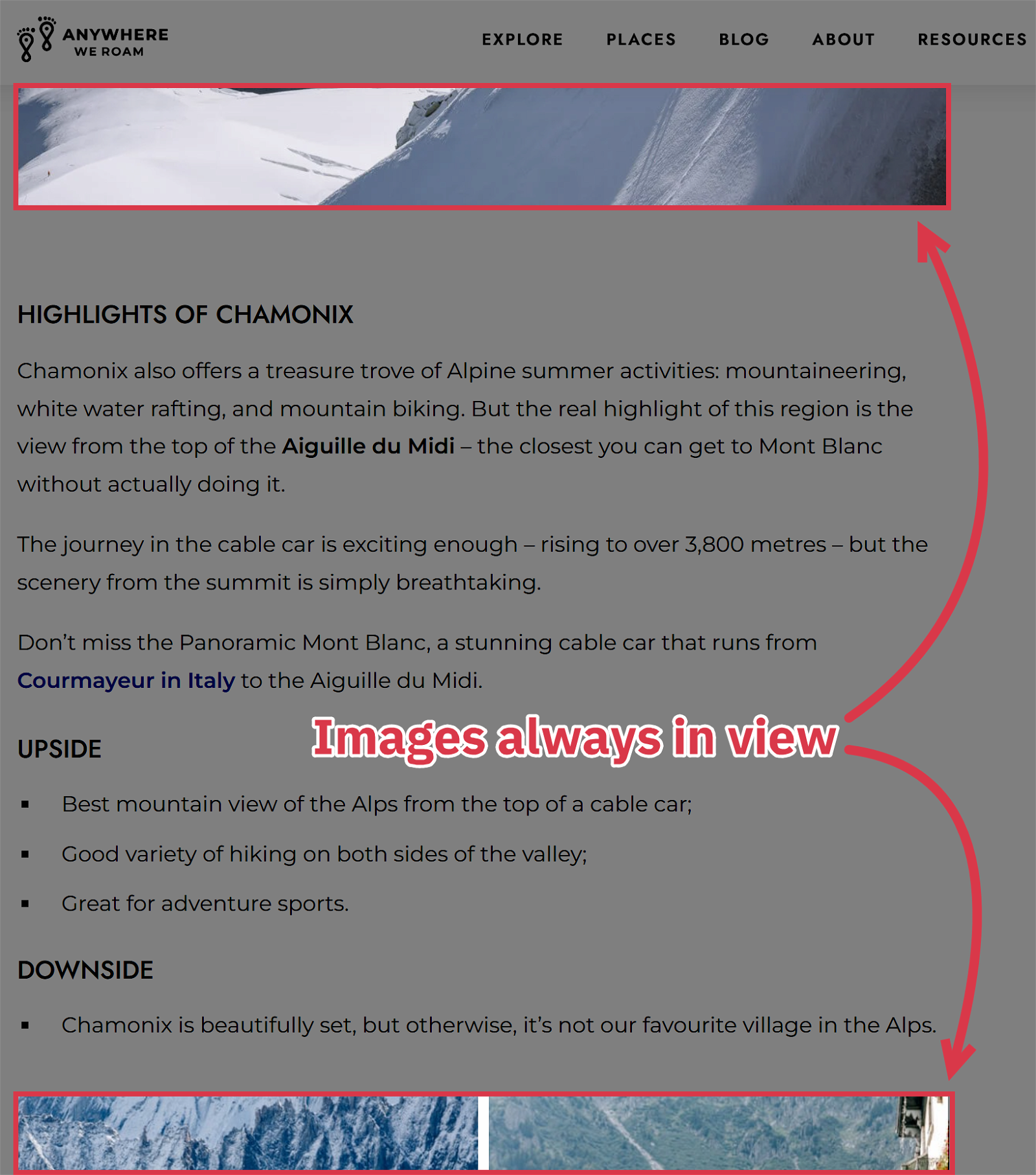
The full-screen image headers at the top of each page are also a nice touch, ensuring readers are met with a captivating photo every time they open a new page.
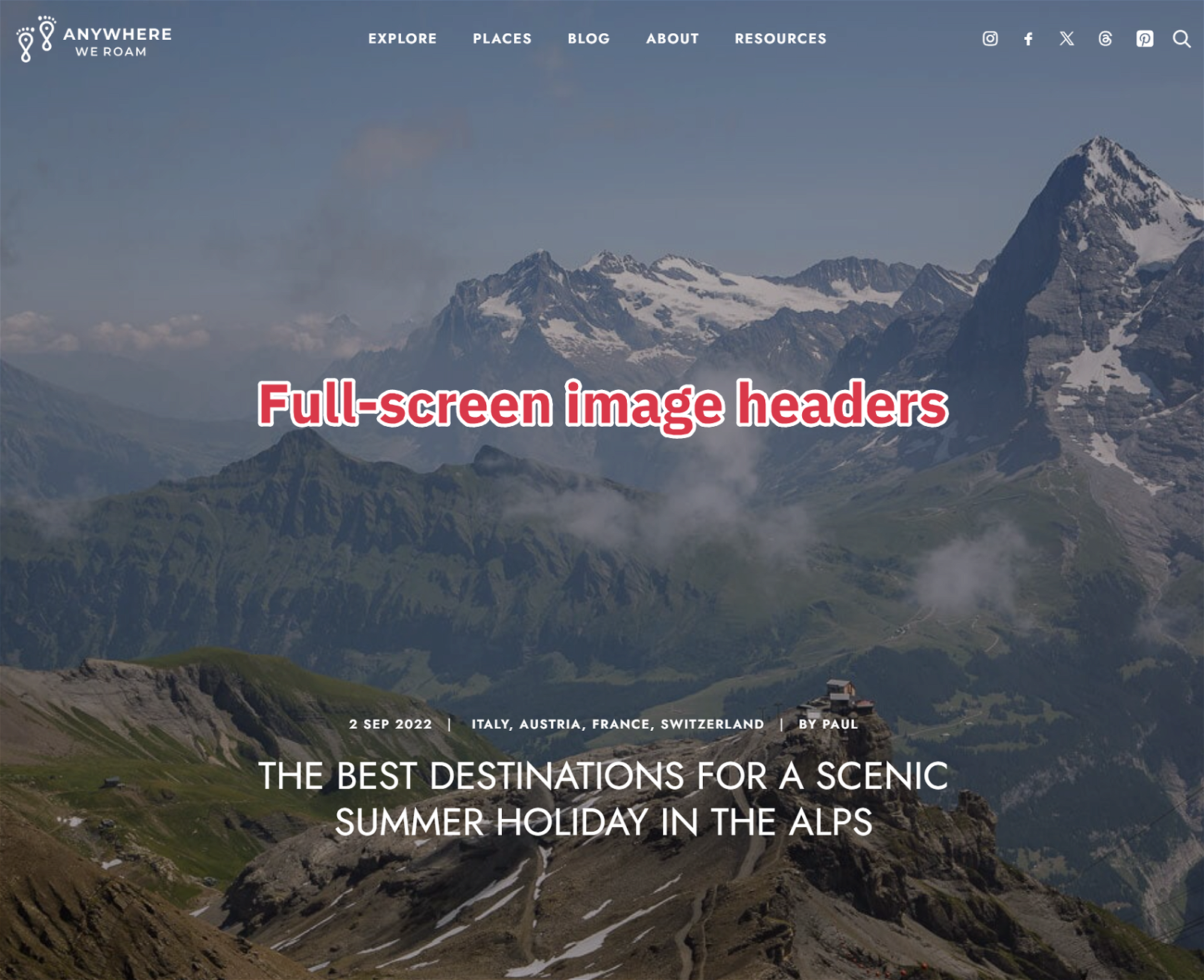
Flights & accommodation affiliate programs: Booking.com, Hotels.com, VRBO, Expedia, Flight Centre
Transport affiliate programs: Rentalcars.com, Trainline.com
Activity affiliate programs: GetYourGuide, TripAdvisor
Beyond the Blog
Paul and Mark share gorgeous reels and photographs on Instagram – many of which are related to recent blog posts.
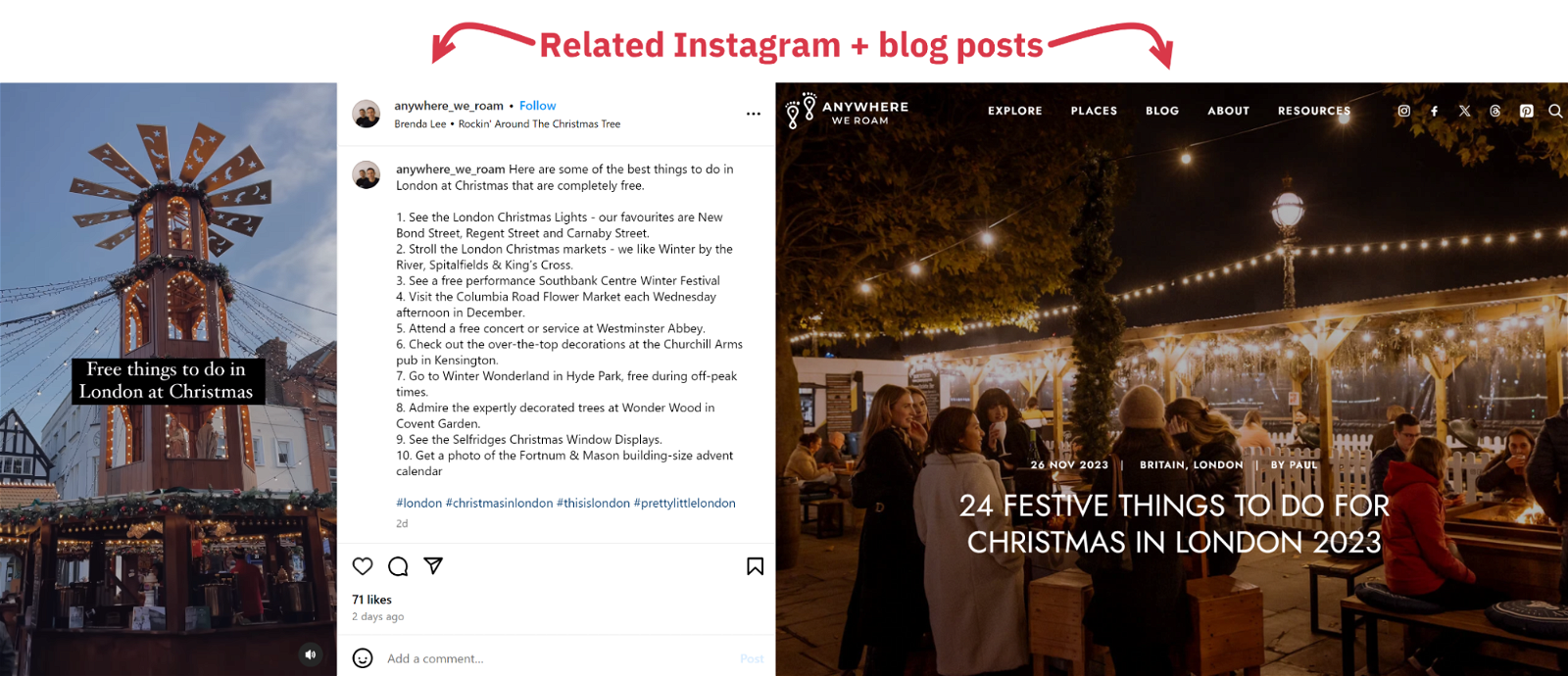
5 BucketListly
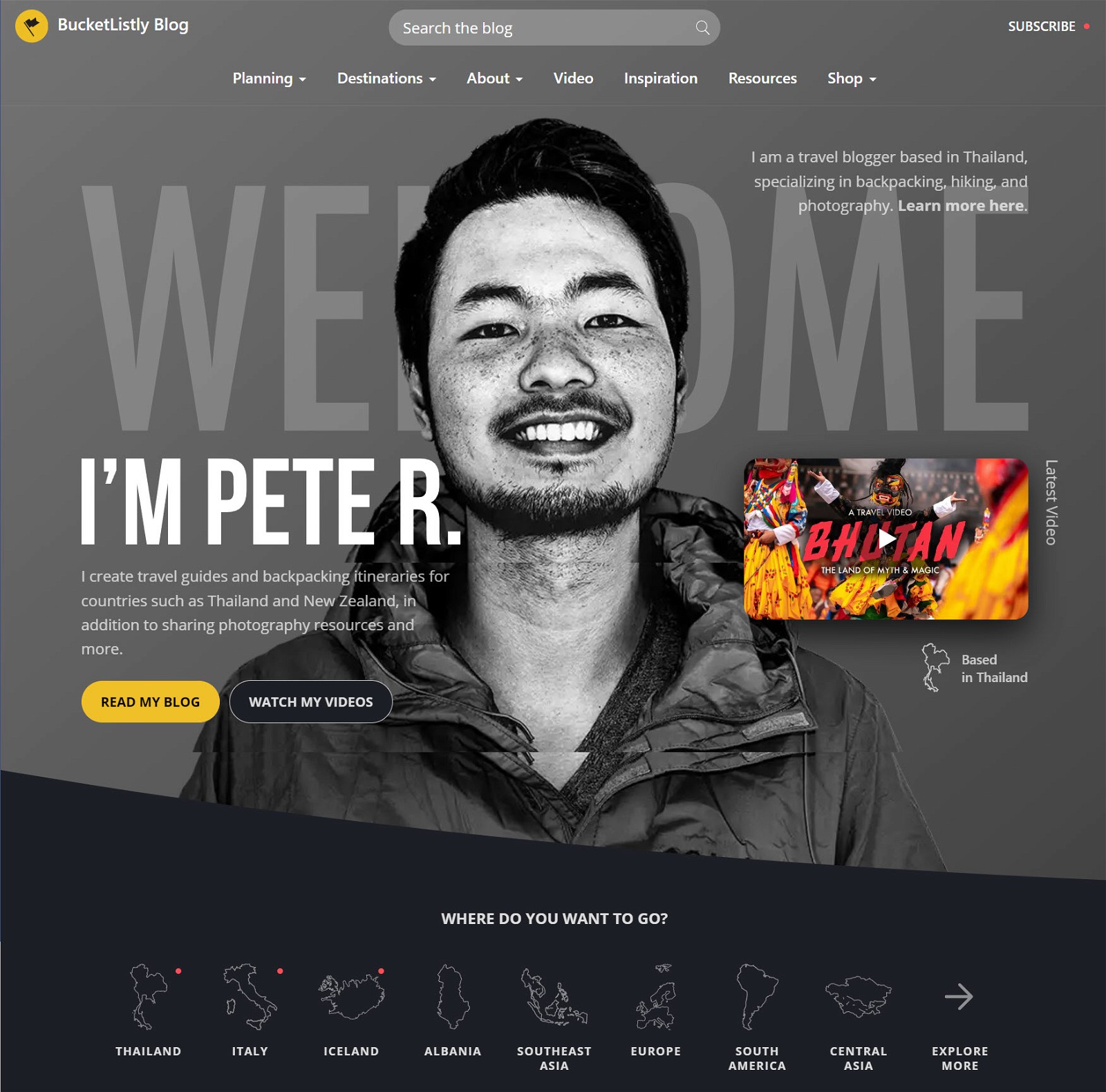
📈Traffic: 60k monthly visits
💪DR: 62
⚙️ CMS: LocomotiveCMS
🎨Theme: N/A
About
BucketListly is a travel blog specializing in travel guides, backpacking itineraries, and photography resources.
It was created in 2012 by Pete Rojwongsuriya, a web developer in Thailand who got fed up with his demanding corporate job. Pete has been traveling for 10+ years and has visited over 85 countries.
What Bucketlistly Does Well
Bucketlistly displays affiliate links in a sophisticated, conversion-boosting manner.
These links are interpolated into the destination guides – extremely detailed itineraries based on Pete’s travels. Each guide features extensive original photos and detailed commentary on each location.
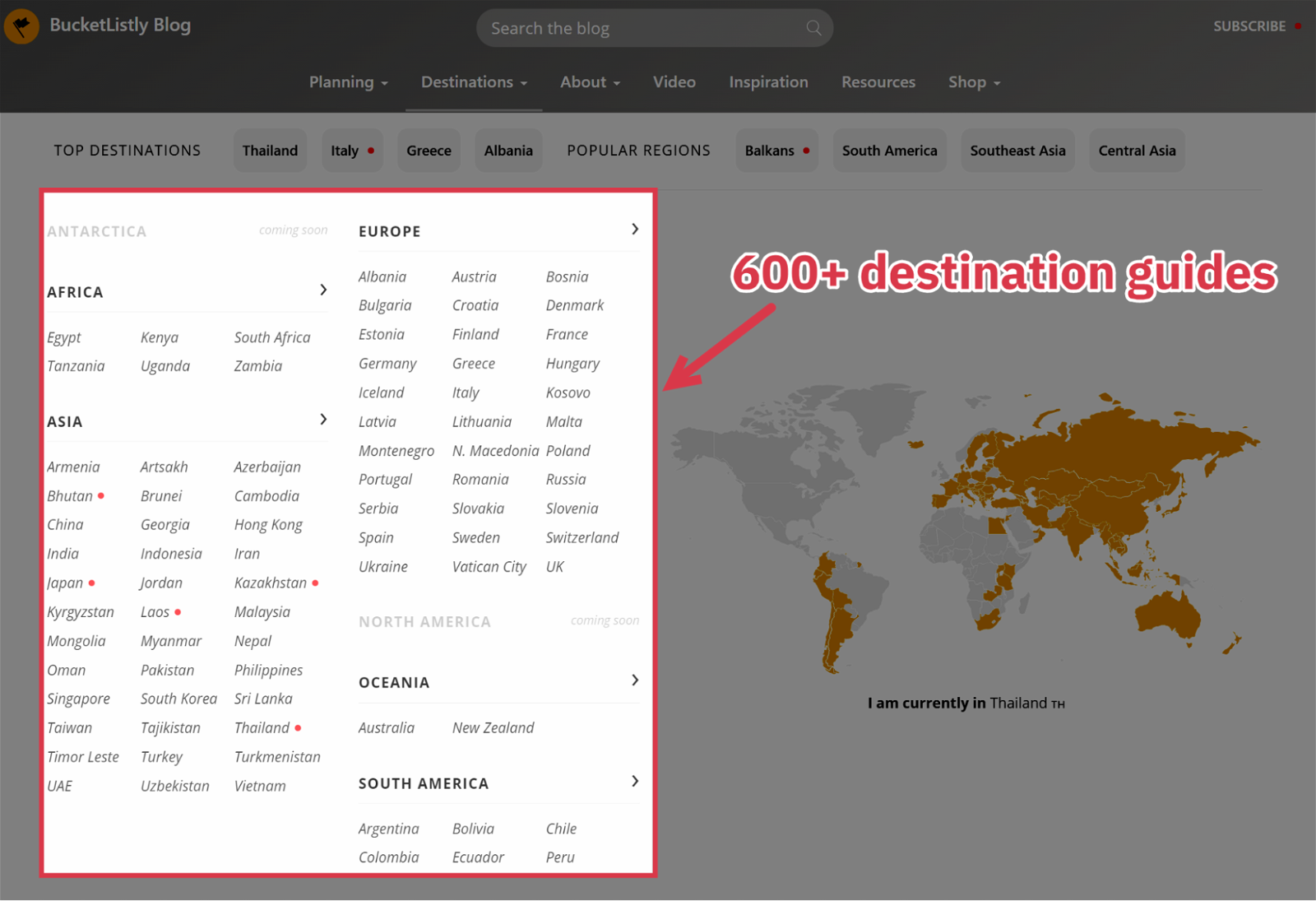
Each destination’s category page has an array of affiliate links to relevant travel services for the destination, including flights, hotels, buses, trains, car rentals, and travel insurance.
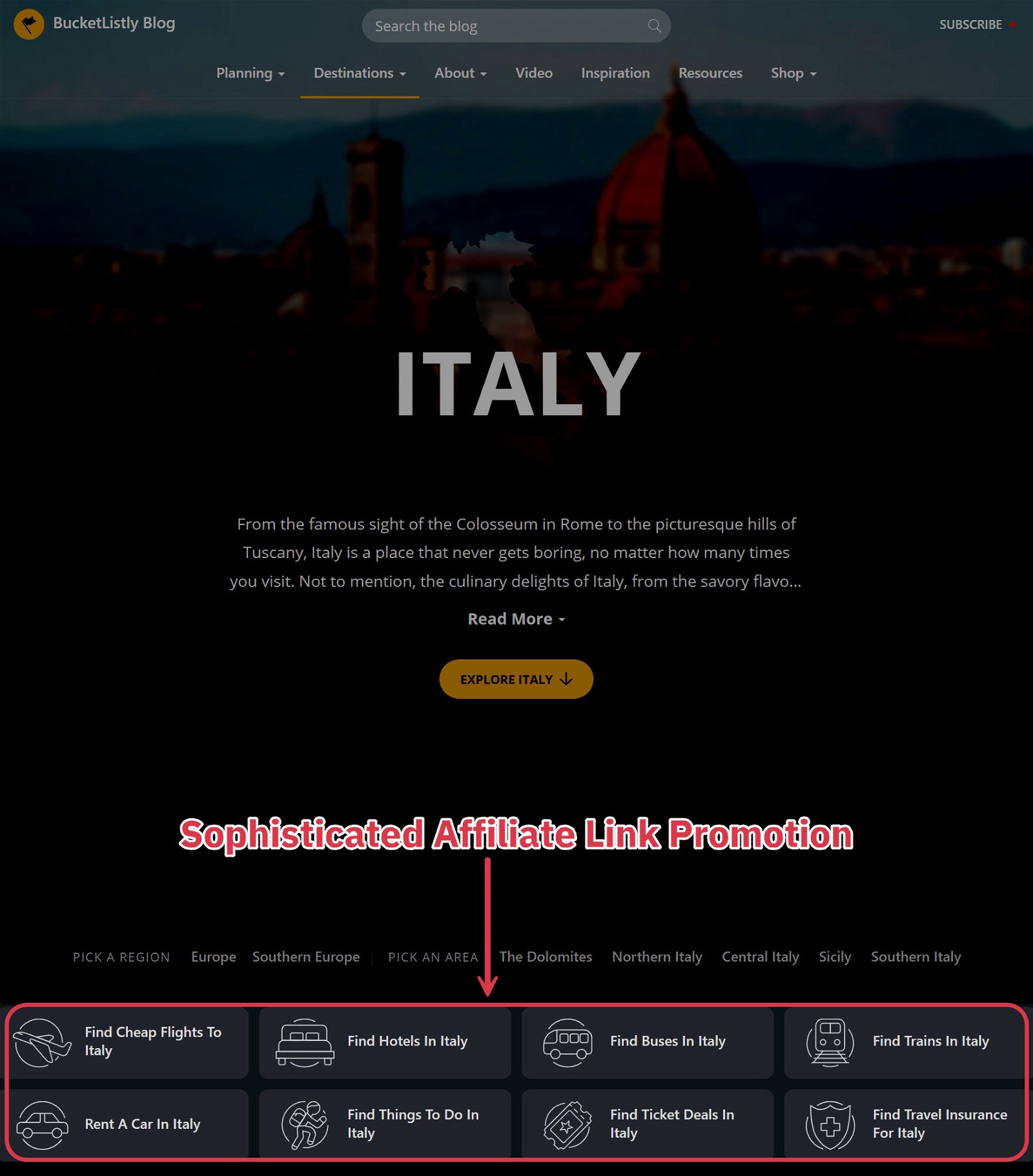
Many of the travel guides also have embedded hotel recommendations from Booking.com, who Pete is partnered with.
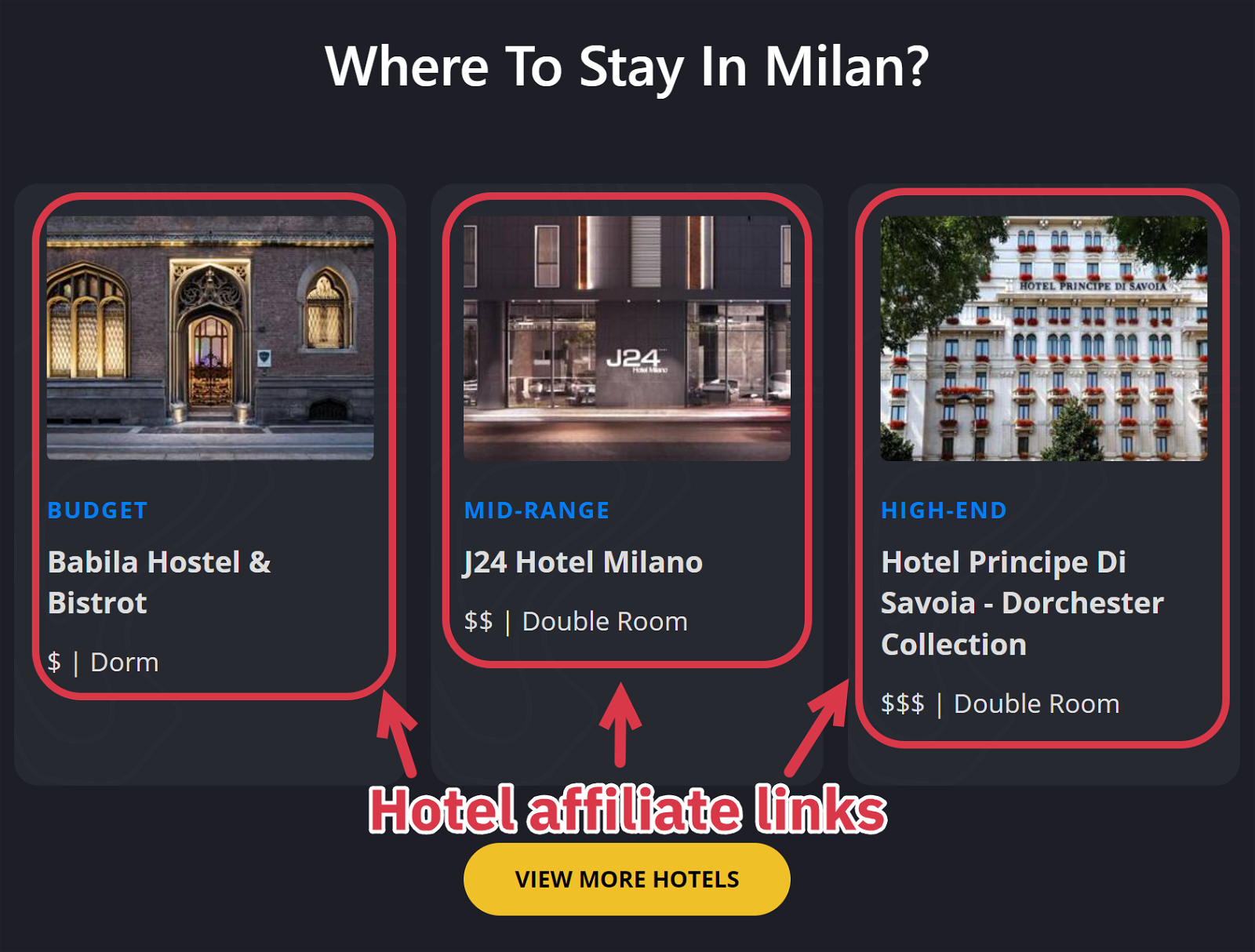
Selling Lightroom Presets
Flights & accommodation affiliate programs: Skyscanner, Booking.com
Transport affiliate programs: DiscoverCars.com, Omio, Busbud
Activity affiliate programs: GetYourGuide, Viator
Travel insurance affiliate programs: Heymondo
Beyond the Blog
Pete also shares incredible cinematic videos on YouTube and travel and photography pins on Pinterest.
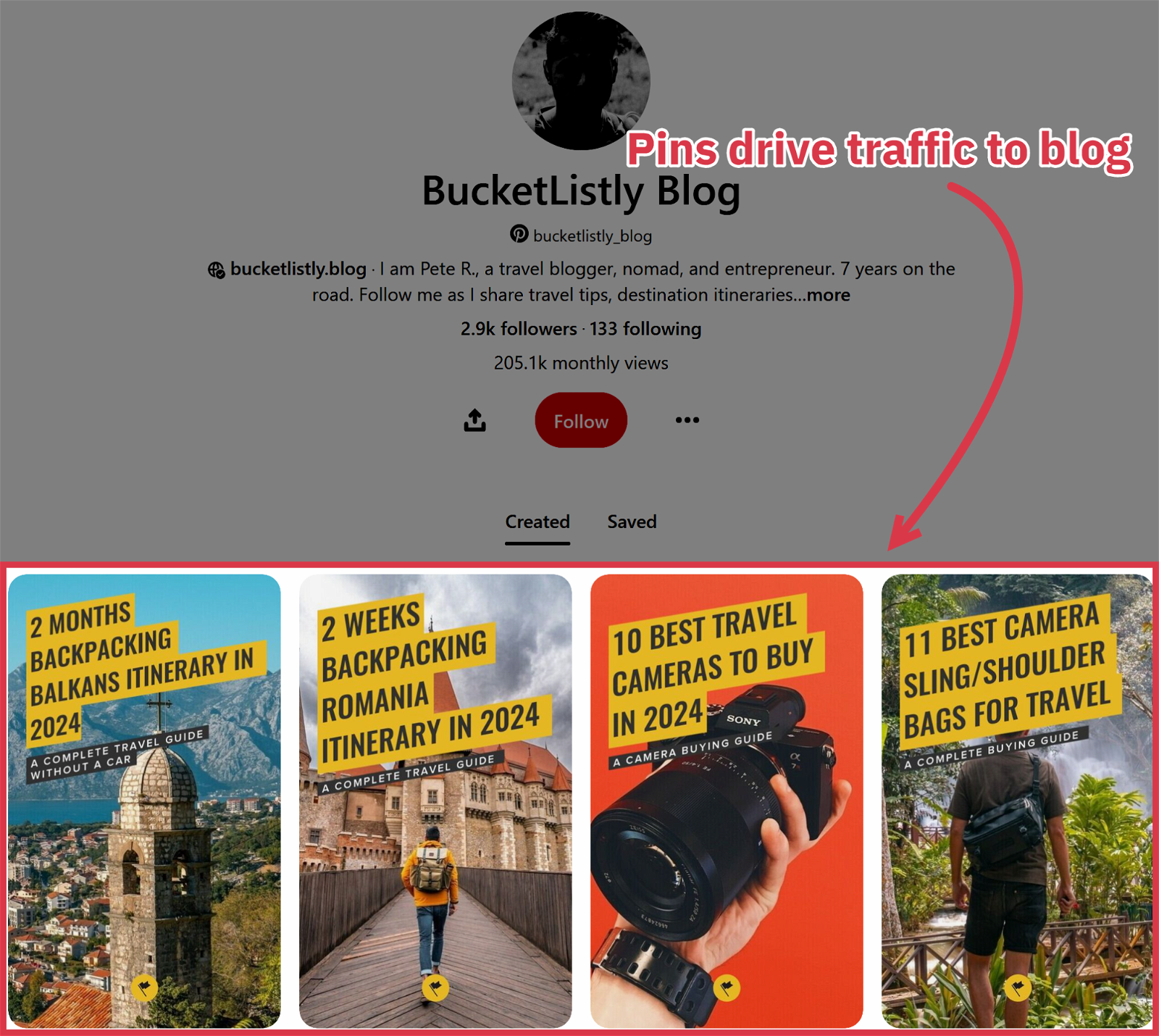
6 The Blonde Abroad
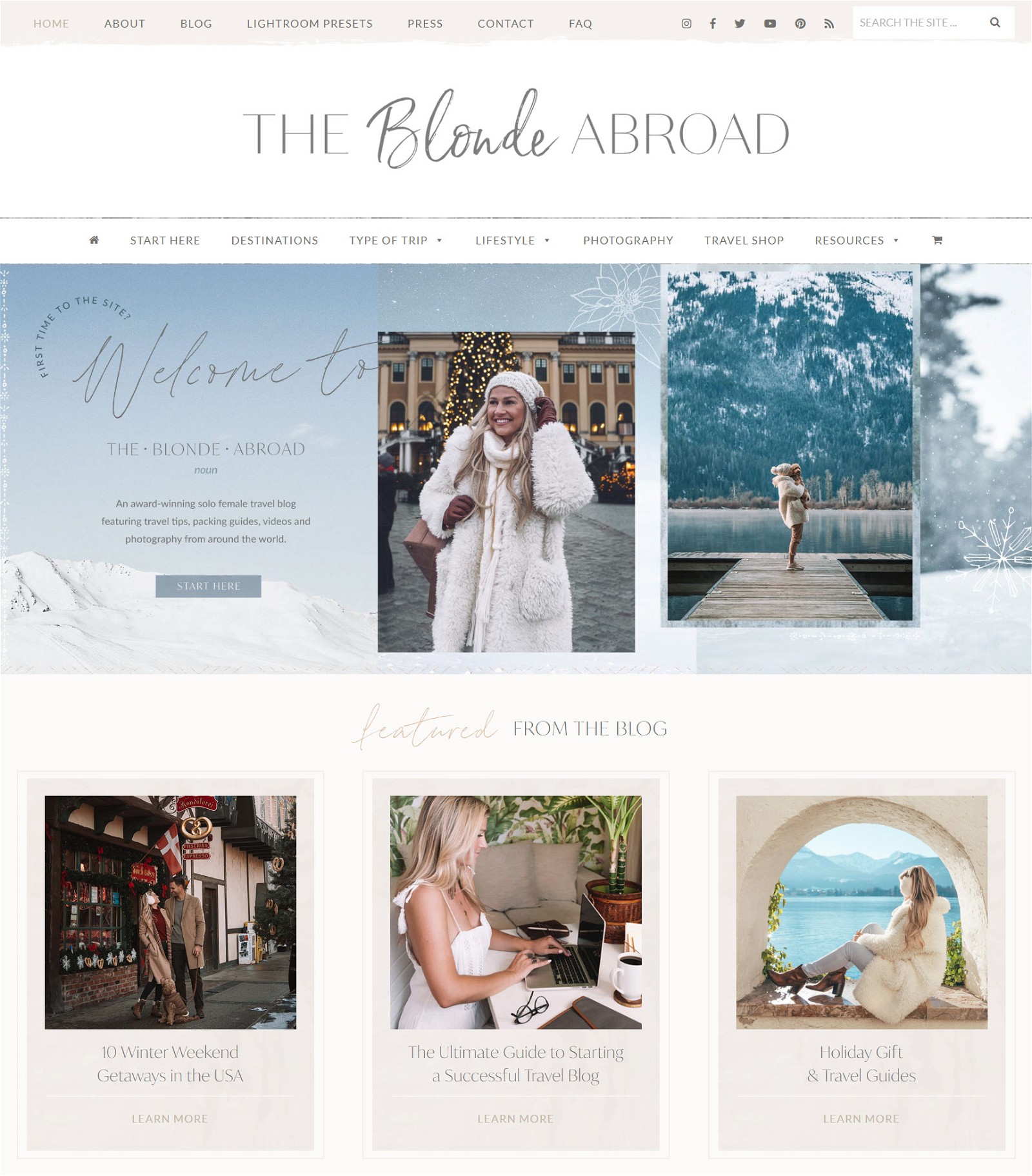
About
The Blonde Abroad is a solo female travel blog. Launched in 2012 by Kiki Rich, a former corporate finance professional who quit her job to see the world, the site helps female travelers prepare for their own travel adventures.
What The Blonde Abroad Does Well
Kiki has mastered the art of creating highly engaging and scannable content on her blog.
Check out her Mykonos Beach and Party Guide, which includes many readability-boosting elements:
- A “party craziness scale” graphic
- 1 image per list item
- Bolded sentences to highlight key points
- Aesthetic subheadings
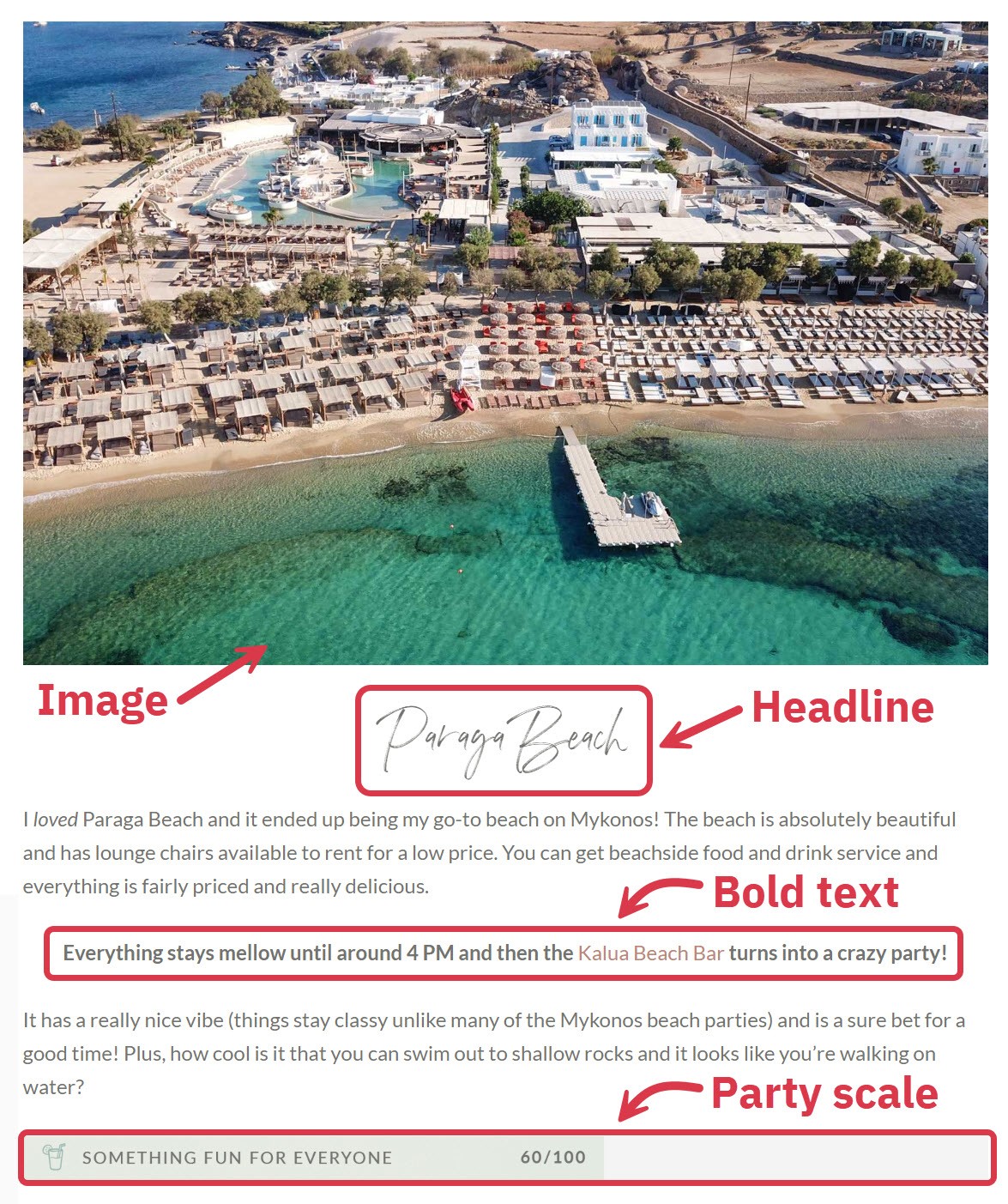
And when Kiki includes normal text, she uses short paragraphs that are easy to read.
The bottom line? Make your content scannable and easy to read.
Images, graphics, headings, and other elements can make your posts easier to read, increasing their time on the page and improving their rankings.
Tour company: TBAEscapes
Selling Lightroom presets
Flights & accommodation affiliate programs: Going, Booking.com, HostelWorld, HotelsCombined
Transport affiliate programs: Rentalcars.com
Travel insurance affiliate programs: World Nomads
Credit card affiliate programs: Card Ratings
Travel internet affiliate programs: Skyroam, ExpressVPN
Beyond the Blog
Kiki has a successful Instagram account with over 500,000 followers, which helps her earn additional revenue through paid partnerships and promoting her tour company.
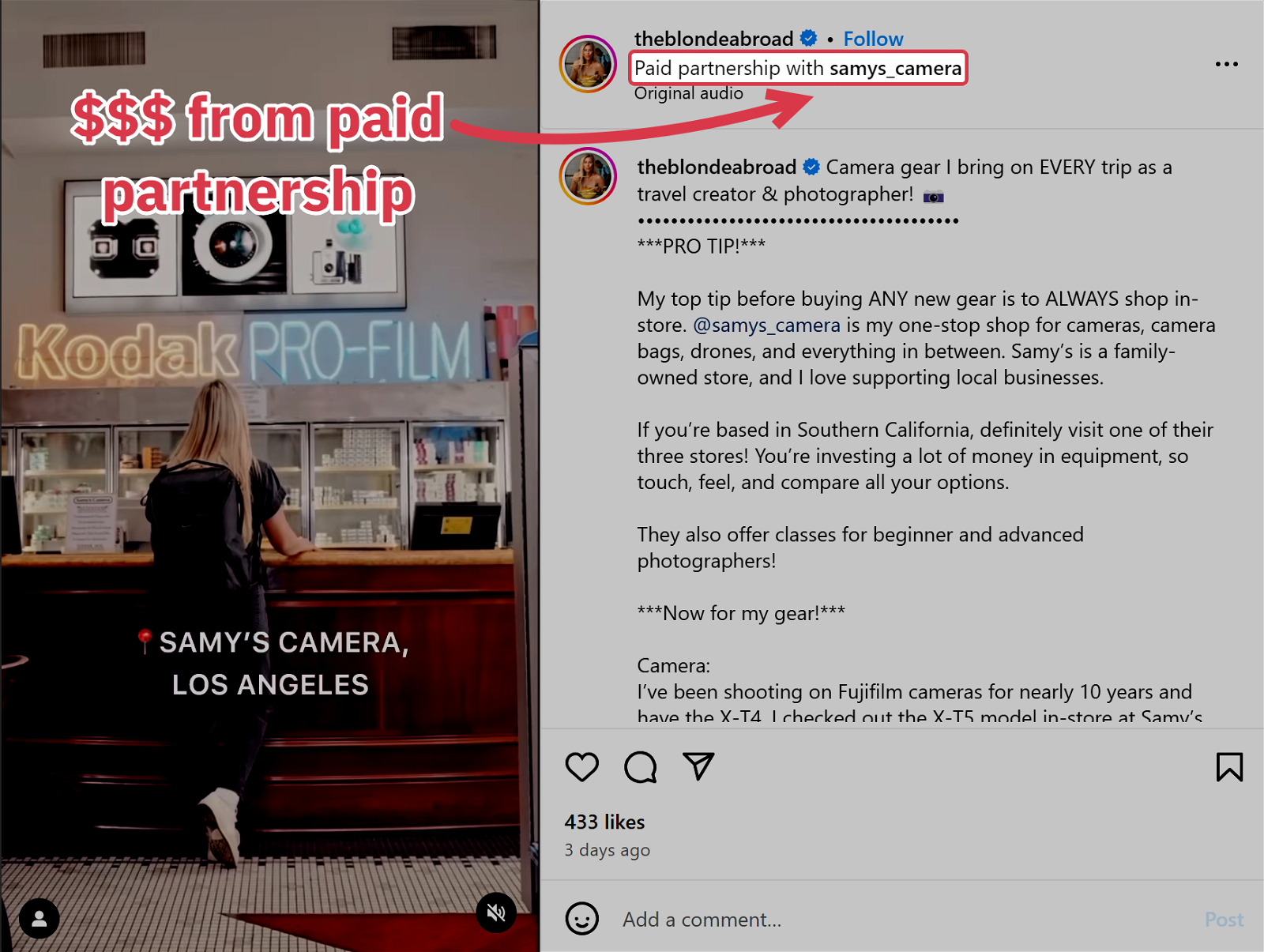
7 Salt In Our Hair
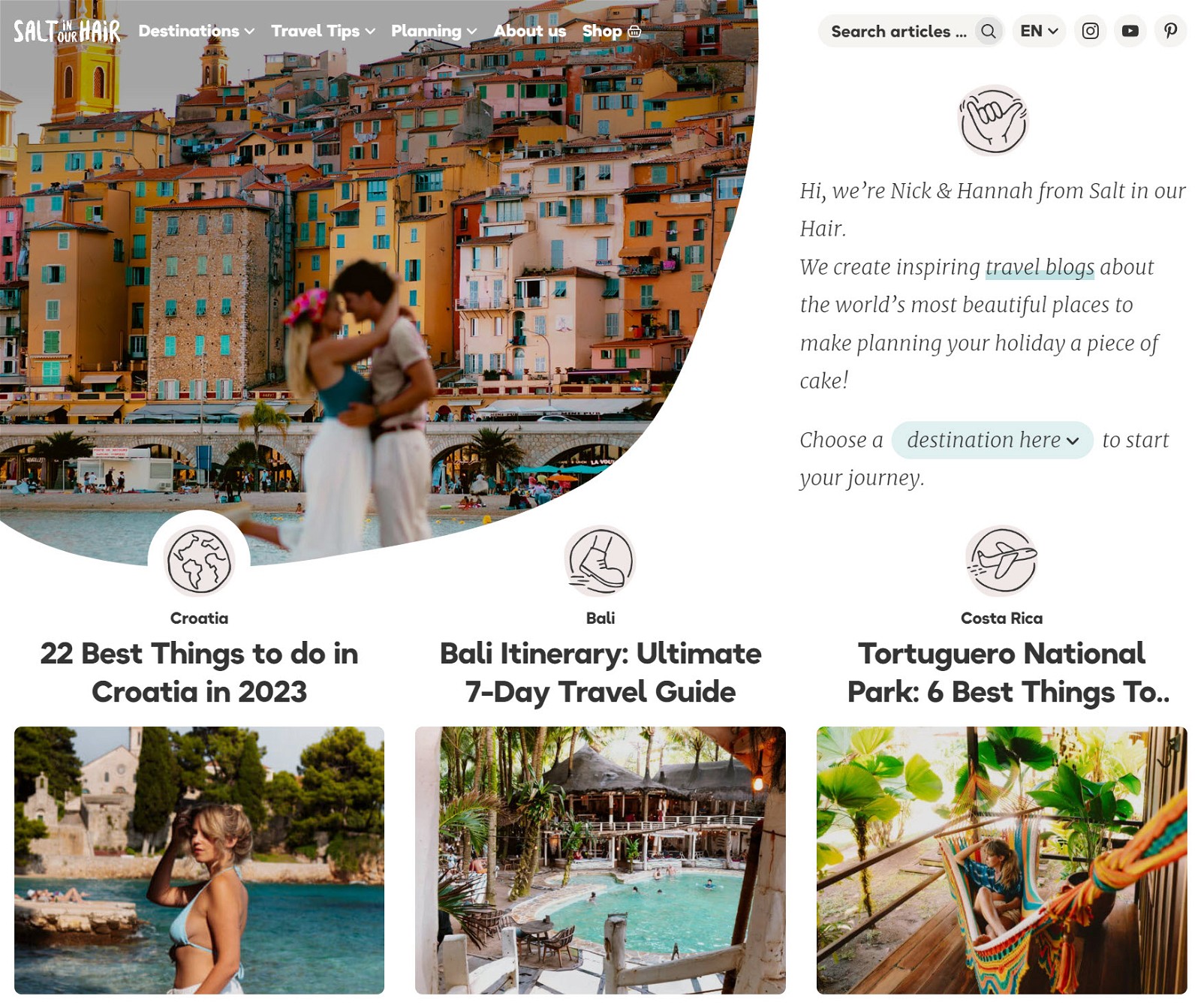
📈Traffic: 350k monthly visits
💪DR: 63
⚙️ CMS: WordPress
🎨Theme: Custom
About
Salt In Our Hair, run by Nick and Hannah, is a general travel blog that started as an Instagram account. The duo left their corporate careers to pursue their passion for travel blogging.
What Salt In Our Hair Does Well
Nick and Hannah use custom graphics in their content to present data more effectively.
For instance, instead of an unwieldy bulleted list or table, they crafted an easily understandable, appealing graphic to display weather information.
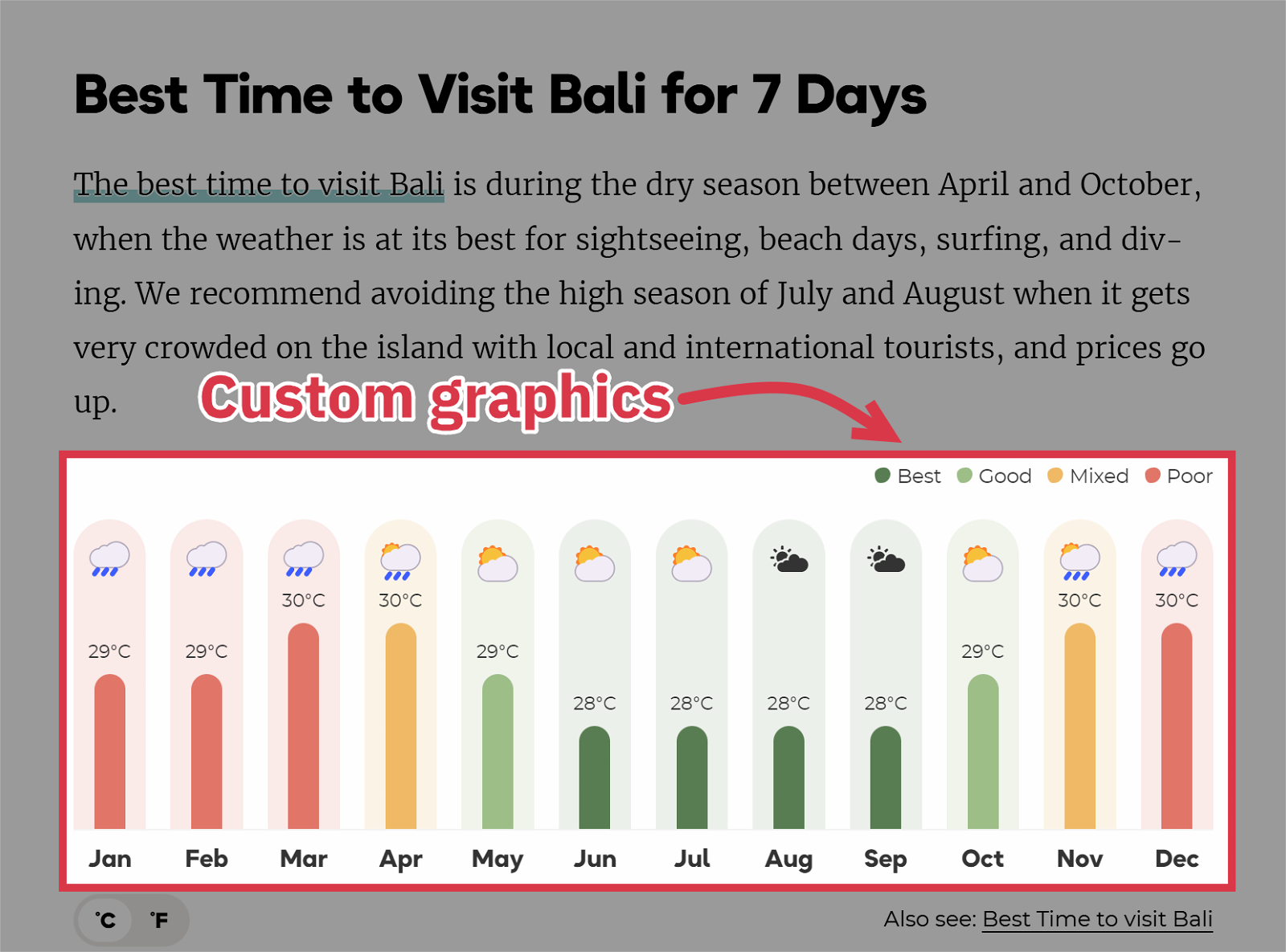
Another example is this graphic in their Java guide, which highlights essential spots for an 8-day visit.
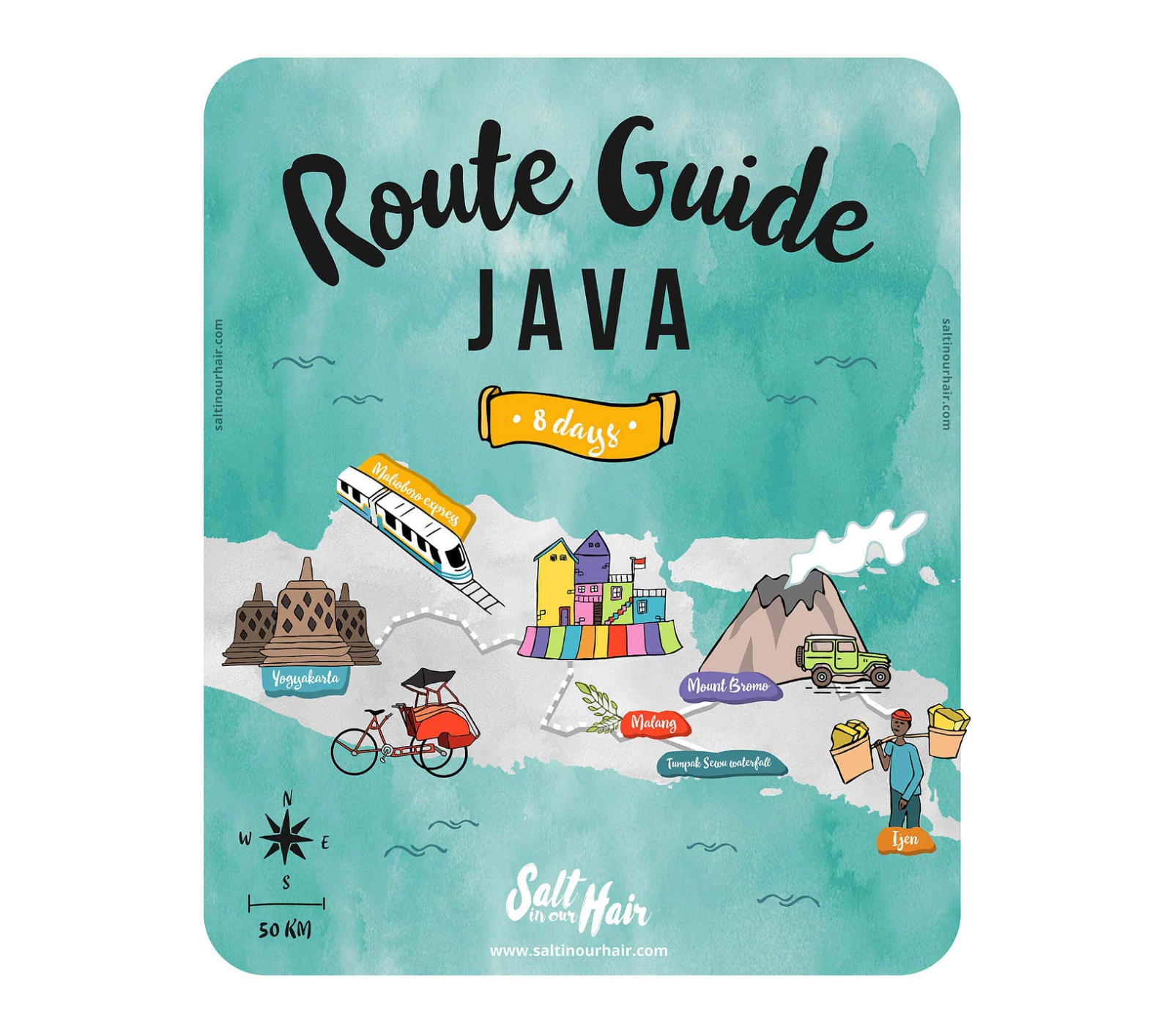
You can use Canva to add engaging, helpful graphics to your blog, even without graphic design experience.
It’s a great tool for creating custom graphics, as it offers a wide array of templates you can fine-tune to match your site’s branding.
Selling Lightroom presets, mobile video filters, and customized Google Maps files
Flights & accommodation affiliate programs: Booking.com, HostelWorld, VRBO, Trusted House Sitters, Skyscanner
Transport affiliate programs: SunnyCars, 12Go
Activity affiliate programs: Viator
Travel insurance affiliate programs: Heymondo, SafetyWing
Visa affiliate programs: iVisa
Beyond the Blog
Salt In Our Hair started on Instagram, and the account continues to thrive. Nick and Hannah have over 330,000 followers and get high engagement by posting video reels of their travel adventures.
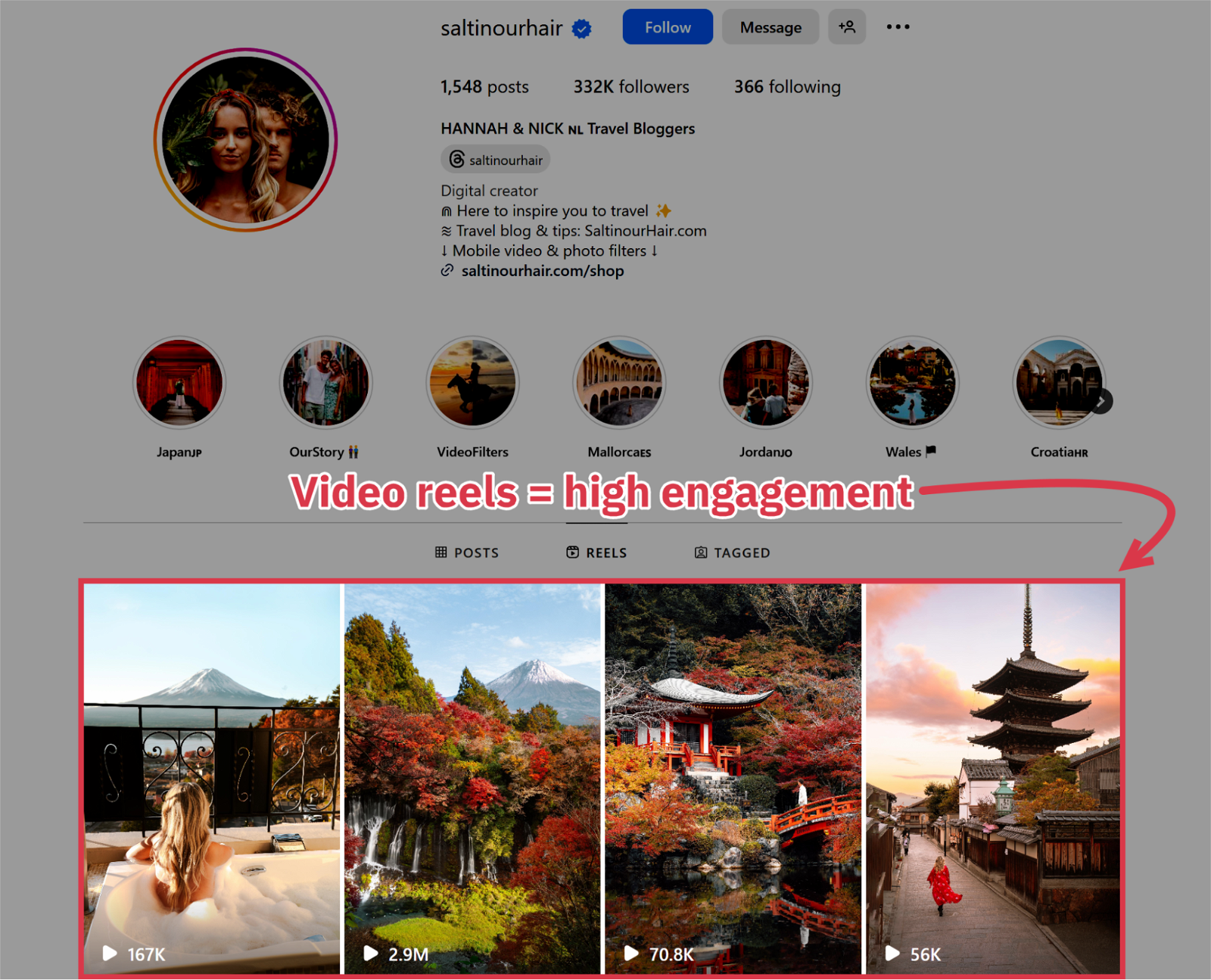
8 The Planet D
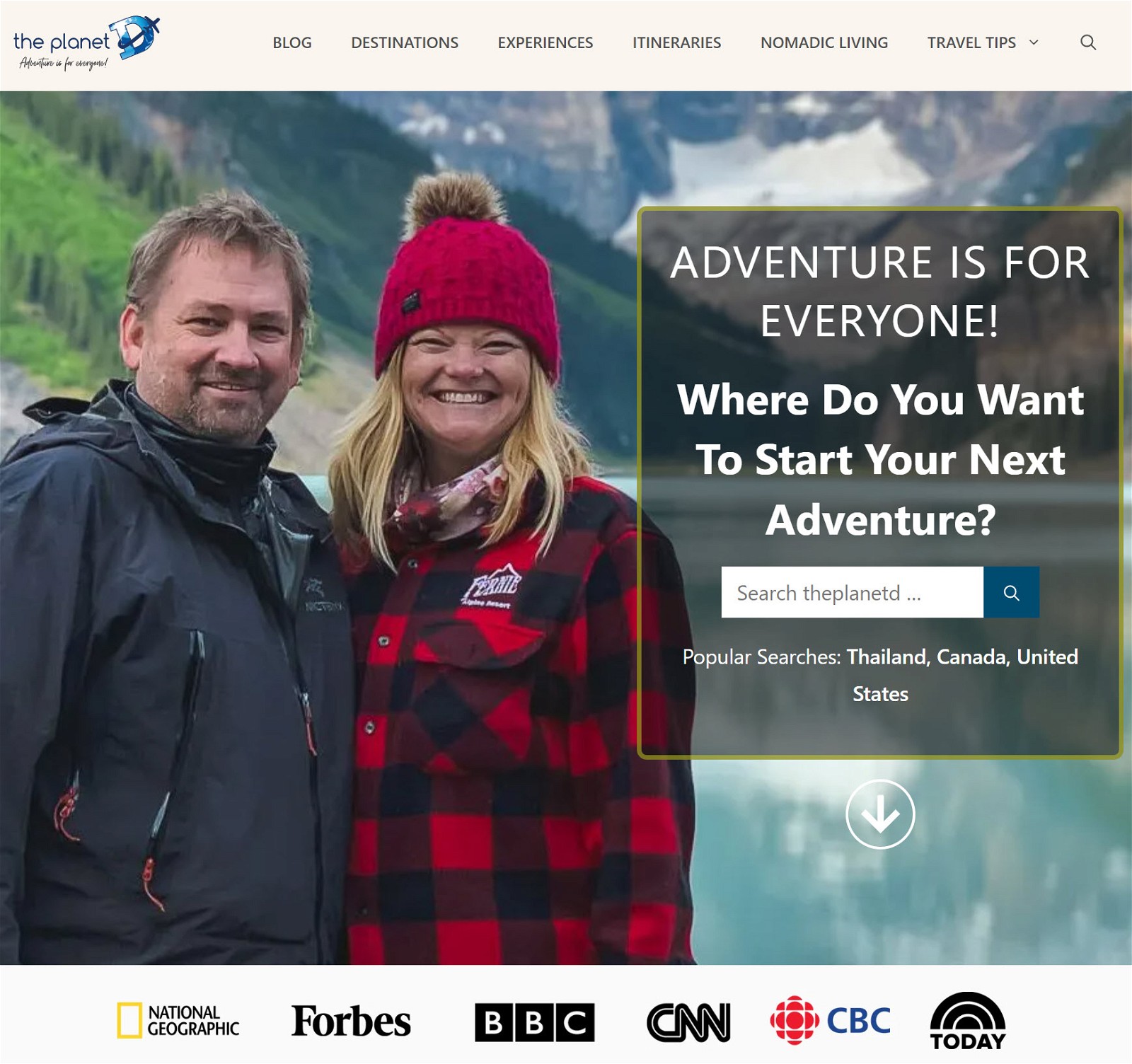
📈Traffic: 800k monthly visits
💪 DR: 77
⚙️ CMS: WordPress
🎨Theme: Custom
About
Founded by ex-movie industry professionals Dave Bouskill and Deb Corbeil, The Planet D is a comprehensive travel blog offering tips and covering over 110 countries.
Recognized as top travel influencers by Forbes, the duo has journeyed to more than 120 countries across all seven continents.
What The Planet D Does Well
Dave and Deb demonstrate authority in the travel blog space with a few replicable strategies:
Prominently displaying the publications and TV channels they’ve been featured on, which includes National Geographic, Forbes, and BBC.
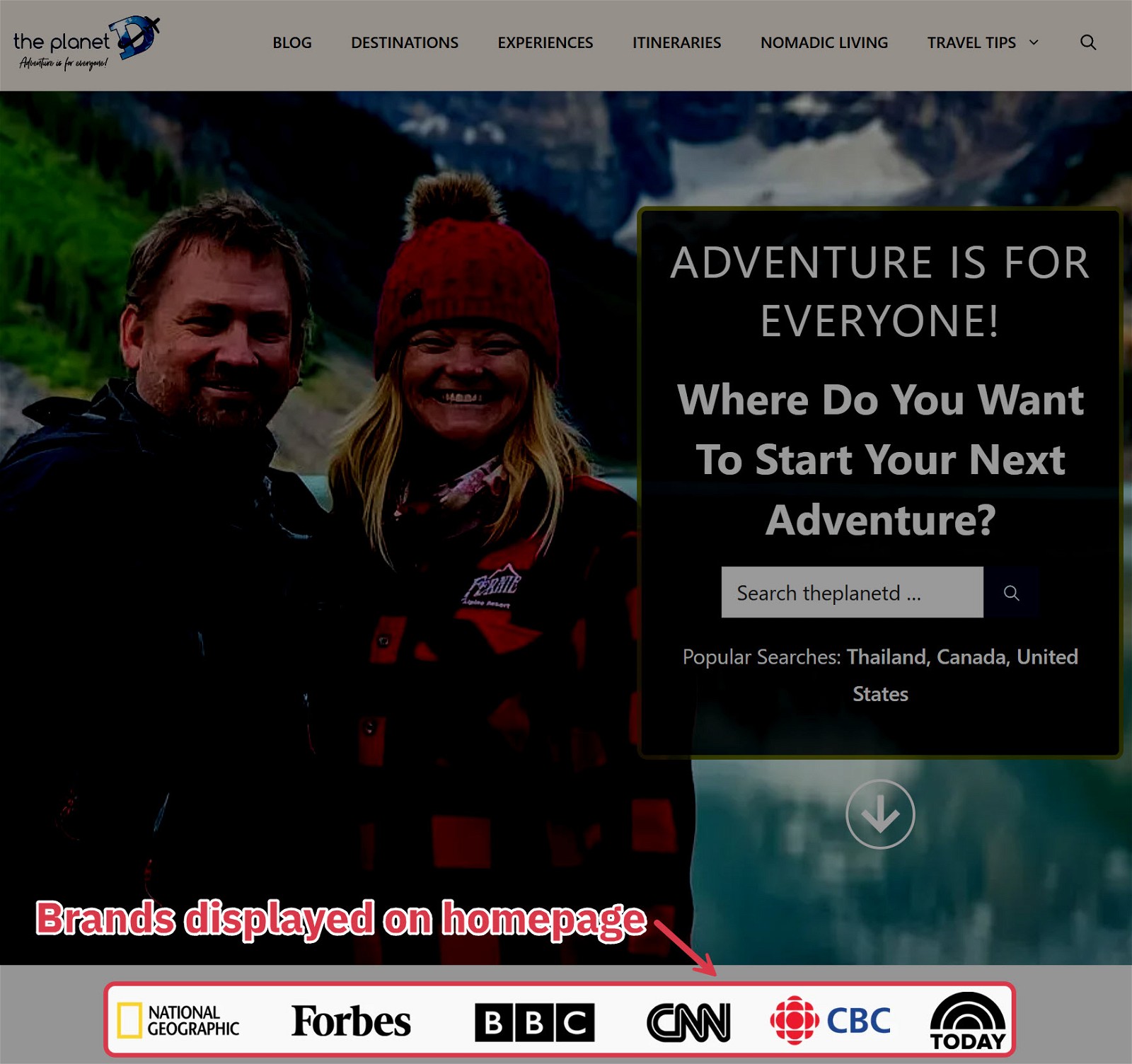
Here are a few other ways they showcase authority:
They build social proof by sharing the impressive size of their audience.
They highlight their expertise by listing the travel awards they’ve won.
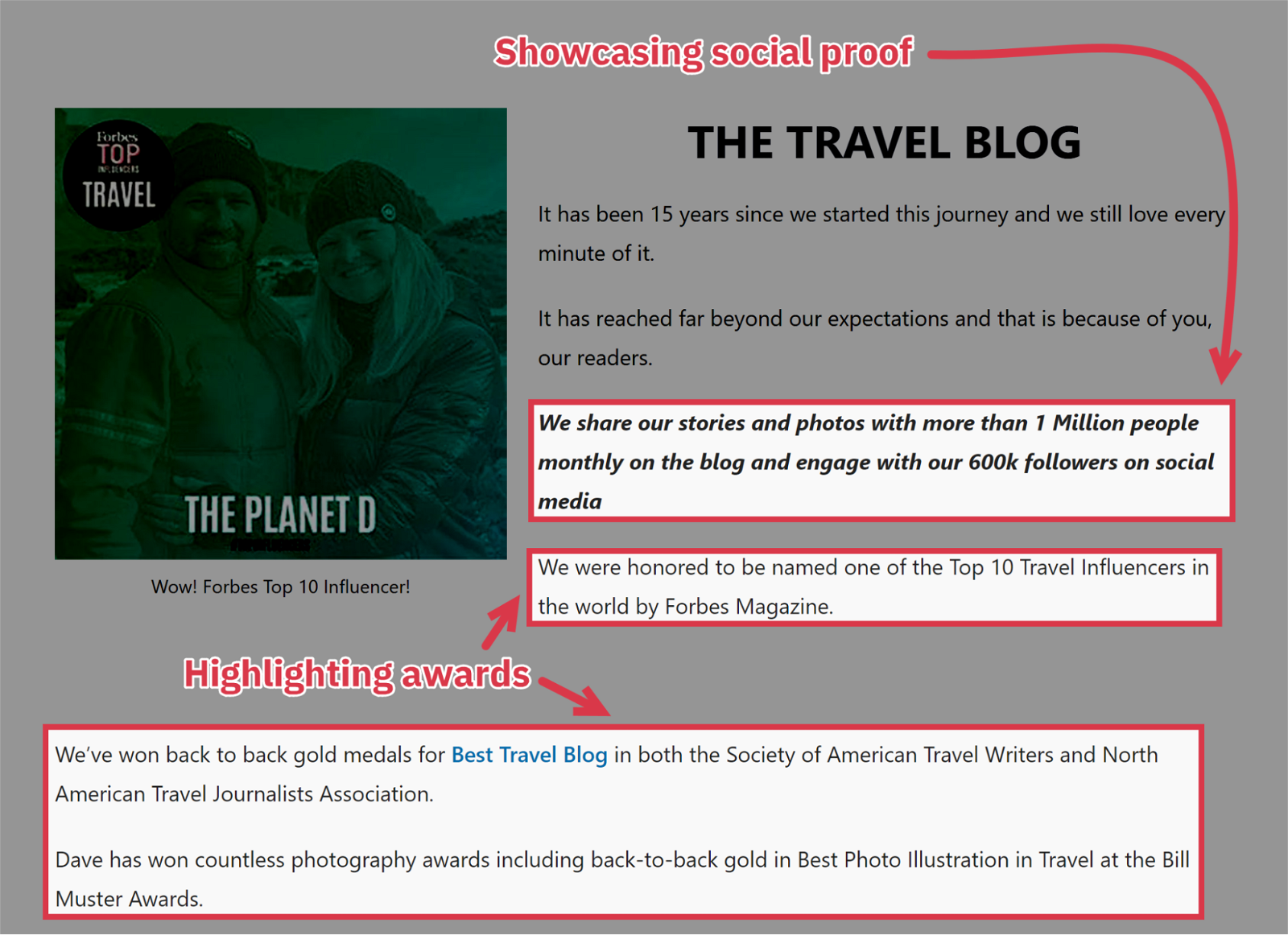
They also share the many minor brands they’ve collaborated with on their Work With Us page.
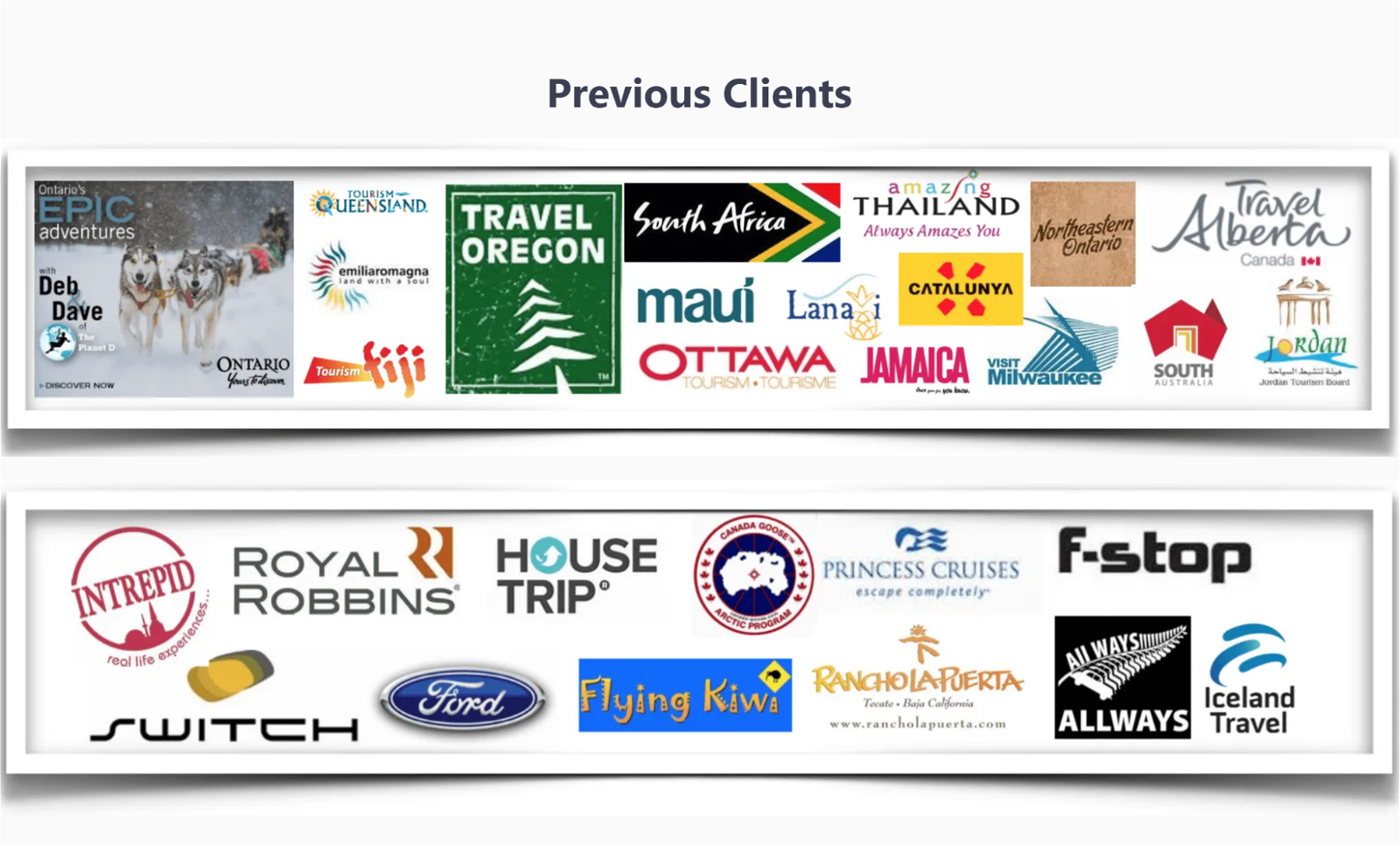
These authority-boosting strategies help legitimize them in the eyes of readers and search engines.
While it might be tough for a newer travel blogger to get featured on TV or huge websites like Dave and Deb, you can establish authority in other ways:
- If you get a backlink from a prominent website, ask if you can use their logo in the “Featured On” section of your homepage.
- Apply for travel blog awards. If your content is good and your blog is well-designed, you might win something!
Flights & accommodation affiliate programs: Booking.com, HostelWorld, VRBO, Trusted House Sitters, Skyscanner
Transport affiliate programs: SunnyCars, 12Go
Activity affiliate programs: Viator
Travel insurance affiliate programs: Heymondo, SafetyWing
Visa affiliate programs: iVisa
Beyond the Blog
Dave and Deb have a YouTube channel where they post their travel vlogs and share trip guides.
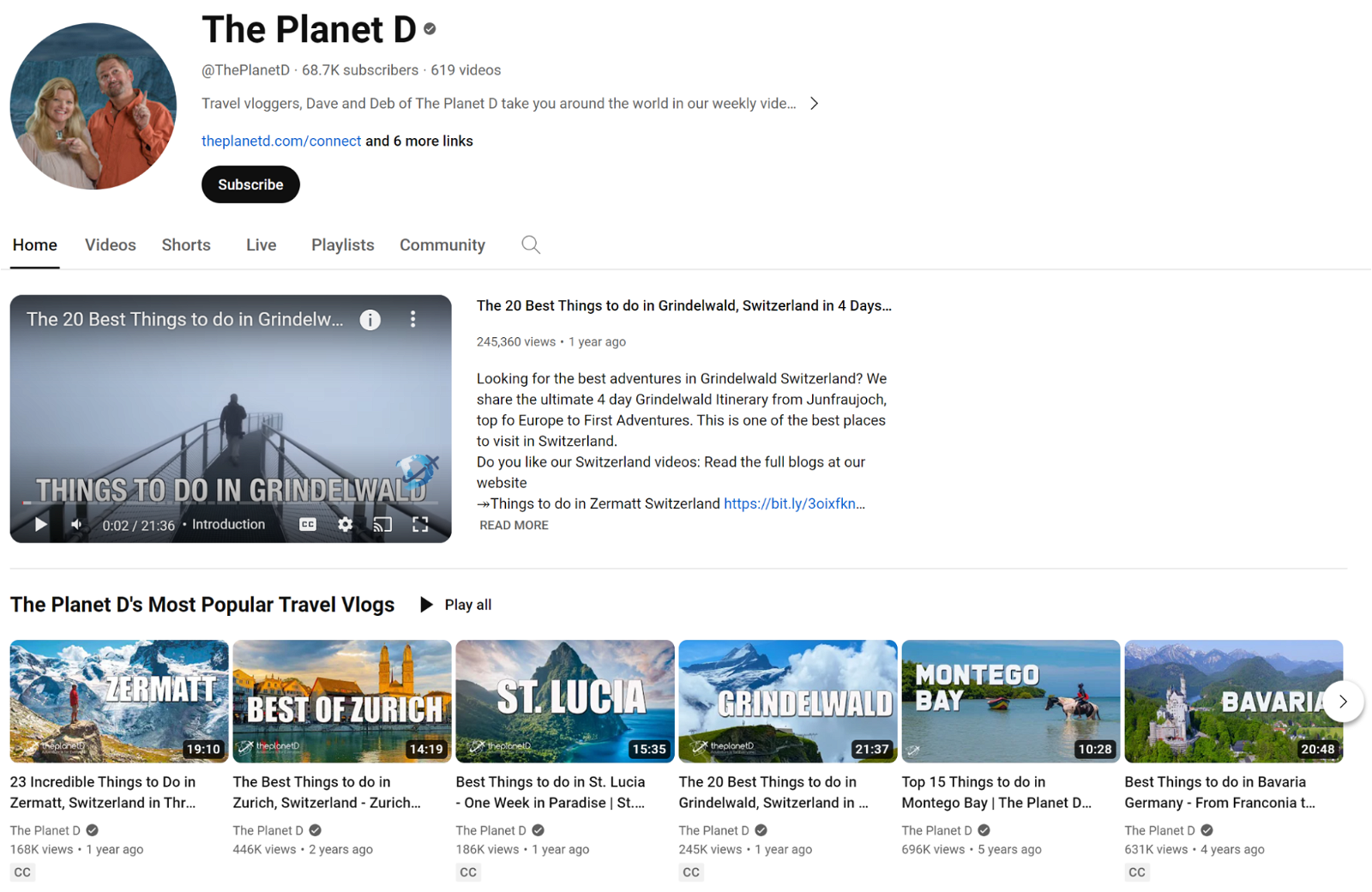
9 Expert Vagabond
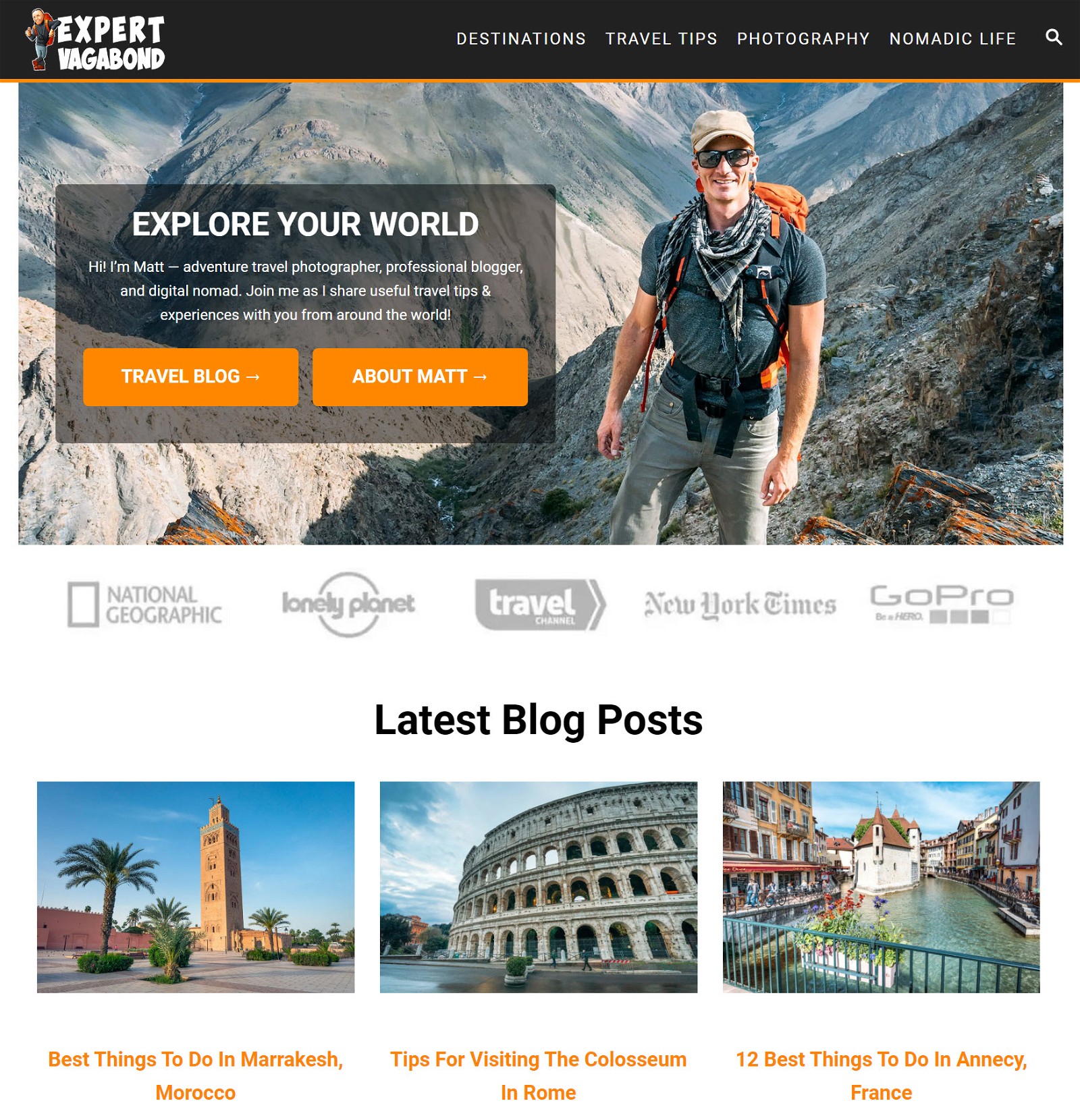
📈 Traffic: 110k monthly visits
💪 DR: 71
⚙️ CMS: WordPress
🎨 Theme: Mediavine Trellis
About
The Expert Vagabond was started by Matt Karsten, a seasoned digital nomad who traded normal life for a one-way ticket to Guatemala in 2010.
This blog teaches you how to travel cheap, make money on the road, and take pictures while you’re at it.
What Expert Vagabond Does Well
Matt and his team include many relevant internal links in their blog posts. For example, their Best Travel Tips post includes 47 relevant internal links.
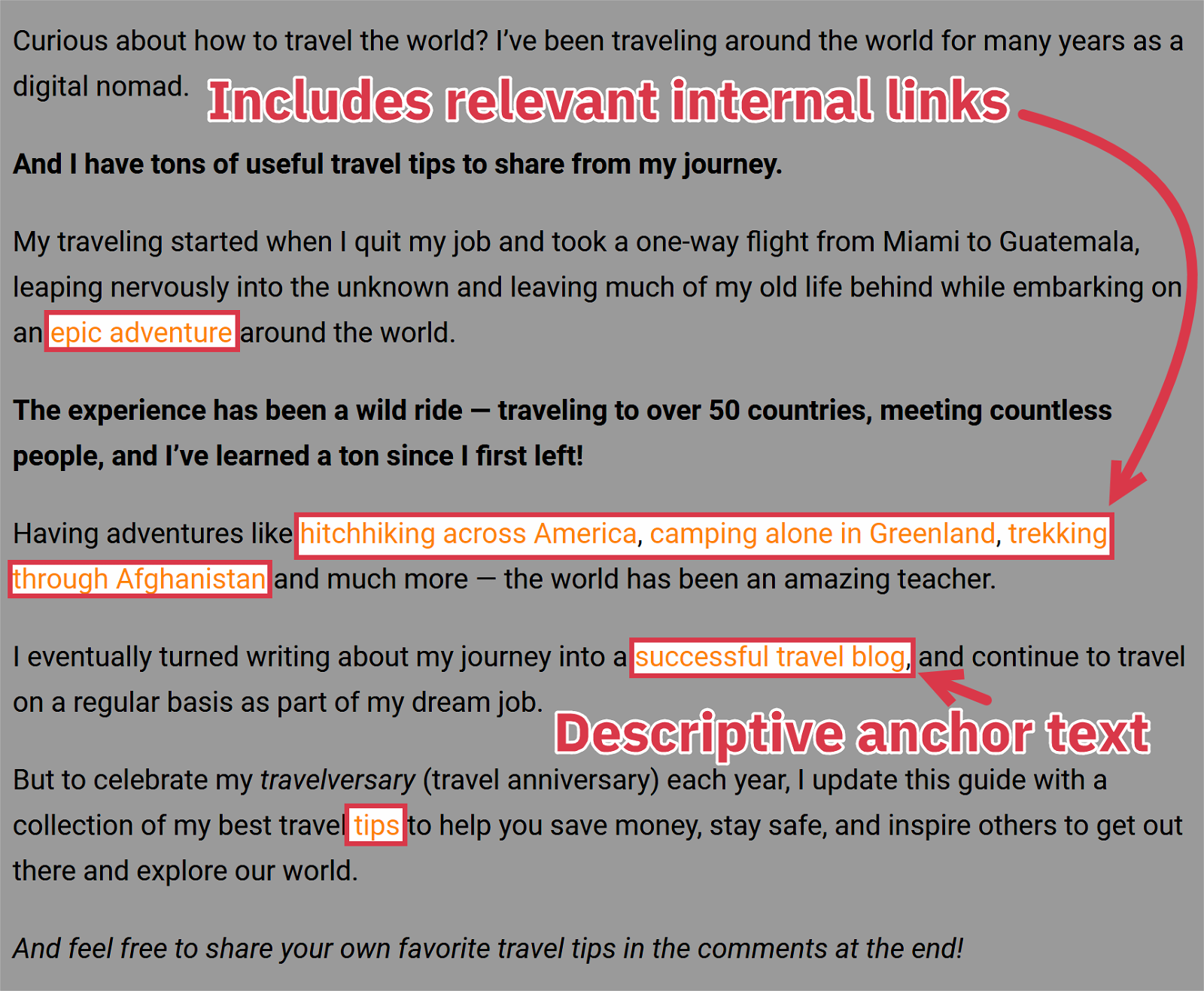
These internal links use appropriate anchor text that explains what the other page is about, which helps Google understand your site better and improve your rankings.
Adding internal links to relevant pages in your blog posts helps boost your SEO and improves the user experience.
Here’s how:
They improve your site architecture. Google uses internal links to crawl your website. Adding relevant internal links makes it easier for the crawler to operate, which helps your SEO.
They help Google better understand your pages. Google uses the anchor text – AKA the text that a link is embedded in – to help it understand the topic of the page the link is pointing to. You can get higher search rankings by using descriptive anchor text in your internal links.
They increase the time visitors spend on your site. If a visitor finds one of your posts on Google, reads it, and clicks an internal link to another post, this sends a positive signal to Google.
It helps the reader. If there’s a topic that you think readers on a certain post should know about, linking to a post on that topic will improve their understanding.
Beyond the Blog
Matt’s Instagram account – which has over 135,000 followers – showcases his family’s latest travel adventures.
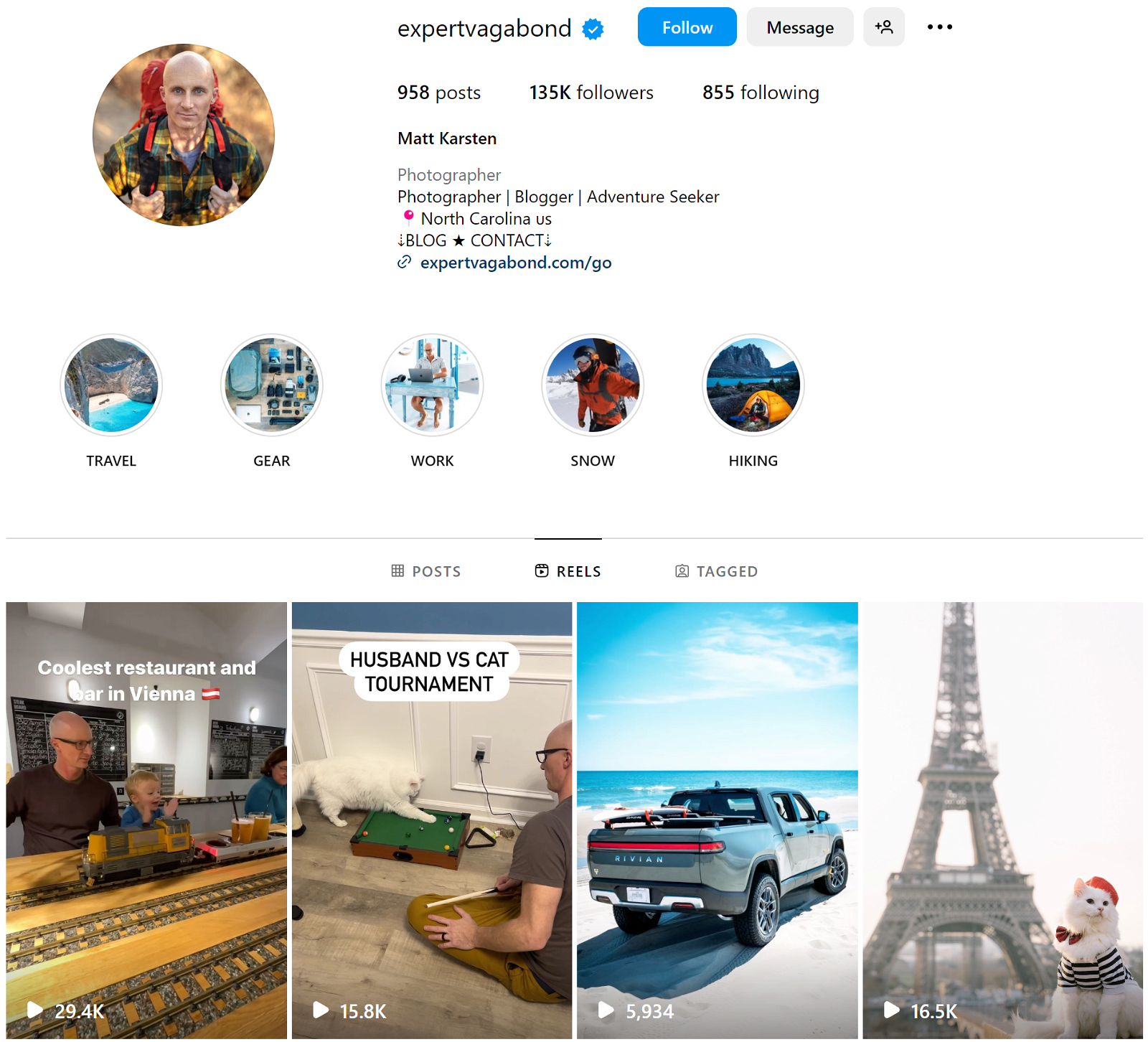
Flights & accommodation affiliate programs: Skyscanner, Going, Booking.com, Trusted House Sitters
Transport affiliate programs: DiscoverCars.com
Travel insurance affiliate programs: SafetyWing, World Nomads
Travel internet affiliate programs: Private Internet Access
10 The Poor Traveler
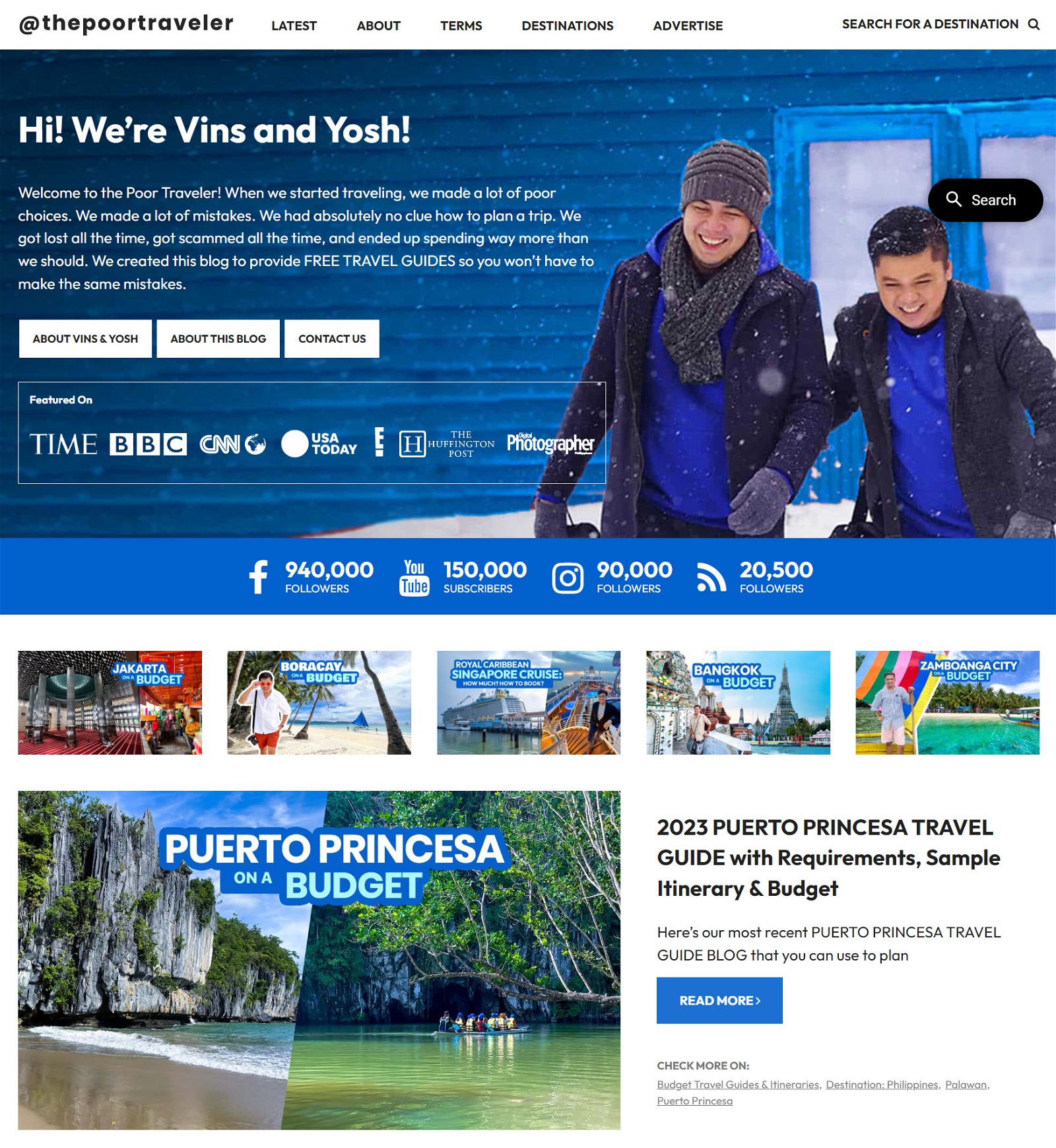
📈 Traffic: 550k monthly visits
💪 DR: 61
⚙️ CMS: WordPress
🎨 Theme: Bailey
About
The Poor Traveler was started in 2009 by Yosh Dimens and Vins Carlos after a series of mishaps on their early travels. It’s a budget travel blog offering in-depth guides to help novices avoid similar mistakes and travel more efficiently.
What The Poor Traveler Does Well
Vins and Yosh use content templates to structure their blog posts, providing consistency and a time-saving blueprint across similar posts. These templates eliminate the need to create a new outline for each post, streamlining the blogging process.
For example, if you compare their Tokyo Travel Guide and Seoul Travel Guide, you’ll see that the outline structure is very similar.
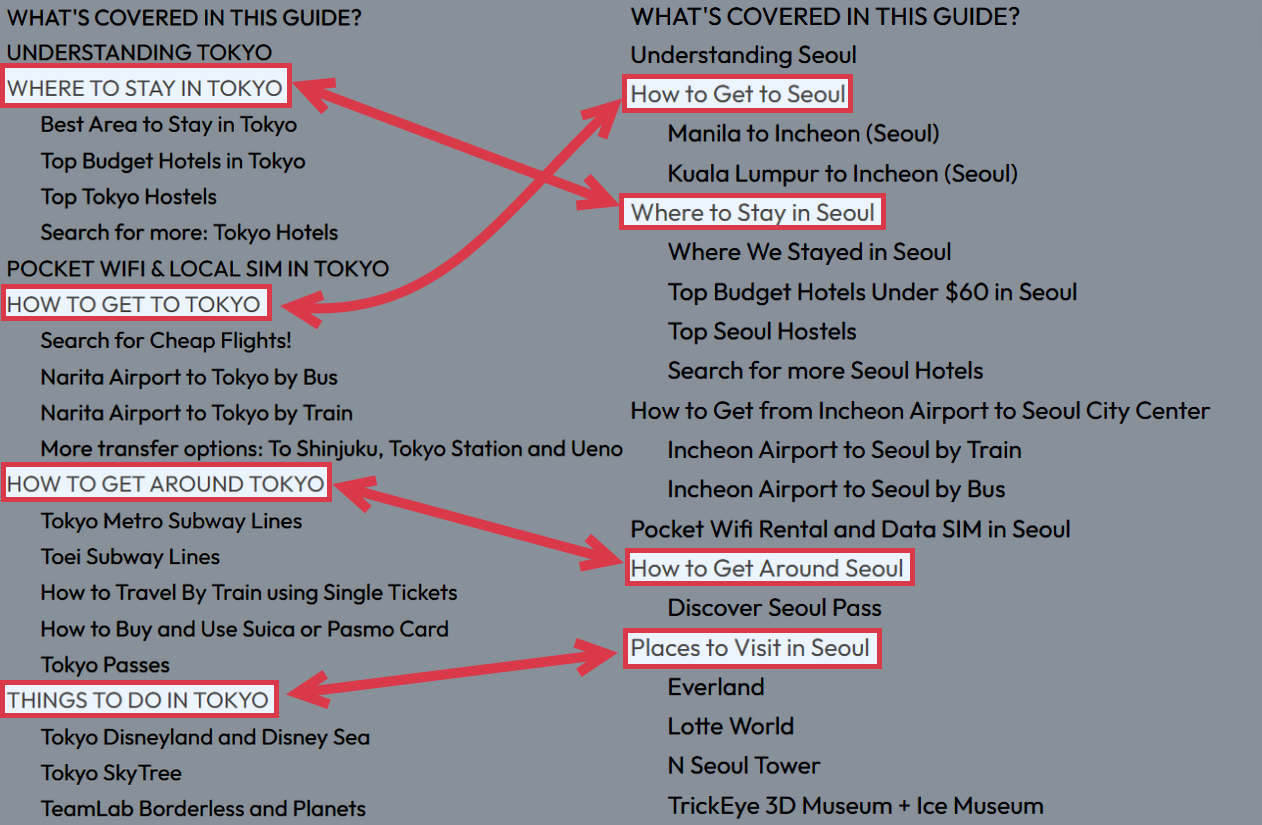
The same goes for their visa application guides.
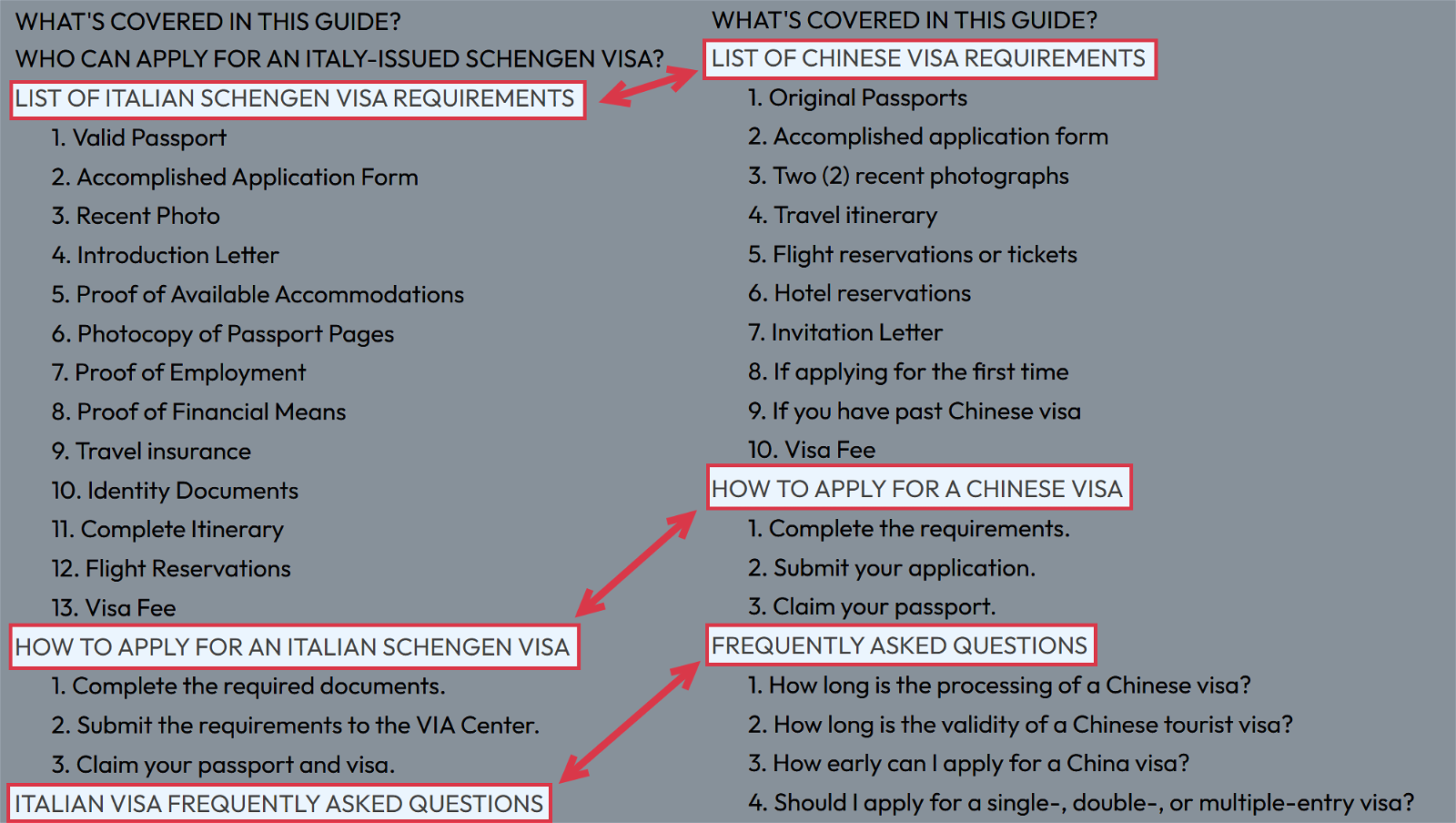
To speed up your blog growth, create content templates whenever you’re writing a series of similar posts.
Flights & accommodation affiliate programs: Skyscanner, Agoda
Activity affiliate programs: Klook
Beyond the Blog
Vins and Josh run a popular YouTube channel with over 150,000 subscribers, where they share weekly videos about their latest travels.
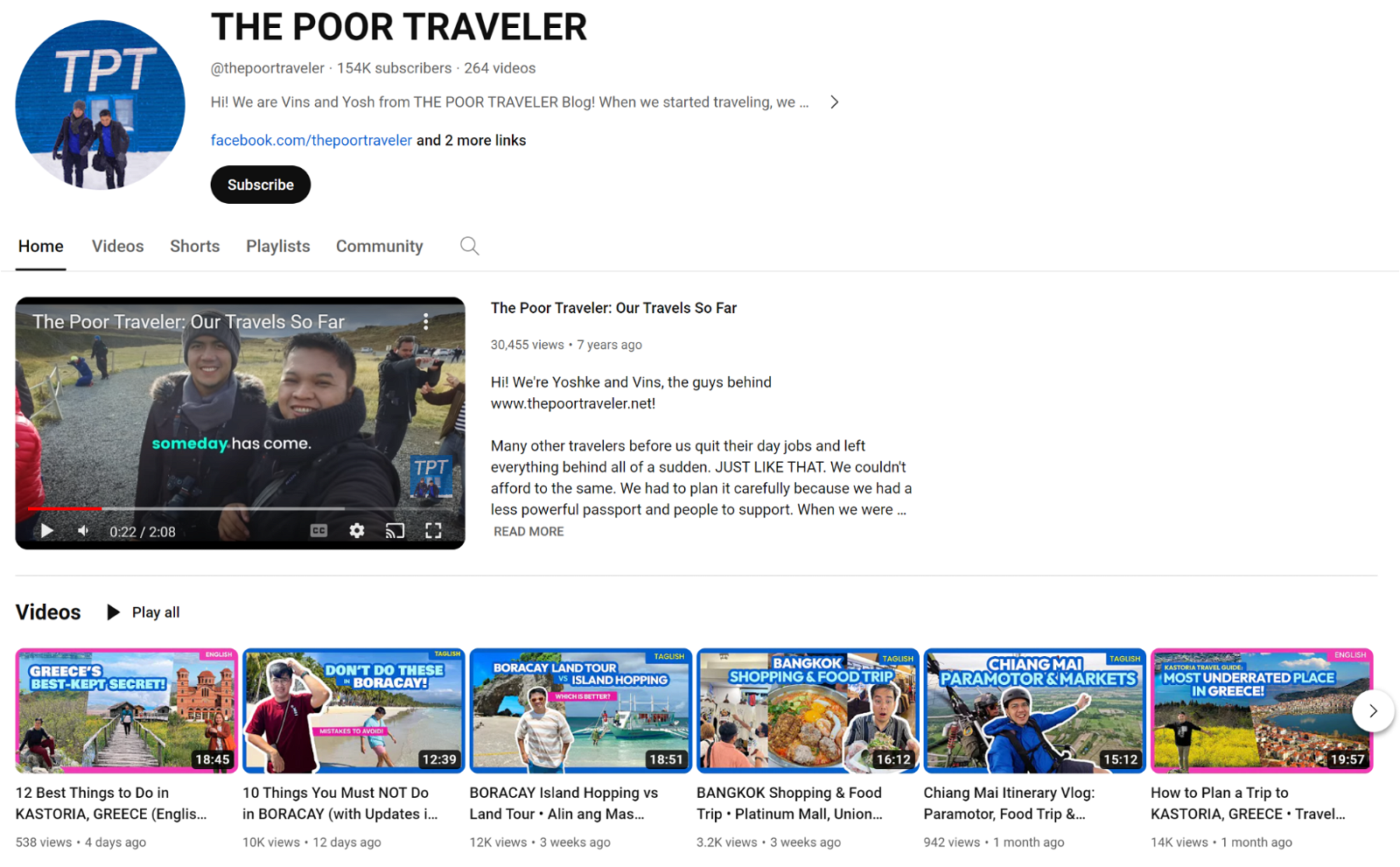
11 The Broke Backpacker
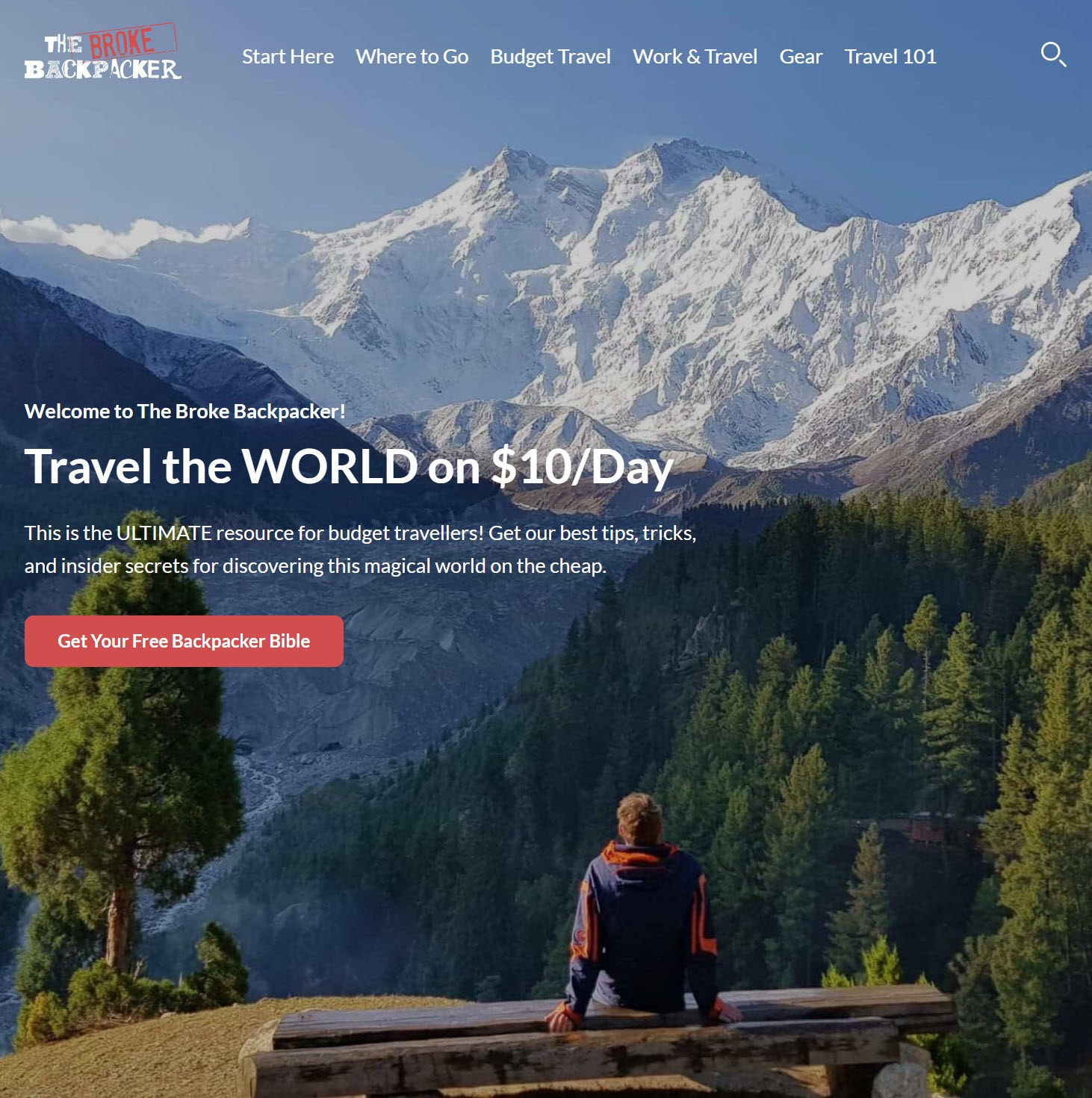
📈 Traffic: 500k monthly visits
💪 DR: 69
⚙️ CMS: WordPress
🎨 Theme: Custom
About
The Broke Backpacker, created by adventurer Will Hatton, started as a collection of handwritten budget travel tips circulated among a small group of travelers.
It eventually evolved into a major travel blog, offering detailed guides on how to travel the world for a mere $10 per day.
What The Broke Backpacker Does Well
The Broke Backpacker has extensive profiles for their team members.
For example, the Meet the Team page provides details about the founder, writers, and other contributors behind The Broke Backpacker, including:
- A photo
- Their name and title
- Links to their author pages, Instagram profiles, and personal websites
- Their background and what they do at the company
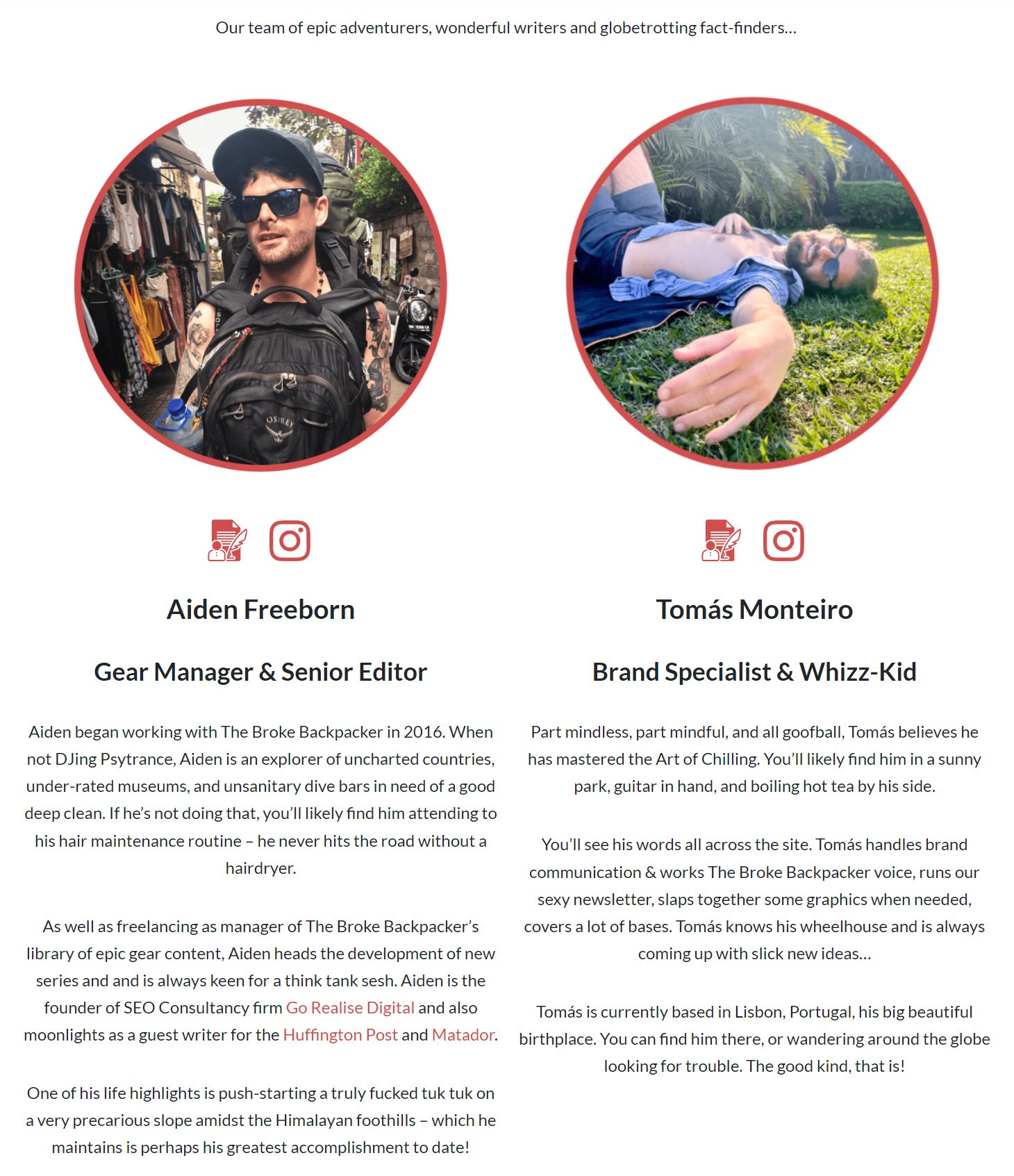
But it doesn’t stop there. Each team member also has a personal about page, which provides a more in-depth bio, links to other social media profiles, and a list of all the posts they’ve contributed to.
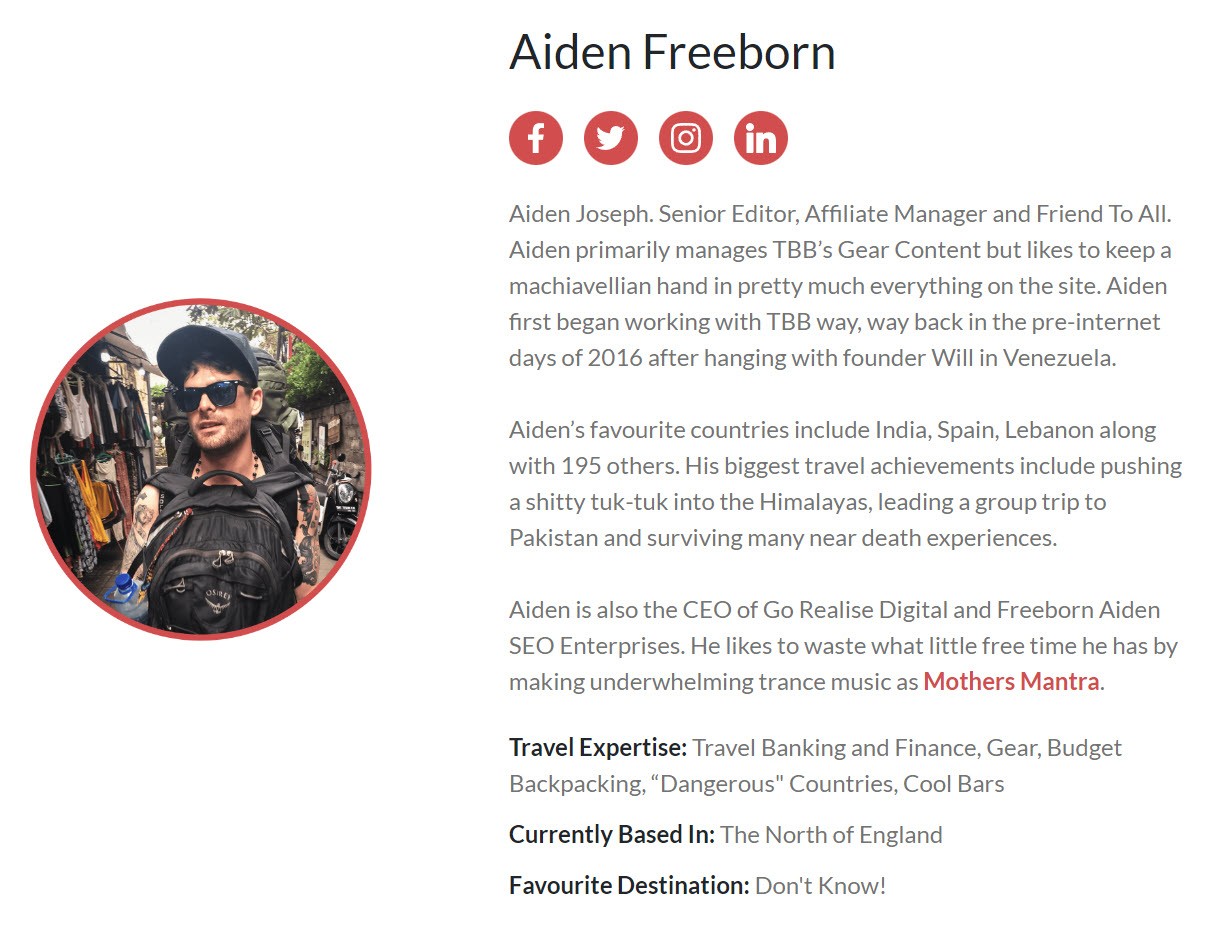
These pages are important for two reasons:
They let you showcase your team’s expertise and build trust with readers and Google.
They humanize your website and help build an emotional connection with readers.
Flights & accommodation affiliate programs: Booking.com, HostelWorld, Skyscanner
Travel insurance affiliate programs: World Nomads, SafetyWing, Heymondo, Faye, RentalCover, Columbus Direct, Gadget Cover
Travel gear affiliate programs: REI, Nomatic, Kodiak Leather, TropicFeel, Mahi Leather, WANDRD
Beyond the Blog
The Broke Backpacker has a Pinterest account that sends traffic to individual blog posts.
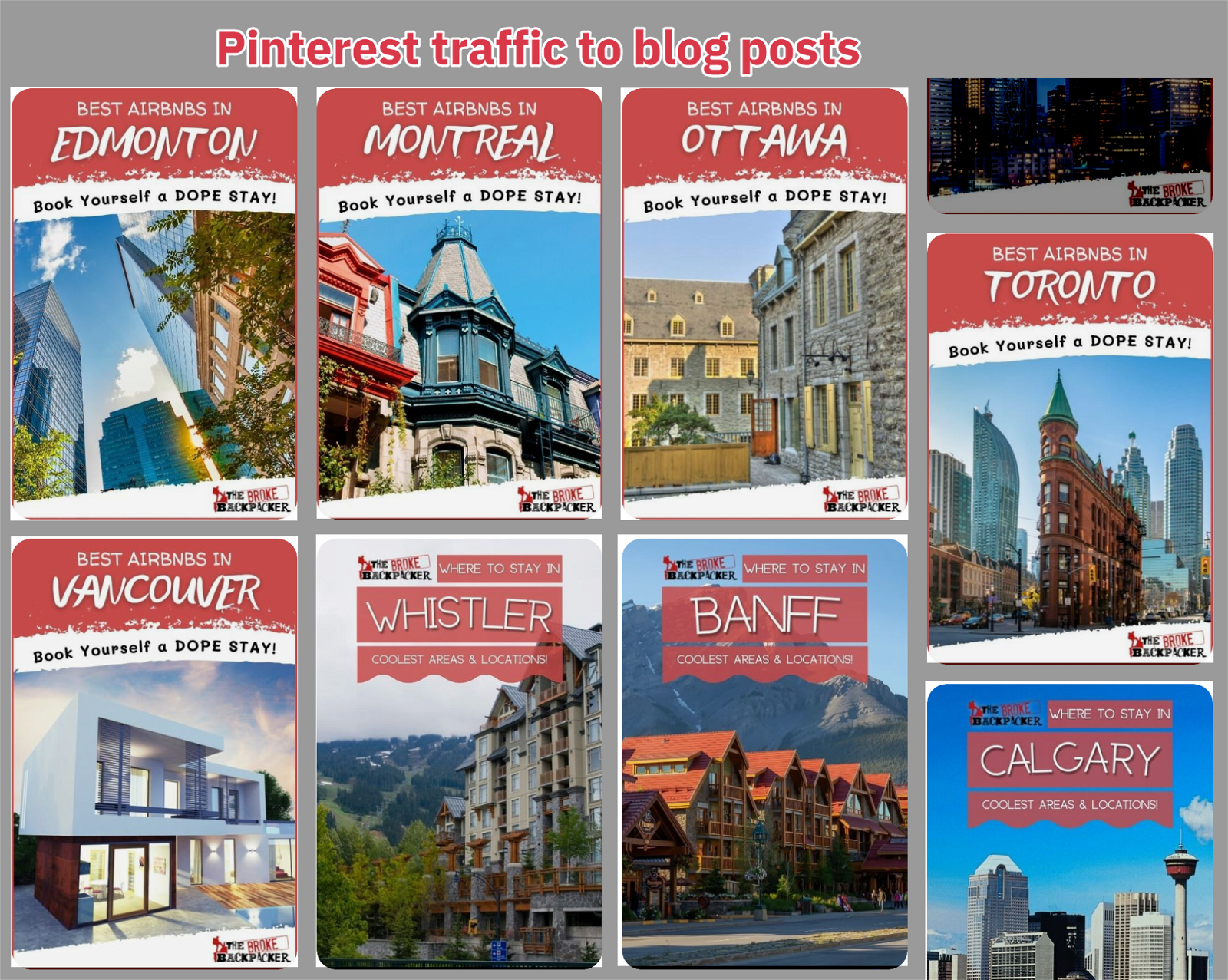
12 View From the Wing

📈 Traffic: 72k monthly visits
💪 DR: 70
⚙️ CMS: WordPress
🎨 Theme: Custom
About
View From the Wing is a travel blog created in 2002 by Gary Leff, known as “the godfather of the frequent flyer hobby.” He offers expert travel advice, credit card tips, analysis of the current state of the travel industry, and deep-dive trip reports.
What View From The Wing Does Well
Gary drives traffic to his blog by sharing new posts with his email list and social media followers.
He posts 4-5 news stories or opinion pieces daily. The mixture includes travel thought pieces, news about the industry, or interesting travel experiences submitted to Gary.
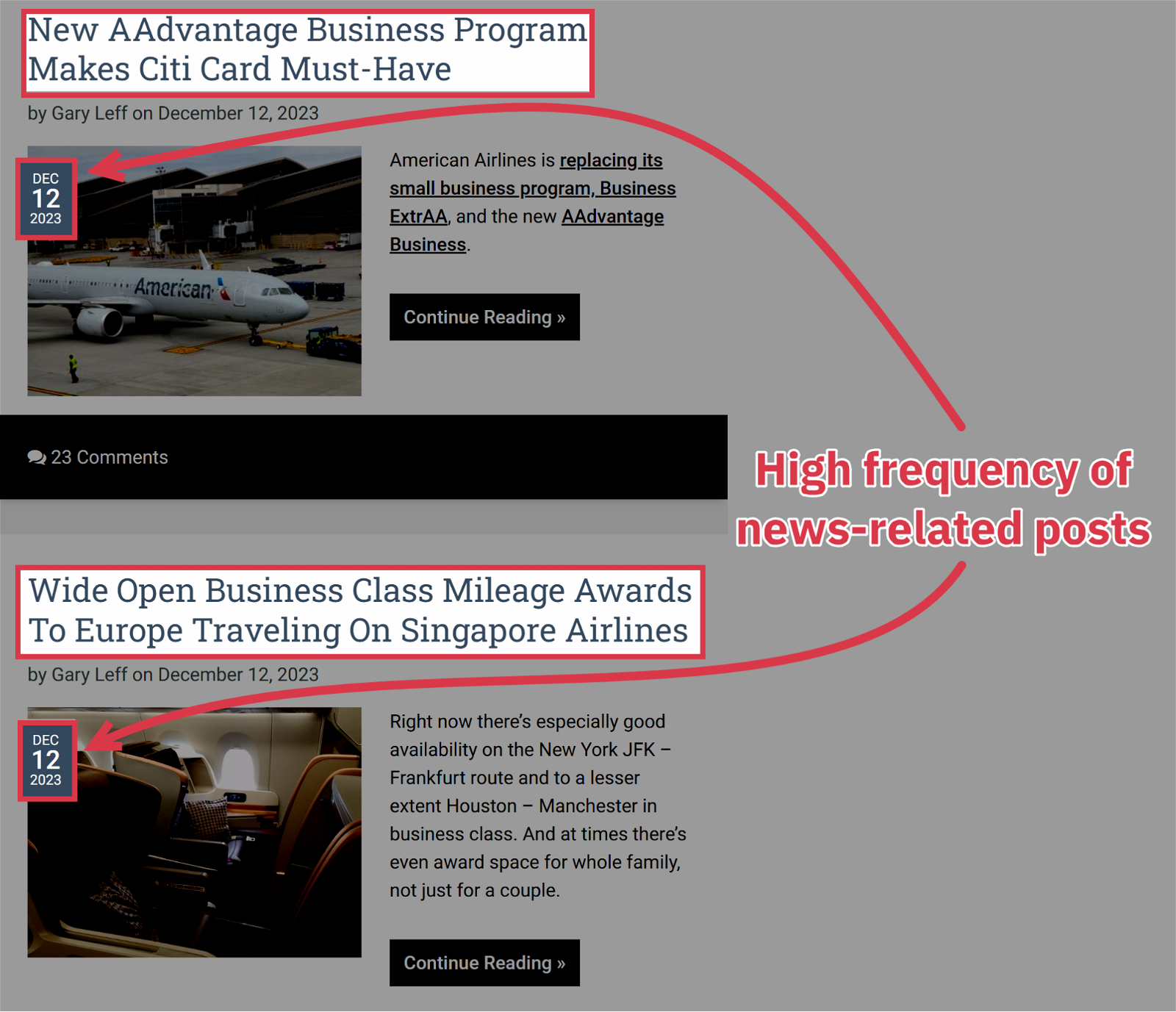
This focus on time-sensitive news content means Gary needs to pump out more content than the typical blogger to drive significant traffic.
However, there’s an upside: driving traffic through email and social media means Gary’s revenue is less affected by volatile Google algorithm updates.
Beyond the Blog
Gary is very active on X (formerly Twitter), where he shares new blog posts with his 39,000+ followers.
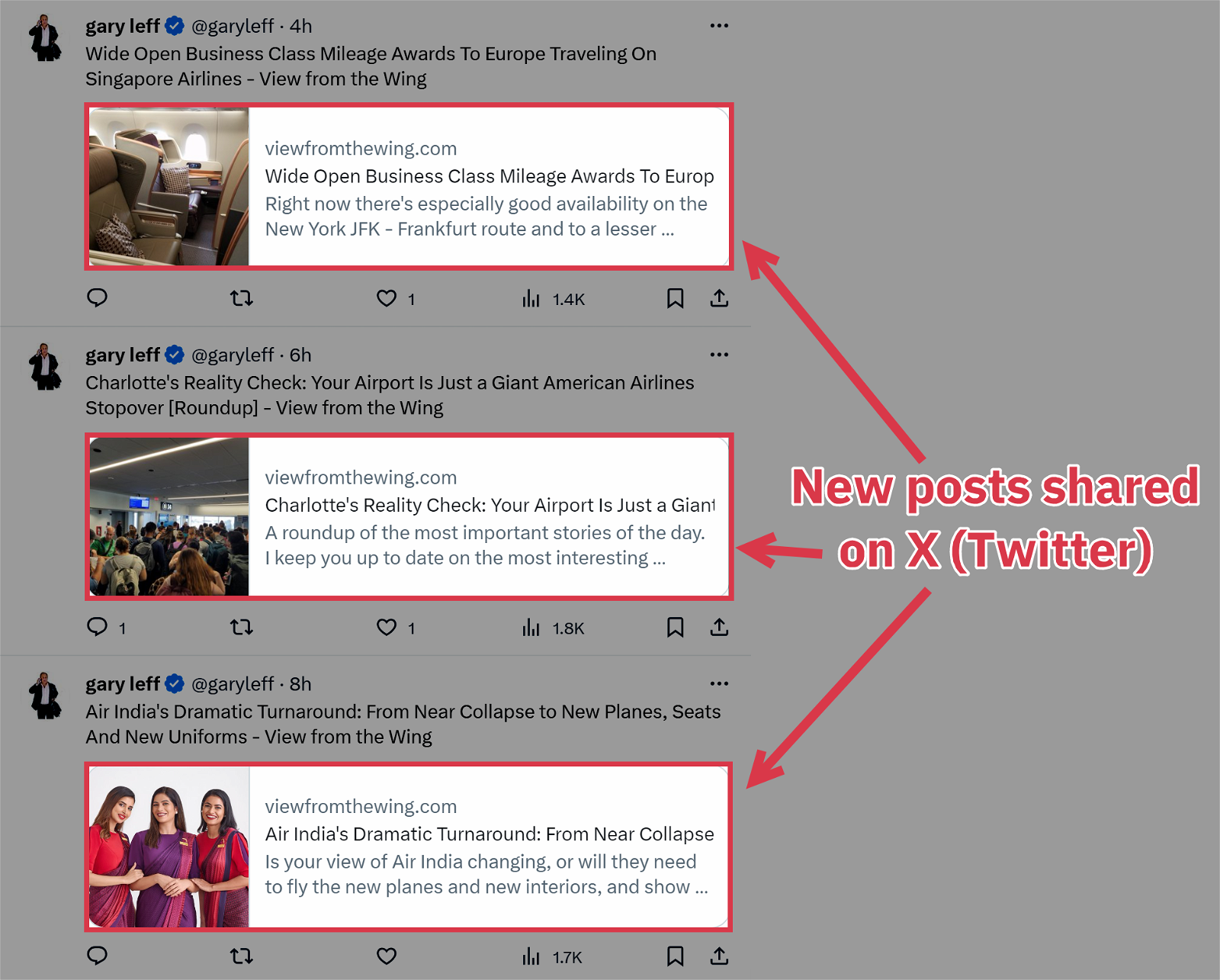
13 Charlotte Plans a Trip
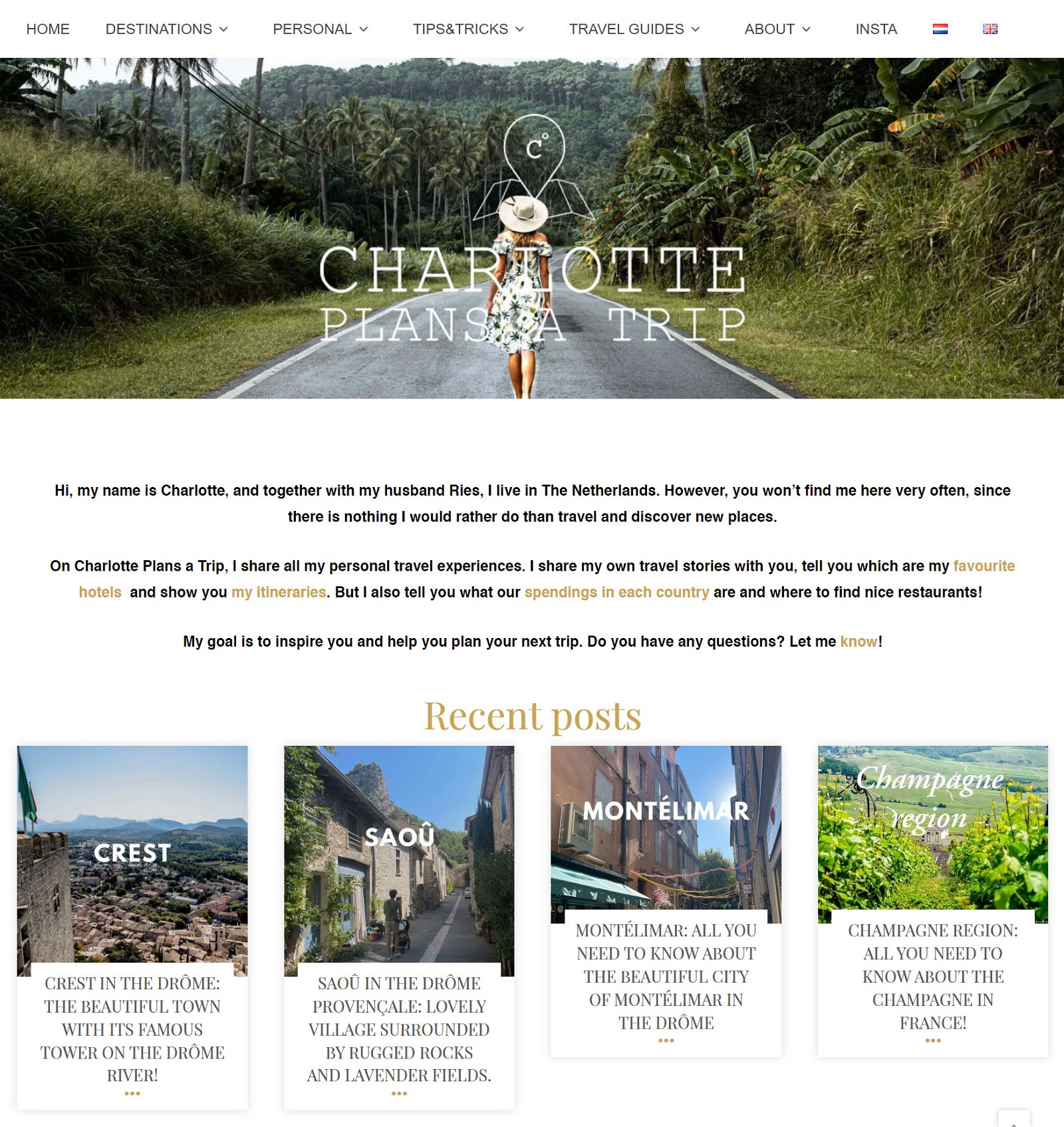
📈 Traffic: 16k monthly visits
💪 DR: 33
⚙️ CMS: WordPress
🎨 Theme: Tempest
About
Charlotte Plans a Trip is a small travel blog run by a Dutch travel blogger named Charlotte, who was inspired to start blogging when her fiancee Ries convinced her to travel journey beyond Amsterdam. Their first big trip was to Canada, and she and Ries have been travel blogging ever since.
What Charlotte Plans A Trip Does Well
Charlotte’s blog is multi-lingual – she offers Dutch and English versions. You can toggle between them on the home page.
She’s essentially created two versions of her website. Her Dutch pages have different URLs than their English counterparts, and Google indexes them as separate pages.
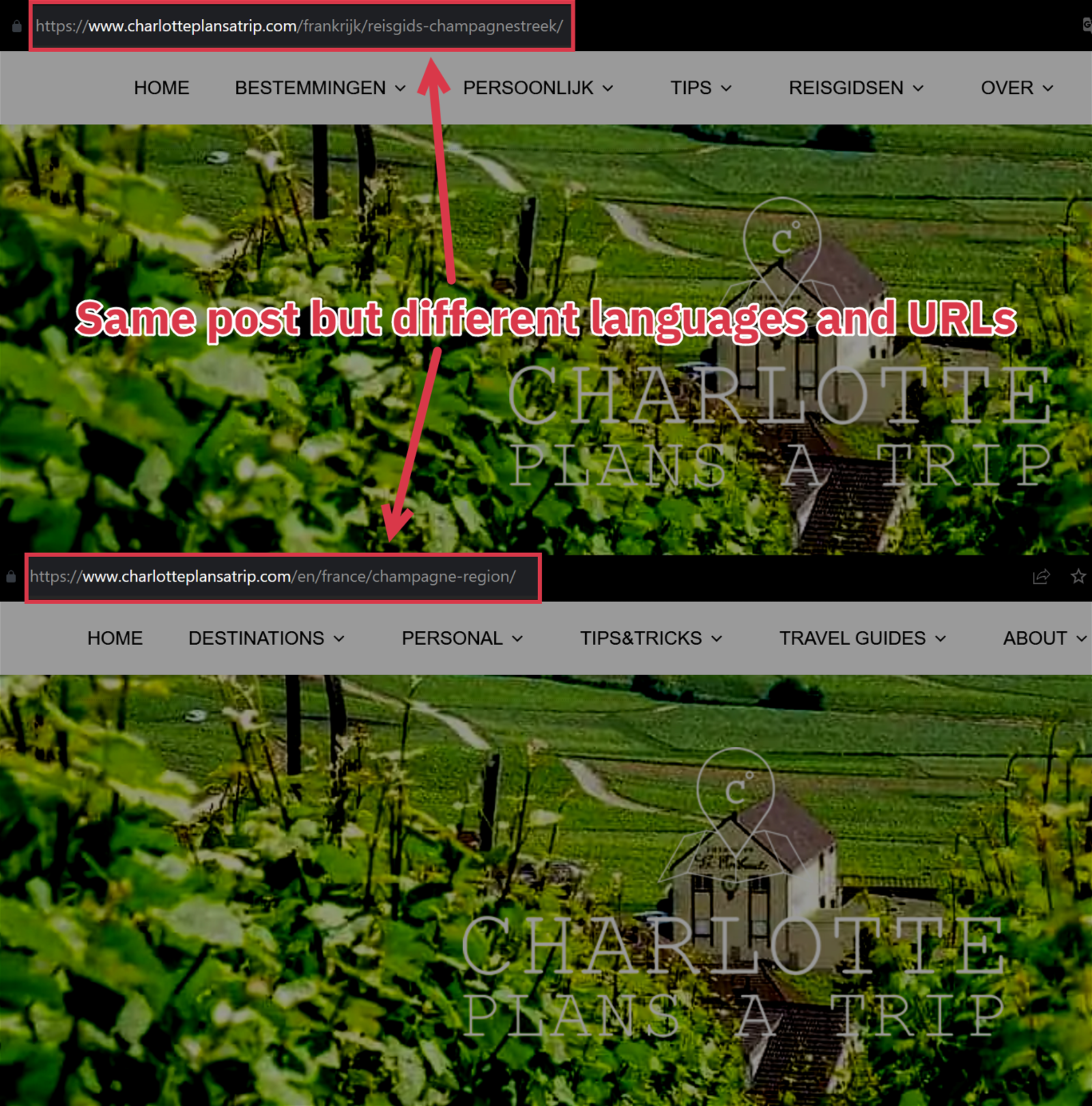
The main benefit of this is a substantial traffic increase. Ahrefs shows that 40% of her traffic comes from Netherlands-based visitors.
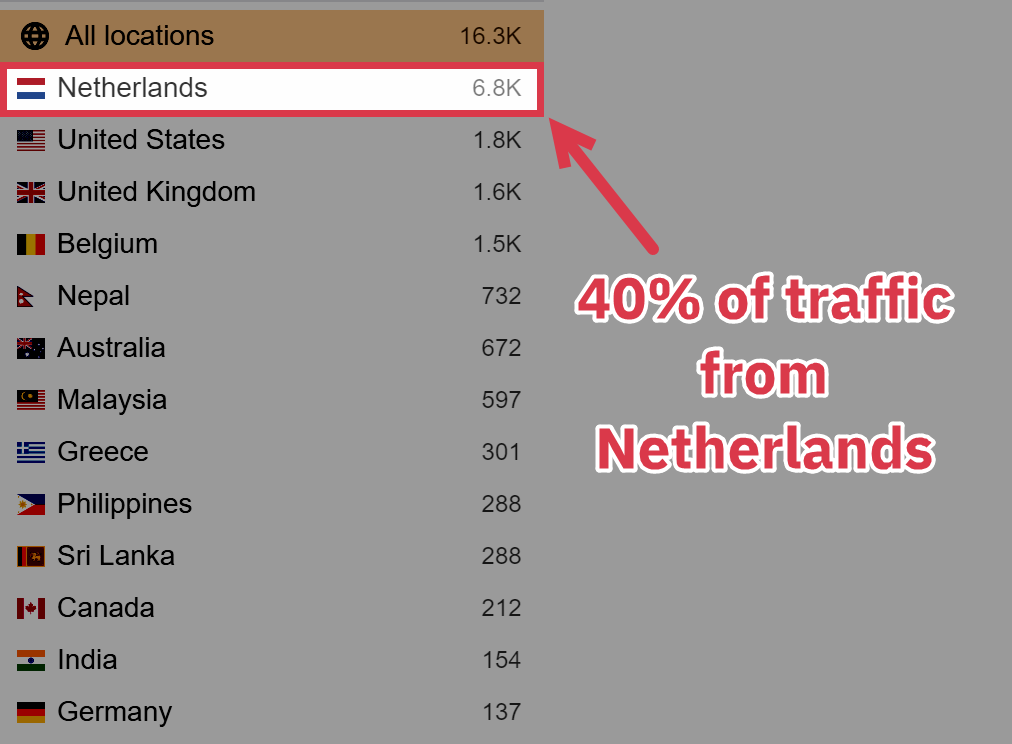
This isn’t an easy trick to multiplying your traffic. Multi-lingual blogs have some downsides you should be aware of.
Native speakers can spot weak translations. Computer translations are getting pretty good, but native speakers will often be able to tell when a translation has been computer-generated. Don’t do this unless you are fluent in the language you’re translating to.
Non-English websites don’t make as much money. The highest-earning market for most blogs is the United States, where most people speak English.
It’s harder to build and maintain an audience. If you have audiences in 2-3 languages, you’ll have a harder time creating content for all of them.
Keywords don’t often translate between languages. Just because English speakers search for something on Google doesn’t mean Spanish speakers are also searching for it.
There’s definitely potential here – just know the limitations you’ll be up against.
If you want to create a multi-lingual blog, I recommend the WordPress Multilingual plugin.
Beyond the Blog
Charlotte has a small following on Instagram, where she shares her life, travels, and latest blog posts.
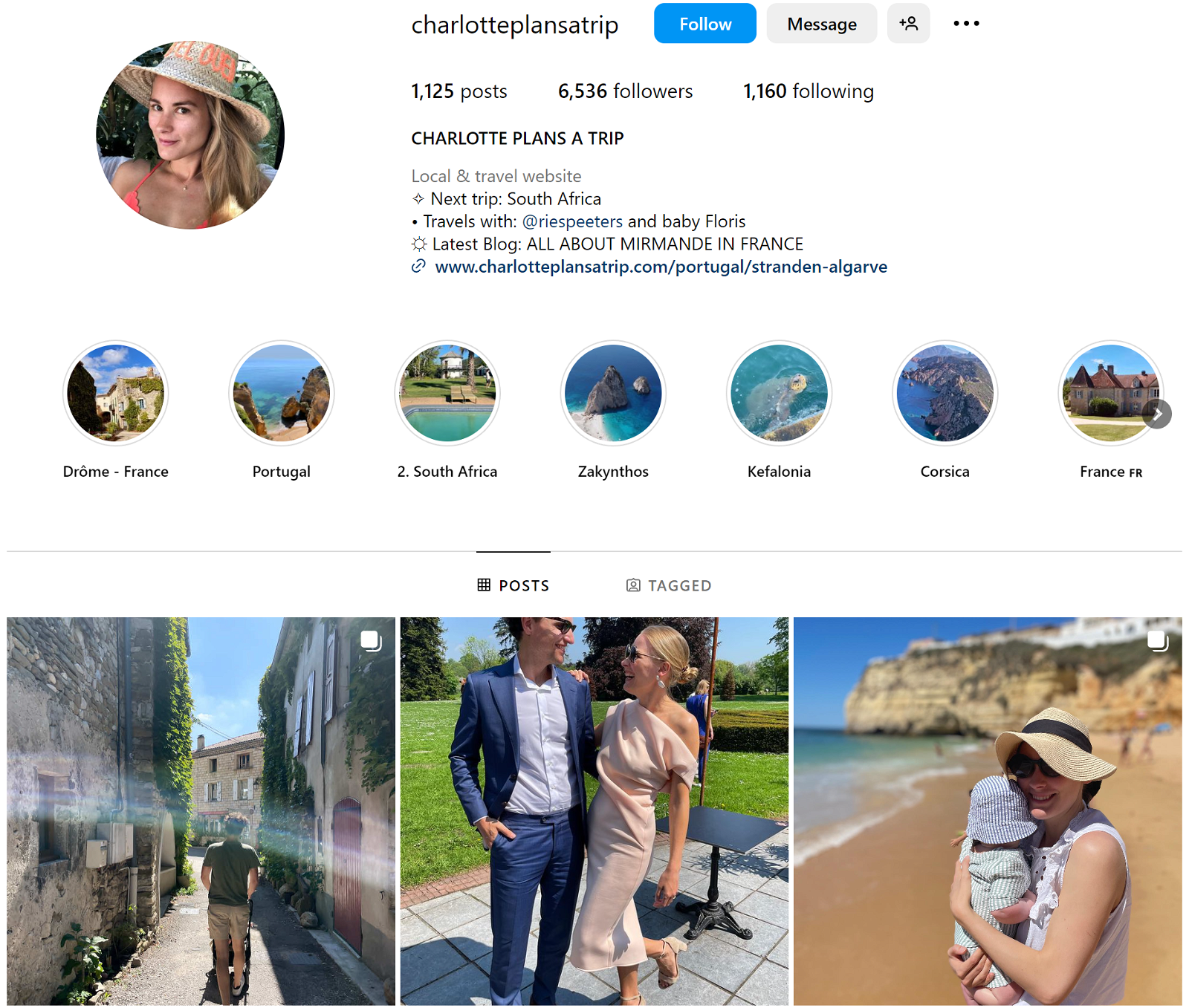
Flights & accommodation affiliate programs: Skyscanner, Booking.com
14 The Barefoot Nomad
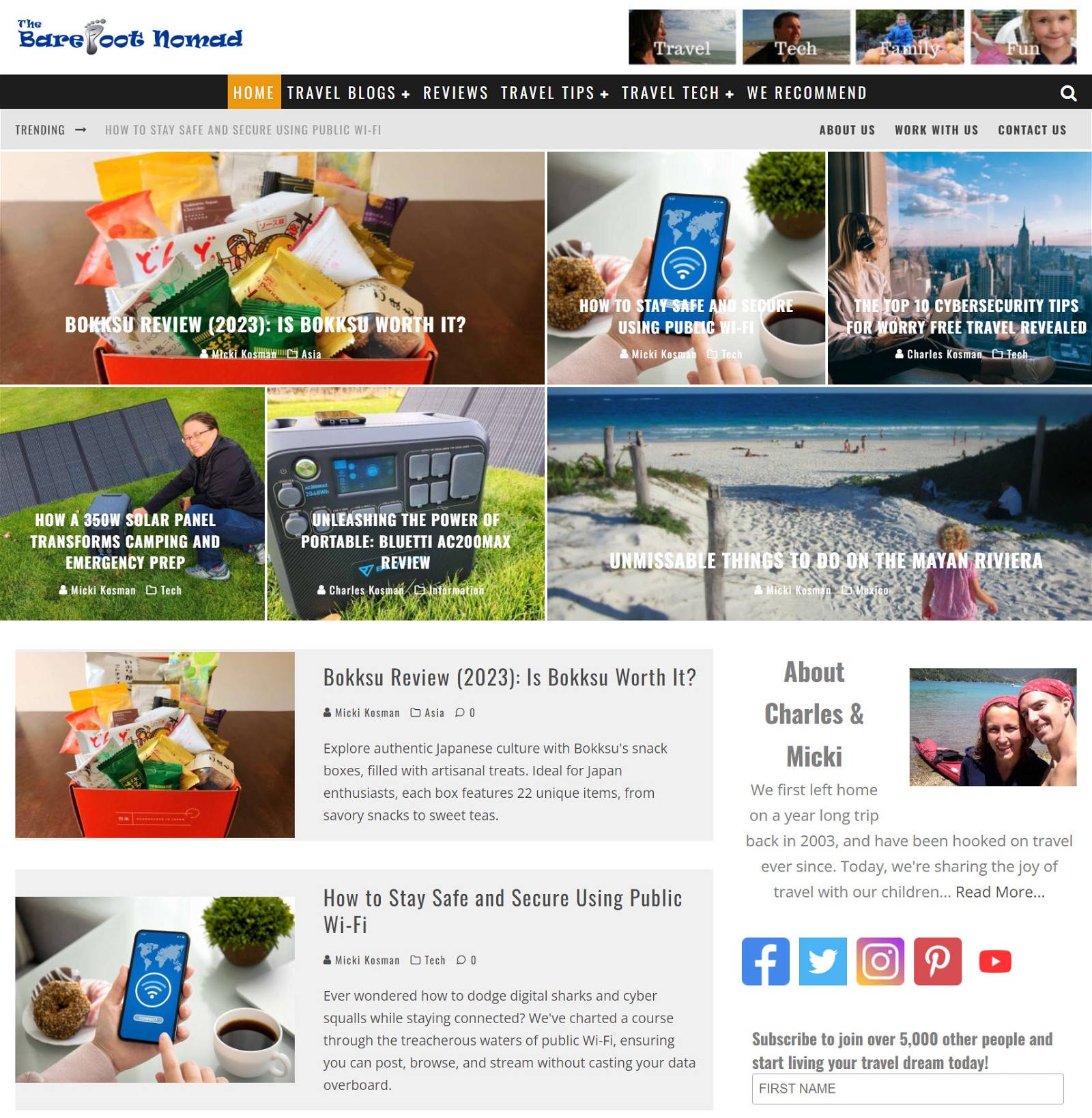
📈 Traffic: 24k monthly visits
💪 DR: 51
⚙️ CMS: WordPress
🎨 Theme: Valenti
About
Launched in 2009 by Charles and Micki Kosman, The Barefoot Nomad is a comprehensive family travel blog.
Initially documenting the couple’s travels in Southeast Asia, the blog evolved to cover global destinations and kid-friendly travel upon their children’s arrival.
What The Barefoot Nomad Does Well
The Barefoot Nomad allows comments on their posts, which has spawned many rich discussions and added beyond the original post content.
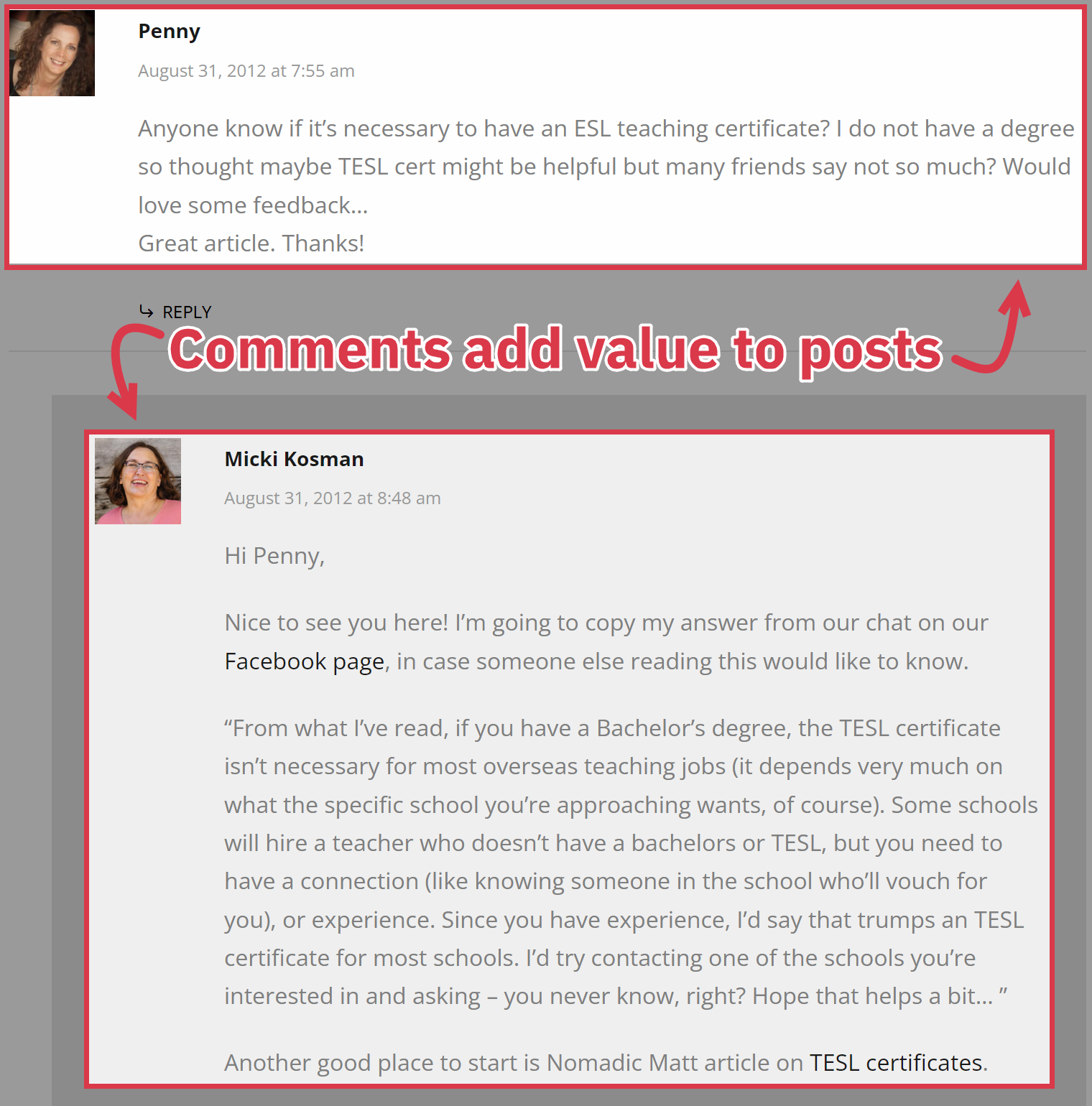
The responses from Micki and Charles aren’t brief “Thanks for reading!” messages either. Their replies are detailed and thoughtful, ensuring the commenter and anyone else who visits the comments gets a helpful answer.
Allowing comments on your blog posts has a few benefits:
Improves search rankings. Google favors user-generated content (UGC) in blog posts, like comments, as it offers diverse viewpoints. This is why UGC-heavy sites like Reddit and Quora perform well in search results.
Fills gaps in your content. If you forget to address an important point in your post, readers may comment about it. You can fill the gap with a thoughtful reply and an update to your post.
Lets you appear involved in your community. Responding to comments shows you’re engaged and willing to take the time to speak directly to audience members.
However, there are some downsides. Most of the comments you get will be spam, and you’ll have to moderate every comment. You’ll also have to spend time replying to comments.
If you want to add comments to your travel blog, consider the wpDiscuz plugin. You should also use the Akismet Anti-spam plugin.
Beyond the Blog
Micki and Charles have an Instagram account, which they use to review and promote travel, tech, and food products.
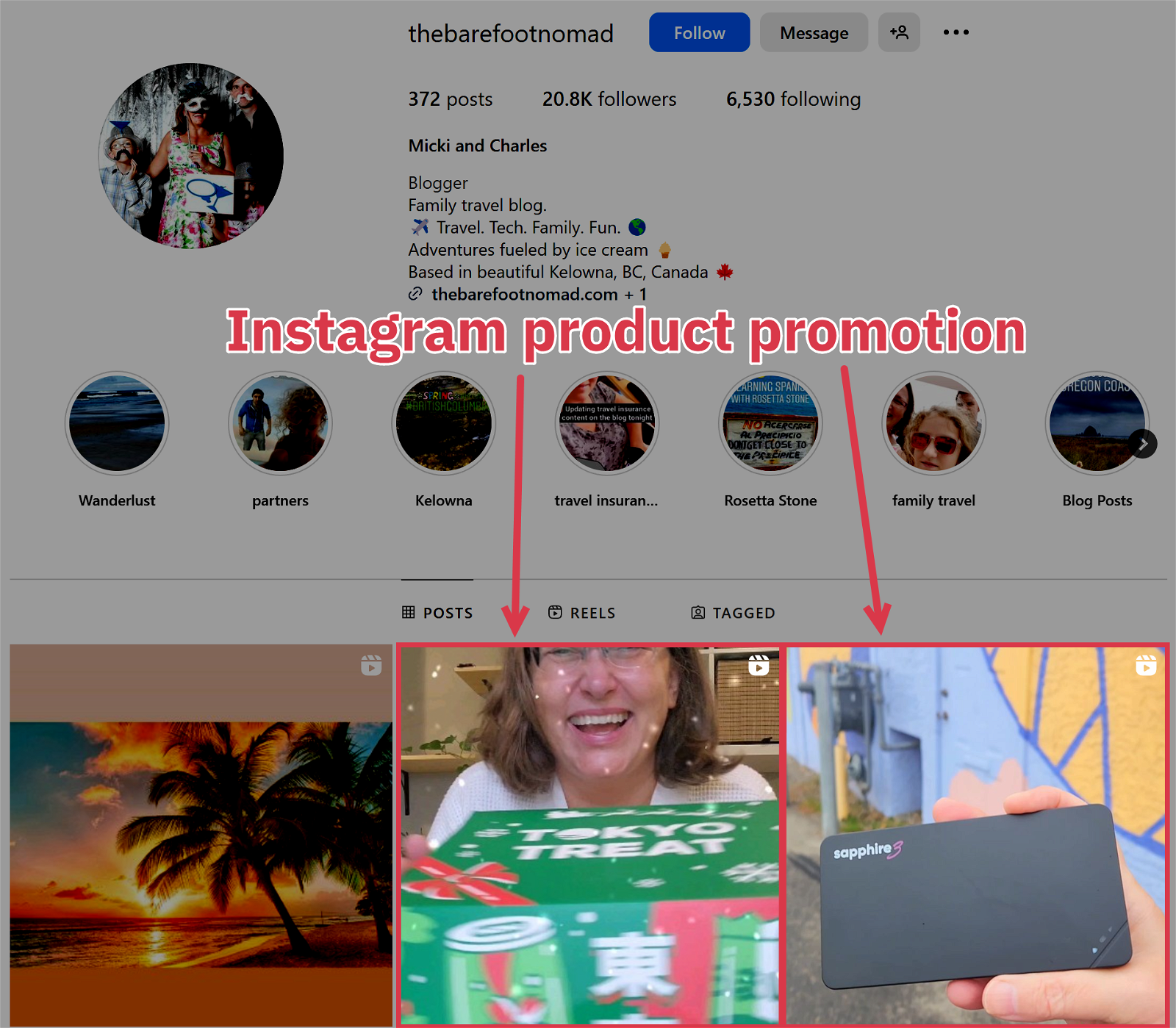
Flights & accommodation affiliate programs: Skyscanner, Booking.com, Expedia
Travel insurance affiliate programs: SafetyWing
15 Nomadic Matt
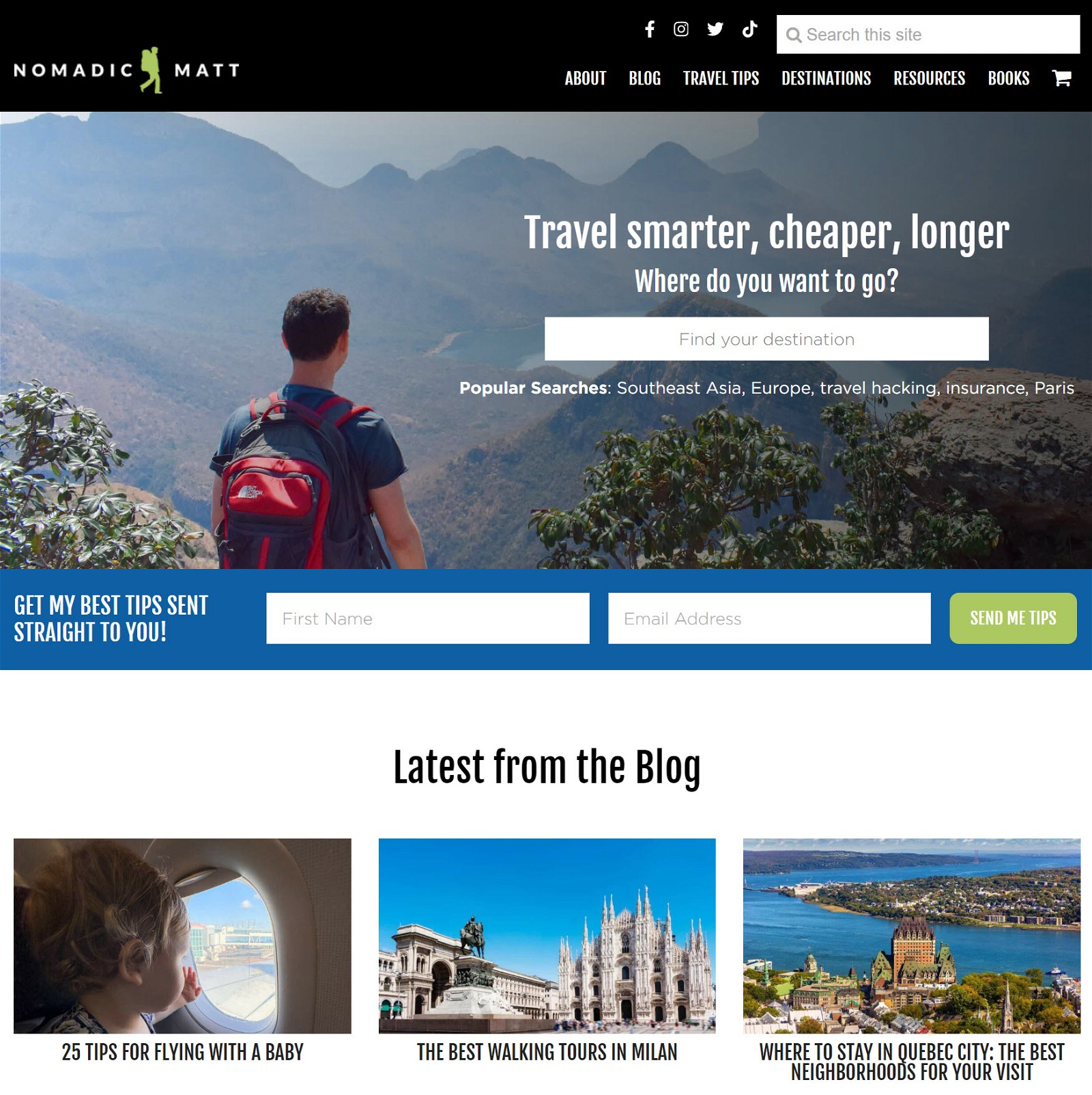
📈 Traffic: 590k monthly visits
💪 DR: 78
⚙️ CMS: WordPress
🎨 Theme: Custom
About
Nomadic Matt is a travel blog that helps people travel on a budget. It was founded in 2008 by Matt Kepnes after a trip to Thailand inspired him to leave his dull cubicle job and explore the world.
He and his team share money-saving travel tips, low-cost destinations, and other practical advice that enables everyone to travel to amazing places.
What Nomadic Matt Does Well
Nomadic Matt has extensive schema markup, which is structured data you can add to a site’s HTML to help search engines better understand the content on the page.
Here’s what the schema on NomadicMatt looks like:
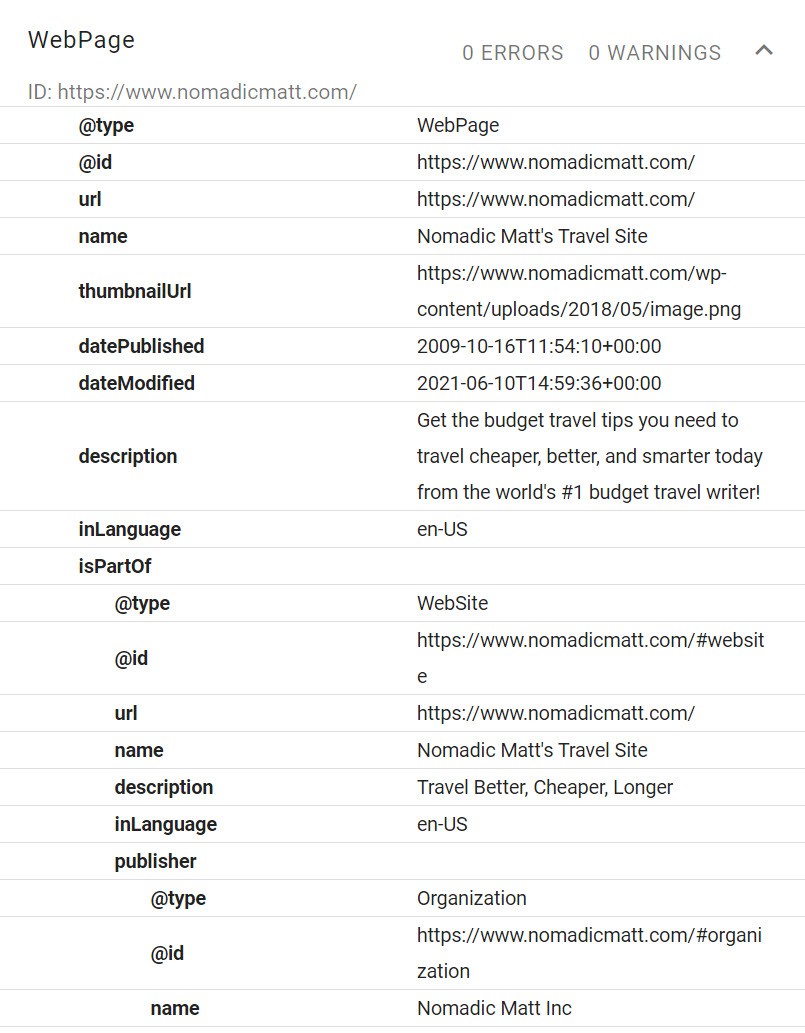
Adding schema to your blog is helpful because it ensures web crawlers – programs that Google and other search engines use to analyze websites – don’t misinterpret your content.
Most blogs contain some basic schema due to their themes or SEO plugins. However, the schema in Matt’s posts goes far beyond what a typical blog includes.
For example, some of the schema types in his blog posts include:
- Author: Shares information about the author of the post
- Organization: Explains who owns the website
- Logo: Shares the website’s logo image
- mainEntityOfPage: Indicates the primary topic of a page
He also ensures that all of the sub-schema markup included in these major schema types are filled out. Some sub-schema types include:
- sameAs: Provides URLs of related or identical entities across the web
- Description: Offers a summary or explanation of the content or entity
- inLanguage: Specifies the language in which the content is written
- primaryImageOfPage: Indicates the main image featured on the page
- wordCount: Specifies the total number of words present in the content of the page
You can use an SEO plugin like RankMath to fill out as many schemas as possible. The easier you make it for Google to understand your page, the better your content will rank.
Beyond the Blog
Matt converts readers to email list subscribers with a newsletter signup box and engages them with frequent emails containing beginner-friendly travel tips.
His welcome email sequence sends out 12 emails in less than a month!
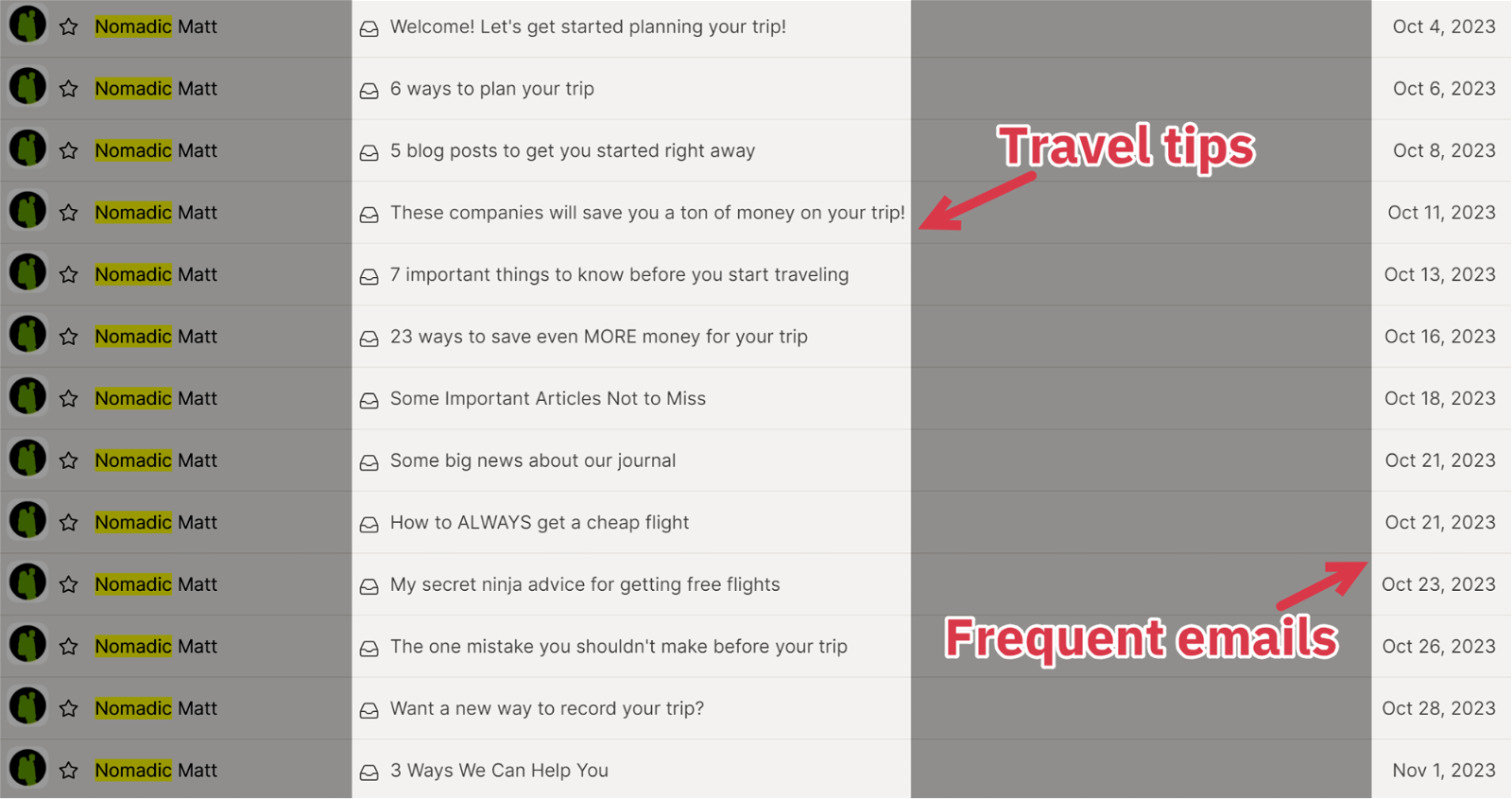
Published book: Ten Years A Nomad
Flights & accommodation affiliate programs: Skyscanner, Booking.com, Going, HostelWorld, Agoda, Trusted House Sitters, Hostel Pass
Travel insurance affiliate programs: SafetyWing, Medjet, InsureMyTrip
Credit card affiliate programs: Card Ratings, Bilt
Activity affiliate programs: Walks, Devour Tours, GetYourGuide, Eatwith
Travel gear affiliate programs: REI, LifeStraw, Patagonia
Transport affiliate programs: RVshare, DiscoverCars.com, Japan Rail Pass
Travel job affiliate programs: Worldpackers, myTEFL
Blogging affiliate programs: HostGator, ConvertKit
What Does A Successful Travel Blog Include?
While there are many ways to build a successful travel blog, our analysis has revealed a few key components that nearly every great blog has.
Leverage personal experience. You need to have personal experience with the destination or topic being covered. It’s obvious when the person writing about a location has never been there, and both readers and search engines will take notice.
Run display ads. Nearly every blog discussed was running display ads, and most were running Mediavine or Raptive. It’s a simple way to add revenue that will have little effect on your other blog monetization methods.
Have a coherent theme. Successful travel blogs typically focus on the travels of 1-2 people or a specific destination. More general sites without a connection to a person or a destination will struggle with branding and SEO.
Make social media accounts. Building an Instagram, YouTube, or Pinterest account in the visual-heavy travel niche adds authenticity and provides a new traffic channel.
Take great pictures. The more impressive your images, the better the impression visitors will have on your site. If they’re really good, you can even sell photography gear and lightroom presets!
Recommend booking services. Every blog on this list recommends at least one booking service. Anyone interested in traveling will need these, and you’re missing out on revenue if you’re not pushing them to your preferred provider. To view the best options, read our list of hotel affiliate programs and airline affiliate programs.
If you do these 5 things, you’re well on your way to building a booming travel blog!
Summing Up
Making a successful travel blog is incredibly lucrative. In fact, our affiliate marketing statistics show that travel is one of the three most profitable niches, with the average person earning $13,847 per month.
However, with great reward comes high competition – especially in the world of blogging.
Here at Authority Hacker, we’ve spent 10+ years helping more than 15,000 students – build their own successful blogs – including many travel blogs.
To help you get an edge on the competition, we’ve distilled our most essential blog-building knowledge into a free training.
In this training, you’ll learn the seven insider secrets that make new blogs 83% more successful.




